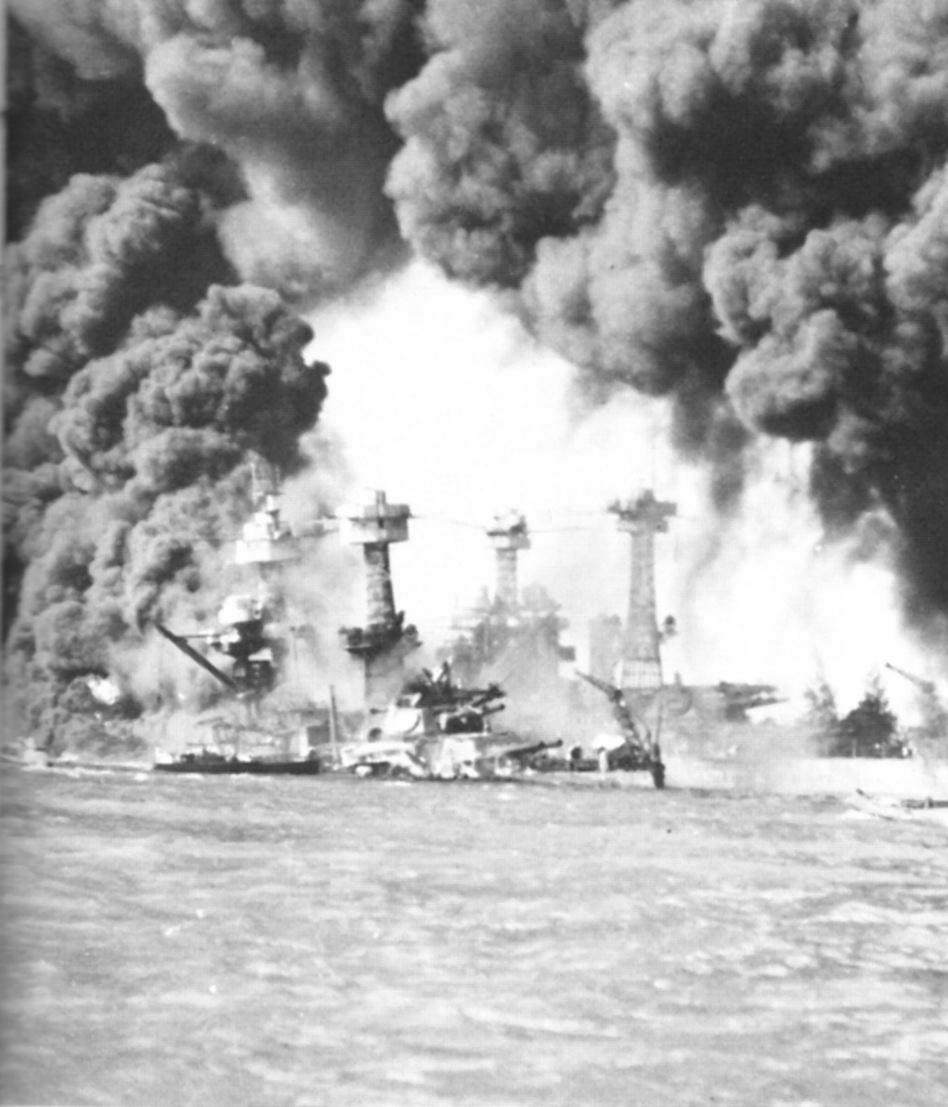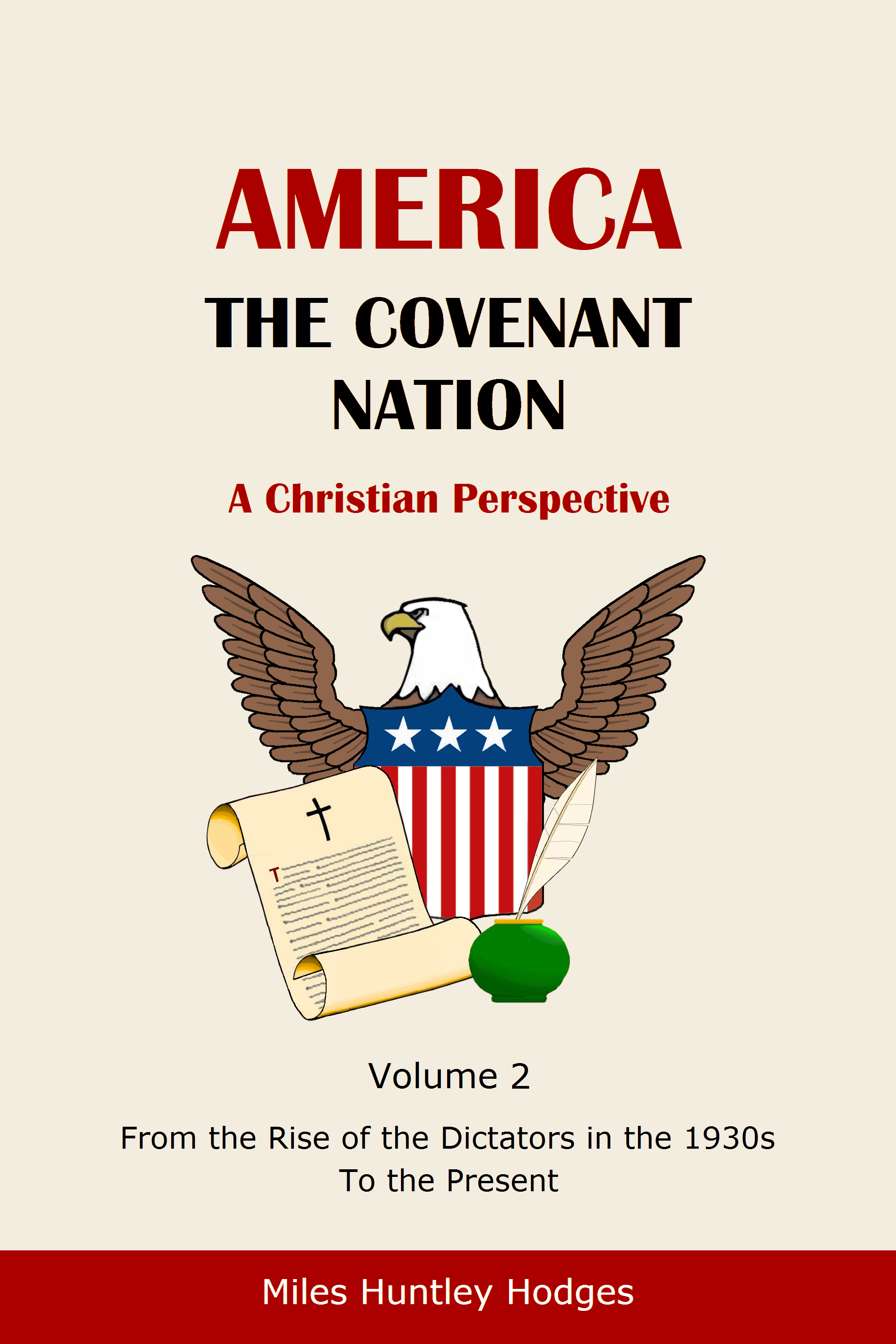
America - The Covenant Nation
A Christian Perspective
Volume 2
To the Present
This section is essentially a summary of the book. For a full text and extensively pictorial version of this same American history, go to my website, spiritualpilgrim.net.
17. The Dictators ... And the Gathering Clouds of War
18. World War Two
19. A Cold War Develops
20. Middle America Comes of Age
21. The Early 1960s: Middle America's Last Hurrah
22. The Later 1960s: The Rise of the Welfare State
23. The 1970s: America Divides Ideologically
24. The Reagan-Bush (Bush Sr.) Era: 1981-1992
25. Clinton – And the Arrival of the Boomer Era
26. "Neo-Conservatism" under Bush Jr.
27. Obama "Changes" America
28. Into the Age of Trump
29. Biden Takes Command
30. The Lessons of History
Excerpt 1. Truman's Own Christian Faith (pages 90-92)
Excerpt 2. The Peace Corps (page 149)
Excerpt 3. The Basic Principles of Political Realism (pages 214-217)
Excerpt 2. Edwards v. Aguillard (1987) (pages 306-307)
Excerpt 2. 9/11 – And the Search for Osama Bin Laden (pages 348-354)
American isolationism during the 1930s
The net result of America's previous effort "to make the world
safe for democracy" was a deep spirit of international isolationism, a
spirit which registered itself in the form of an annual warning (by
actual laws of Congress) forbidding President Roosevelt from getting
involved in any way whatsoever with European developments.
Indeed, the general attitude of Americans
during the 1930s was to stay far, far away from any involvement in what
was happening in Europe. The reaction of most Americans to what
was developing in Stalin's Russia and Hitler's Germany as the 1930s
developed was one of deep distaste. There were, however, on both
the Left and the Right politically, American voices enthusiastic for
the kind of leadership Stalin and Hitler seemed to be providing their
people, seemingly moving their countries ahead – while America remained
stuck in its confusion and pessimism.
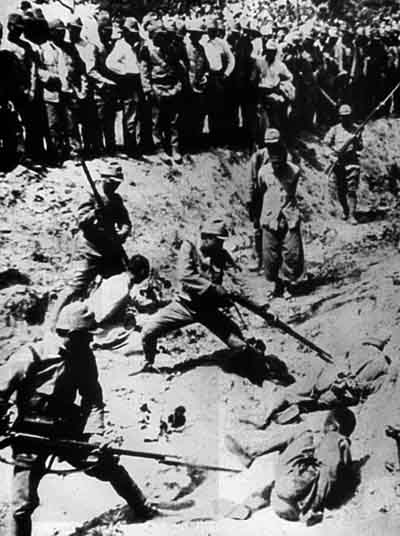 The growing clouds of yet another world war.
In 1937 Japanese troops invaded China ... in order to prove themselves
to be an Asian super-race – in keeping not only with mounting Japanese
nationalist pride, but in joining in spirit with Germany ... to scorn
democracy as a weak and worthless social-cultural principle (China was
striving to be something of a democracy at the time). Then these
Japanese Shinto warriors proceeded to slaughter the Chinese – as they
conquered city after city along China's long coast. Americans
were shocked ... and deeply offended – as Americans had long held
something of a romantic view of things Chinese. But ultimately
the only thing America really could do was to cut off its sale of oil
(America was a major oil exporter at the time) steel, and other
strategic materials to Japan in response to this horrible act of
Japanese aggression.
The growing clouds of yet another world war.
In 1937 Japanese troops invaded China ... in order to prove themselves
to be an Asian super-race – in keeping not only with mounting Japanese
nationalist pride, but in joining in spirit with Germany ... to scorn
democracy as a weak and worthless social-cultural principle (China was
striving to be something of a democracy at the time). Then these
Japanese Shinto warriors proceeded to slaughter the Chinese – as they
conquered city after city along China's long coast. Americans
were shocked ... and deeply offended – as Americans had long held
something of a romantic view of things Chinese. But ultimately
the only thing America really could do was to cut off its sale of oil
(America was a major oil exporter at the time) steel, and other
strategic materials to Japan in response to this horrible act of
Japanese aggression.
At the same time, the world's focus was also on
Europe, Germany in particular – as Hitler began the buildup not only of
Germany's huge industrial capacity, but also the German military, in
total violation of the peace treaties (the Versailles Treaty in
particular) put in place at the end of World War One. Ultimately
the "enforcers" of that treaty, Britain and France did nothing, not
even when in 1936 Hitler also sent his troops into the Rhineland area
to grab that strategic region away from France (the area was supposed
to be under French supervision).
Fear grew that any attempt to block Hitler would
merely break the "peace" that was supposed to prevail. But in
fact, doing nothing only increased Hitler's popularity among the
Germans – and his aggressiveness. In 1938 he marched his troops
into Austria and incorporated that country into his expanding Reich
(Empire). Then later that year he turned his eyes toward another
neighboring country, Czechoslovakia, making British Prime Minister so
uneasy that finally he agreed to meet Hitler in Munich ... and there he
simply agreed to let Hitler take over ethnically German borderlands of
that country – under Hitler's promise that this was all the territory
he wanted from his neighbor. And Chamberlain (and much of the
world) believed that by appeasing Hitler this way, they were saving the
world from another war.
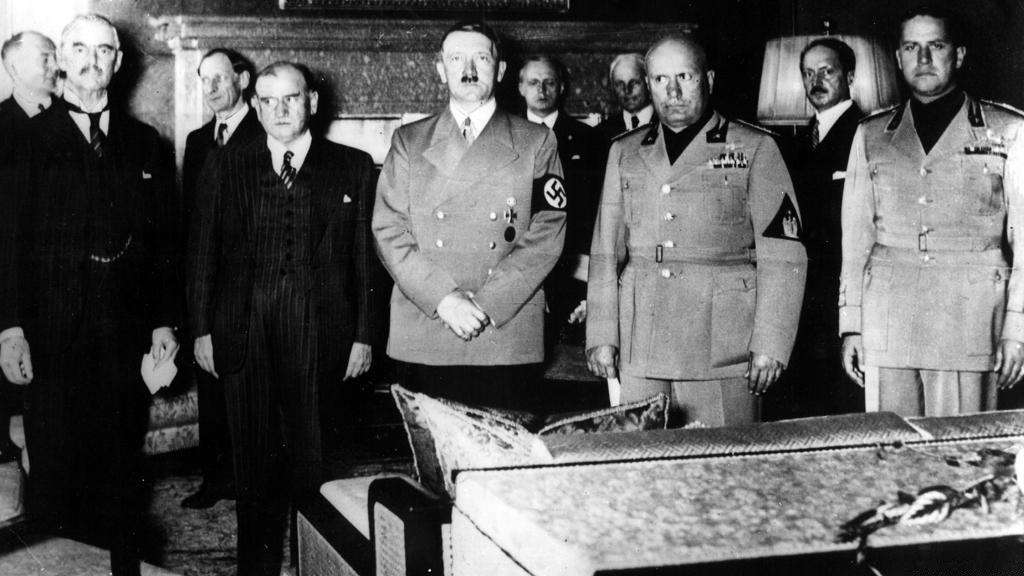
But Again, Hitler read this as a sign of the powerless leadership of his former enemy Britain, and in early 1939 he ignored his promise and simply seized the rest of Czechoslovakia. Chamberlain tried to cover his embarrassment by telling Hitler that if he invaded any other neighbors (a greatly weakened Poland most likely the next victim) it would mean war. But Hitler, who at this point viewed Chamberlain's statement as an empty bluff, signed an agreement with Stalin to divide up Eastern Europe (most importantly Poland) between the two dictators ... and immediately followed up that decision by invading Poland a week later to secure his half of the deal (the beginning of September, 1939).
Chamberlain responded with an immediate declaration of war against
Germany. But then he actually did nothing as Hitler's troops rolled
across Poland in the West ... to soon be joined from the East by
Stalin's Russian Communist troops securing their half of the Polish
deal (however, most wisely for Britain's sake, no declaration of war
against Russia was declared by Chamberlain in response to this equally
evil act of Stalin's).
Here too America looked on in horror ... but
decided to stay out of the matter. That held true even when the
following spring (1940) Hitler (joined by his weaker Italian ally
Mussolini) turned and invaded to the west of Germany ... seizing
Denmark, Norway, France, Belgium, and the Netherlands in a matter of
only a few weeks. Then Hitler turned on lonely Britain ... but was
unable to cross the Channel for an invasion of that country because he
could not secure air cover for his troops, air cover needed vitally for
such an attack (the British air force managed to hold off the German
air force from any kind of victory in the air.)
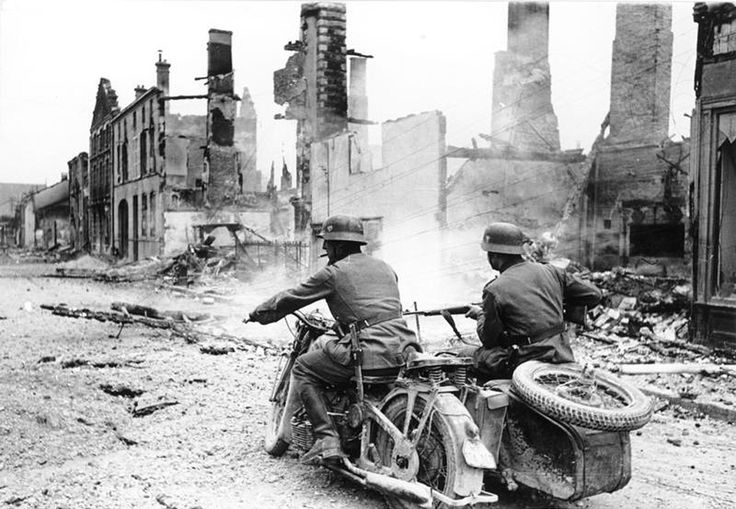
But still ... America did very little – offering only some "mothballed"
(retired) battleships in exchange for British bases abroad – as
Britain, under constant German bombardment, fought for its very life.
Roosevelt wanted America to come to the defense of what was left
of Free Europe. But Congress was still very adamant about staying
out of Europe's business.
Then, making no headway against Britain, Hitler at
the beginning of the next summer (1941) suddenly attacked eastwards
towards Russia. Stalin was completely caught off guard (one devil
mistakenly thought he had a permanent deal with the other devil!).
So now the Russians were fighting against Hitler – rather than
operating in concert with him. But Russia was a very big country
to try to overrun ... and Russian nationalism stirred hot among the
people (the way Stalin's previous efforts to get them to see themselves
first and foremost as "Communists" had not). Hitler thus had
misjudged terribly the character of the Russians.
Meanwhile, again, America did nothing at all –
even as Britain remained the last free country standing in Europe – and
all other European countries seemed to have come under German control
(except Germany's ally, Italy, of course – and Spain, which was
pro-Hitler, but chose to stay out of the war).
Meanwhile, over in Asia, Japan was desperate for oil now that America
had cut off its oil supply to Japan. The closest oil fields were
way to the south of Japan in the Dutch East Indies (modern Indonesia).
Seizing those oil fields from the Dutch (who, back in Europe,
were now under the control of Japan's ally, Germany), and securing the
path to those fields via French-held and British-held land (both also
either under German occupation or German attack) would not be a huge
problem. But the American-held Philippines would be a problem.
So the decision was made by the Japanese to knock out the
American fleet anchored at Pearl Harbor, and the American forces in the
Philippines could then simply be cut off and ultimately overrun.
Anyway, America was viewed as simply another one of those
weak-willed democracies ... one that would come begging for peace terms
once it had been hit hard in the Pacific. And thus on December
7th, 1941, the Japanese attacked the U.S. army-navy installations at
Pearl Harbor. America was finally at war.
The mentally-challenged Hitler saw this Japanese
attack on America as an opportunity for more German glory (things were
not going so well for Hitler since Britain had not been brought to
submission – and Russia was showing signs of most unexpected
resistance)... by "honoring" his Axis Pact alliance with Japan and
immediately declaring war on America.
Thus it was also that America now had a war on
both the Asian front and the European front at the same time. And
America had virtually no army of significant size ... nor most
certainly much of a Pacific fleet (only four aircraft carriers that
were out on a drill and thus not at Pearl Harbor at the time of the
Japanese bombing there). That was not much to go to war with,
against the two most extensive and battle-tested Empires in the world
at that time!
But neither Germany nor Japan understood the
Christian character of America. The Americans would be taking on
the evil empires of Germany and Japan ... with "the help of God" – an
understanding that was made clear to the American people by the
American president himself, Roosevelt. Now this was to go into
battle very well armed!
The battle details are well laid out in Volume 2.
But suffice it to say it was hard going for the American soldiers
heading across North Africa (linking up with the British at Tunisia),
chasing the Germans out of Sicily and then heading on to Southern Italy
... at which point the Italians dropped out of the war. But the
Germans then took over the fight against American and British troops in
Italy. It was very slow going, the Germans well dug into the
mountainous central spine of Italy.
In the Pacific those remaining aircraft carriers
gave excellent account against the Japanese at Midway Island ...
beginning Japan's slow retreat back across the Pacific, Americans
taking island by island as they went (leaving some Japanese stranded on
islands the Americans skipped past.)
Tragically however, with no Pacific fleet at the
time able to reach all the way to the Philippines to resupply the
American troops stationed there, there was nothing that could be done
when American troops (and their Filipino allies) ran out of food and
ammunition. Their surrender was inevitable ... and horrifying.
However ... up from the south (Australia and New
Guinea) the Americans began an unyielding advance northwards against
Japanese emplacements (1942-1944), until finally the Philippines were
fully liberated (early 1945). At the same time, the Americans had
advanced westward across the Pacific into Japanese territory at Iwo
Jima and Okinawa (early-mid 1945). And from there American pilots could
unleash a fiery bombardment of Japan's capital city, Tokyo. But
the Japanese seemed virtually suicidal in their defense of their
homeland.
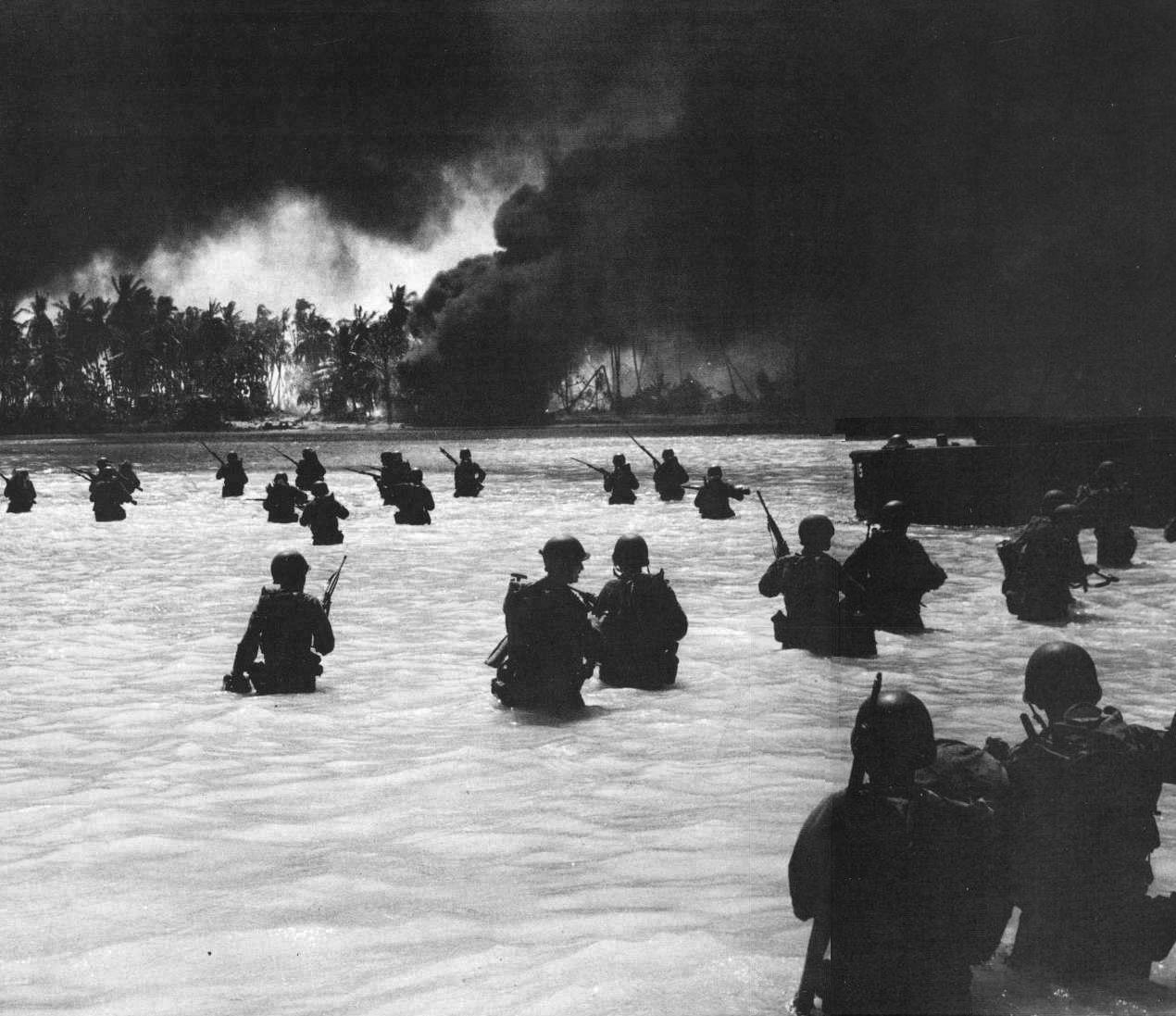
One of the more bizarre events to take place at that time was Gandhi's
decision (August 1942) to use the desperate situation facing Britain
(and its nearly 3 million Indians troops within its ranks) to do
everything he could to make India ungovernable by British authority –
even as the Japanese stood at India's doorway ready to invade.
That was a terrible idea, given the well-known treatment by the
Japanese of the subject people of Asia. But Gandhi's hatred of
things British (years earlier he had tried so hard – and failed – to
fit into the British world as a proper British lawyer) was so intense
that it appeared he would rather have seen Japan ruling India than the
British. Not surprisingly the troublemaker was arrested and taken
off the streets by the British authorities (1942-1944).
Meanwhile the Russians were able to stop the
German advance at Stalingrad ... and then by the summer of 1944 begin
the pushback against the Germans. This was timed with the
invasion of France by America and its allies at Normandy, the
liberation of Paris, the ill-fated attempt to swing north across the
northern Netherlands to invade Germany itself in a hopefully less
well-defended part of that country, the failed German Christmas
counterattack in the Ardennes Forest ("Battle of the Bulge"), and
finally the step-by-step advance into Germany, and the final link-up
with the Russians coming into Germany from the East. Thus by the
beginning of May the Germans surrendered (Hitler dead by suicide).
The war in Europe was over.
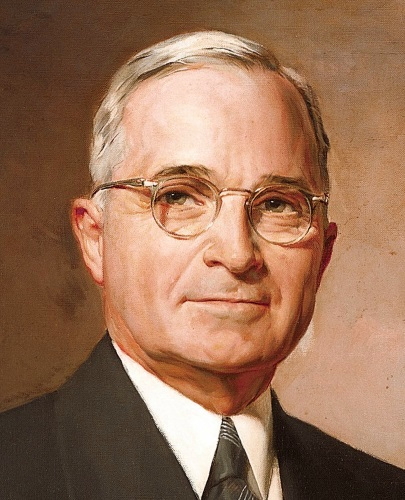 The
war with Japan continued – looking as if the war might drag on for a
couple of more years, since the Japanese seemed prepared to defend
every village by every remaining man, woman and child. Thus with
the successful testing of the world's first atomic bomb in July (1945),
the new president, Harry Truman (the exhausted Roosevelt had died
unexpectedly in April)
The
war with Japan continued – looking as if the war might drag on for a
couple of more years, since the Japanese seemed prepared to defend
every village by every remaining man, woman and child. Thus with
the successful testing of the world's first atomic bomb in July (1945),
the new president, Harry Truman (the exhausted Roosevelt had died
unexpectedly in April)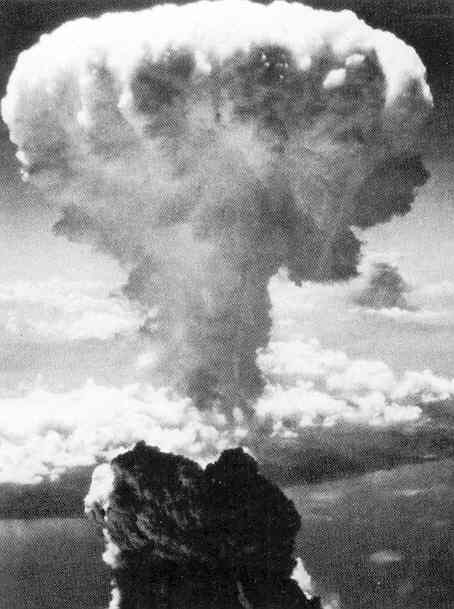 was quick to make the decision to use the (two) bombs in America's
possession, to shake the Japanese out of their conviction that they
could find any glory in fighting to the finish. It was a huge
gamble, moving the world into this whole new realm of atomic warfare,
but Truman did not hesitate. In early August those bombs were
unleashed on Hiroshima and Nagasaki ... and the Japanese finally threw
in the towel.
Japanese authorities met with Americans on September 2nd on the battleship Missouri to sign the terms of surrender. The war in Asia was also now over.
was quick to make the decision to use the (two) bombs in America's
possession, to shake the Japanese out of their conviction that they
could find any glory in fighting to the finish. It was a huge
gamble, moving the world into this whole new realm of atomic warfare,
but Truman did not hesitate. In early August those bombs were
unleashed on Hiroshima and Nagasaki ... and the Japanese finally threw
in the towel.
Japanese authorities met with Americans on September 2nd on the battleship Missouri to sign the terms of surrender. The war in Asia was also now over.
With both Germany and Japan out of the way, suddenly the political
interests of all the players shifted deeply. For Americans there
was only one interest that they all had at this point ... and that was
to "get the boys home." Britain was in a similar mood, not only
to get their boys back, but to pull back completely from the imperial
world and its responsibilities. That's why in national elections
in July (while the war in Asia was still underway) the British chose to
dump Churchill, who had led them through the darkest days of the Battle
of Britain, and bring in Clement Attlee, a "Labourite" (Socialist) who
promised the British that his government would "take care of the
people" (and quickly drain the government's resources, driving the
British economy downward in the process ... as such programs always
do). In short, Britain surrendered entirely its position as a
"great power." And France, after its humiliating performance
during the war, found itself in much the same mood and situation.
That left just America and Russia facing each other.
An attempt had been made by Roosevelt to lock
Stalin's Russia into an ongoing, post-war alliance in service to the
larger world. A new United Nations was assembled, with the
presumption by Roosevelt that the "Big Five" of America, Russia,
Britain, France and China would continue to work closely together to
keep the world at peace. But political reality had other plans
for the world. Stalin was in no hurry at war's end to pull his
troops out of the eastern half of Europe – including the Eastern
portion of Germany and its capital Berlin. He understood
clearly the shift in the power picture. With the Americans,
British, and French in a hurry to demobilize, that left him in a
commanding position, potentially able to dominate the whole of Europe.
Likewise Stalin found himself sitting nicely in
Asia, huge amounts of Asian territory awarded him for promising to join
America in its (expected long-term) war with Japan. This reward
would include the Japanese-occupied lands of Sakhalin, Korea (the
northern half anyway) and Manchuria (northern China). When the
atomic bombs went off in August, Stalin was quick to declare war on
Japan – in order to activate his claim to the territories Roosevelt had
promised him. Not a bad reward for one week's worth of military
action! Actually Stalin would turn Manchuria over to China when
Communist leader Mao took control of China ... some kind of sign of
friendship between Communist overlords (Russia would later regret
Stalin's generosity). As for North Korea ... that piece of
territory he would try to hang onto because of its strategic position
on the ice-free waters flowing into the Pacific Ocean.
At first, the Communist Parties in Western Europe
formed a big part of the "United Front" governments that were set up
with the war's end. And at first it looked like cooperation would
hold. But the economies of Europe soon began to sink rapidly
(around 1947) when these governments used up the last of their
financial reserves to rebuild the destroyed economies of Europe.
Indeed, unemployed veterans soon took to the streets to protest
the falling off of government support – which the Communist Parties
(especially big in Italy and France) used to try to spark "working
class revolution."
Truman knew he could do nothing about the fact
that promised elections in the Soviet Russian zone of control were a
joke, with Stalinist candidates coming to take over each of these East
European countries. But he could do something about Stalin's
manipulation of events in Western Europe ... and got Congress to agree
to give Europe $billions in order to rebuild the destroyed
infrastructures of the "Free World" (non-Soviet controlled portion of
Europe). Thus the "Marshall Plan" helped West Europe get back on
its feet economically ... and head off any Communist political mischief
designed to bring those countries under Soviet domination.
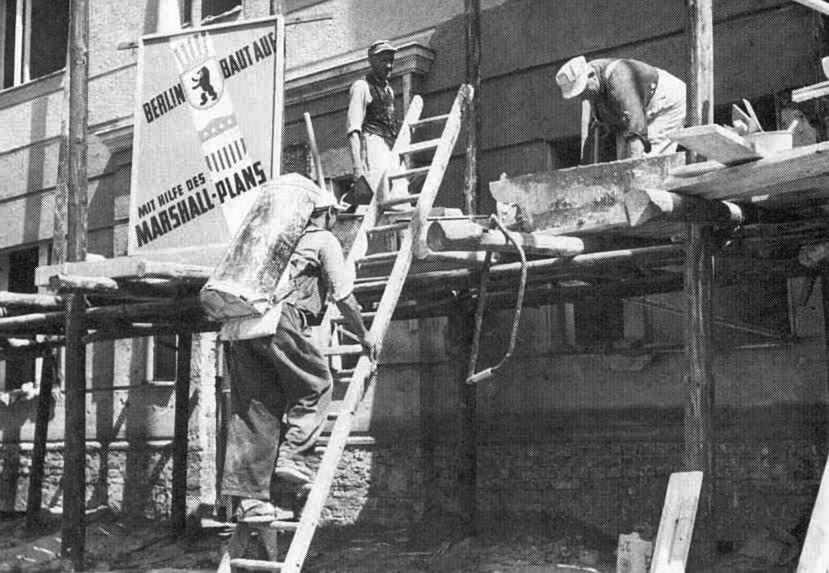
At first, Truman was working faster than the average American's understanding of the political dynamics going on in the larger world. But when in early 1948 Stalin's communists took total control in Czechoslovakia and then in mid-1948 tried to squeeze America (and Britain and France) out of Berlin, the Americans awakened ... and swung strongly behind their president to help where they could. Nothing could be done about Czechoslovakia. But Berlin could be saved ... and was by Truman's swift and unyielding actions. And then to make sure that Stalin understood what he was up against, in 1949 America joined with its European friends in its first peace-time military alliance, the North Atlantic Treaty and its organization, NATO.
Then when in 1950, Stalin-backed North Korea invaded South Korea,
Truman was quick to respond in sending troops to Korea to prevent the
country from falling totally under Communism. Thus the Korean War
(1950-1953) got underway. Back and forth the battle raged in
Korea ... until China got involved by sending "volunteer" troops into
Korea in massive numbers, to fend off America and its "United Nations"
troops. Soon the battle stalemated ... at a position close to
where the North-South division had originally been laid out (that same
line of division exists to this day). In 1953 an "Armistice" was
finally signed ... not exactly a peace agreement, but at least an
agreement to stop the fighting.
In the meantime disturbing news of the same order
right here at home in America was coming out ... namely, that a number
of individuals placed high up in Washington political circles – and
also in the world of the intellectuals (scientists, professors, and
authors) and Hollywood (the movie industry very important to America at
the time) – were found to be Communist or at least Communist
sympathizers. Then when in the 1950s Senator Joe McCarthy took up
the cause of ferreting out Communists in high places (he himself seeing
Communists everywhere), the American nation began to freak out!
McCarthy was playing on the passions of the American masses, who
at this point were seeing the totalitarian (fully authoritarian)
involvement of "Big Brother" everywhere in their world.
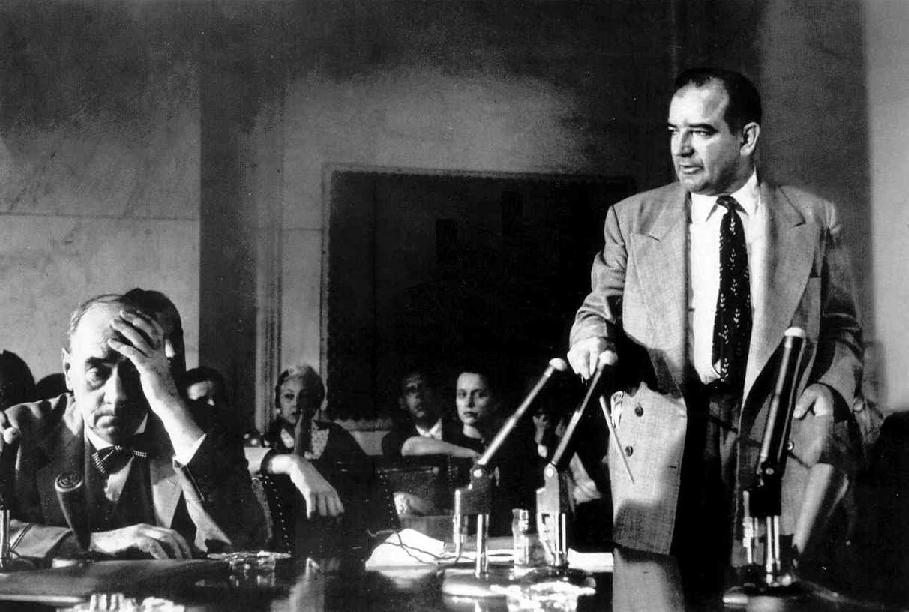
Yet ... for the Americans who had spent the recent past as soldiers, or
just as patriots on the "home front," fighting the war against the
Fascist or totalitarian dictator Hitler (and Japanese leader Tojo) –
and now in the post-war period the threatening totalitarianism of
Stalin – there was little danger of them being seduced any time soon
into the world of Communism.
They were in fact strong Christians, made ever
stronger in their faith by the rigors of the life-threatening battle
they had just been through. Indeed, this post-war or "Cold War"
world of America was intensely Christian, with almost all Americans to
be found in church on a typical Sunday – and celebrating the Christian
life in its special holidays throughout the year ... some of those of
the typically "rational" world of American intellectualism excepted of
course (as had long been the case in America, even since its earliest
years). They were, indeed, a nation under God." They even
had that wording added to their national Pledge of Allegiance.
And of course they were highly patriotic, having
so recently put their lives on the line for their country.
Further, by 1953 they had as president former general Dwight
Eisenhower, who represented all the virtues of "Middle America," a
people or nation ready to defend the freedoms of the people of the
world against spreading Communism.
And giving clear evidence of the correctness of
that social-cultural position, clearly (to the Americans anyway,
although many others probably agreed with this assessment) God himself
had made America the richest, strongest and freest country of the
world. Capitalism, Constitutionalism, and Christianity made
America the savior of the "Free World" in the global battle against
Communism – and against any other form of totalitarianism (although
"Communism" pretty much summed up the world of totalitarianism in the
American mind at the time).
Yes ... but what about the next generation of
Americans, the "Boomers" – named for the "Baby Boom" that hit America
when the boys came home ... and after the long war-time delay, were
finally able to get married and start a family. This dynamic had
produced a dramatic population explosion of post-war babies, thus the
"baby boom"!
This rising generation of Boomers, however, will
not have not faced or even seen the dangers of life that their parents
had. Thus they will lack the acquired wisdom of their World War
Two "Veteran" parents (thus the term "Vet" used in this volume to
designate that post-war adult generation).
At the same time, the Vets had seen how easily the
youth of Germany and Russia had been "brainwashed" by the
totalitarianism of Hitler and Stalin. Consequently, they were
determined that such totalitarian brainwashing would never happen to
their Boomer children. And so as their children began to grow up
in the 1950s and early 1960s, they taught their children to "think for
yourself," ... accept nothing on the basis of someone else's authority.
In fact, take on life heroically by challenging all forms of
social authority that they might encounter in life's journey.
This way their children would develop naturally, instinctively –
just as they had ... free of the possible influence of totalitarianism.
Of course the Vets seem to have no idea that their
own strong social instincts were in fact not at all natural or
"instinctive" to them (or anyone else), but instead the byproduct of a
lot of social engineering, in their case necessitated by the social
challenges of the Depression and World War they had grown up with.
There was nothing "natural" or "inevitable" about the social
values that these Vets, as a deeply tested generation, held as True and
Necessary.
Tragically, the Vets seemed to understand none of
this ... and made the horrible mistake of assuming that their children
would grow up holding the same strong social ideals that they did – if
they just stood back and let their Boomer offspring shape their social
personalities "instinctively" ... on their own, by themselves.
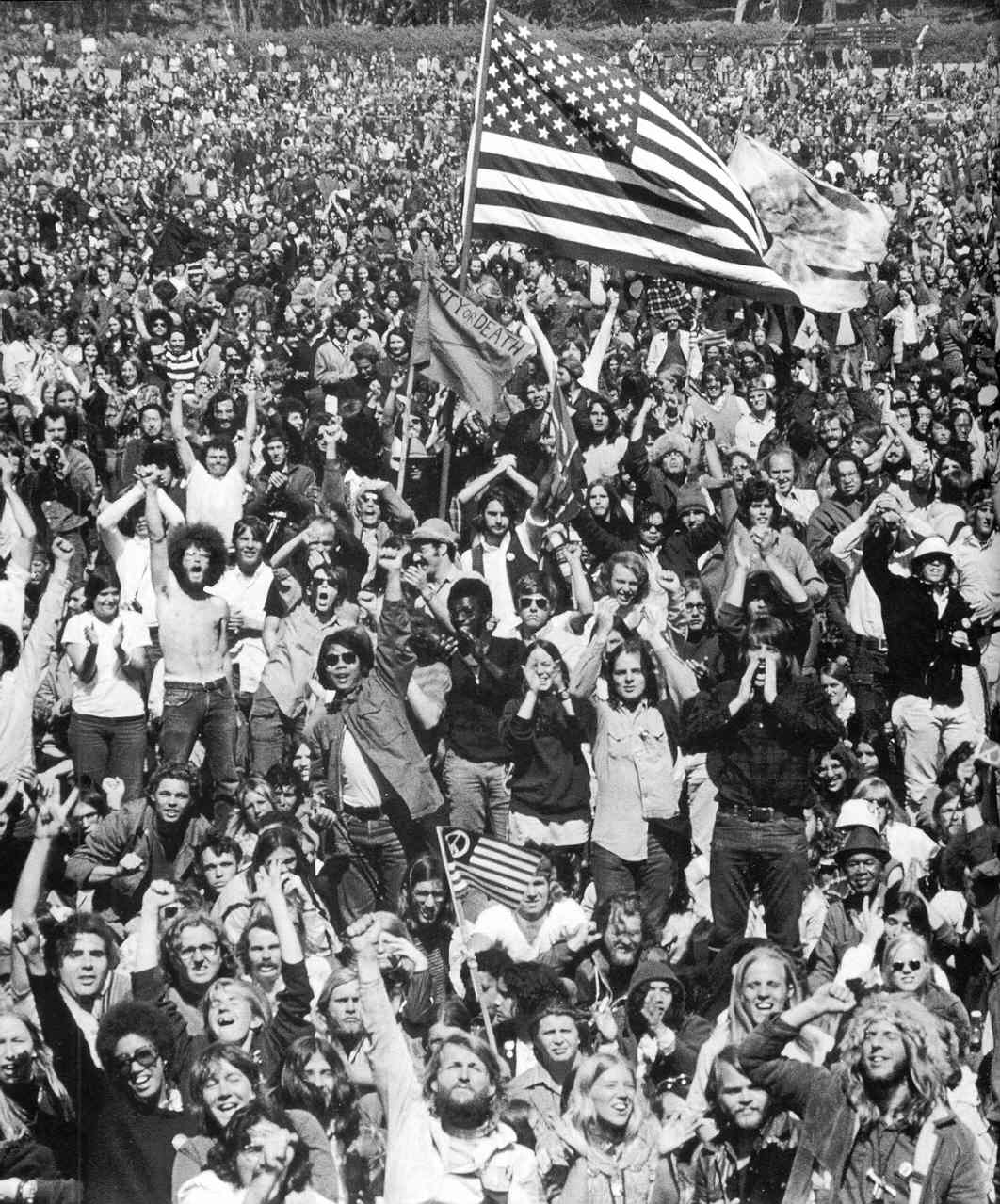 Thus they went on to teach their Boomers to challenge all things
presented to them as the voice of authority – not realizing that
authority itself is the source of all social cohesion, especially the
kind that is unseen because it is so deeply integrated into the
"rational" processes of a people. So it was that the Vets, in
freeing their children from the hand of social authority in their
lives, had just created a generation of social monsters. These
Boomers would soon enough (starting with the mid-1960s when the first
of the Boomers finally reached adulthood) prove themselves to be
unable, in the face of life's challenges, to maintain loyally, and
certainly sacrificially (as their Vet parents had), the social
commitments necessary for society's survival and success, commitments
such as jobs, marriages ... and just social loyalties in general.
Thus they went on to teach their Boomers to challenge all things
presented to them as the voice of authority – not realizing that
authority itself is the source of all social cohesion, especially the
kind that is unseen because it is so deeply integrated into the
"rational" processes of a people. So it was that the Vets, in
freeing their children from the hand of social authority in their
lives, had just created a generation of social monsters. These
Boomers would soon enough (starting with the mid-1960s when the first
of the Boomers finally reached adulthood) prove themselves to be
unable, in the face of life's challenges, to maintain loyally, and
certainly sacrificially (as their Vet parents had), the social
commitments necessary for society's survival and success, commitments
such as jobs, marriages ... and just social loyalties in general.
In fact, "shaming" the America that the Vets loved
with such a passion, would itself become the heroic duty of these same
Boomers when they reached adulthood. Boomers would see the love of
country as a sign that totalitarianism had taken over a person's
thinking. Patriotism was akin to Fascism! In fact the word
"Fascist" would come to be applied again and again to the thinking and
ways of the Boomers' own deeply patriotic Vet parents. Wow! ...
the Vets never saw that coming their way!
But overall, the 1950s would finish out with
America in some kind of national glory, such as never had been
experienced before by the nation. America had indeed become the
"City on the Hill," – the "Light of the Nations" – as the Puritans
had once themselves intended for the grand experiment of this American
"covenant nation" to become.
But the question would then naturally arise as America was about to
head into the 1960s: would all this glory not affect the American
hearts with a confusing and self-destructive pride? Would not all
that achievement come subtly (in the way that the Adversary is always
so subtle) to cause Americans, especially the more "enlightened," the
more "rational" among them, not to see their own powers – and not the
powers of God – to be the source of all this achievement? Would
they, as the Puritan Father Winthrop warned back in the early 1600s,
fall into the same condition as Israel of old did in its own
"successes" ... and begin to look to themselves as the source of their
success? Would they forget God and his hand in that same success?
For in falling into this latter condition, as
Winthrop warned, they would lose all the harmony, unity and strength
that comes with social success. Corruption and chaos would fall
upon this people. Would this same thing then happen to America?
Soon enough, the rising 1960s – and the way it
ended – would give answer to that question. But that matter
belongs to the next volume.
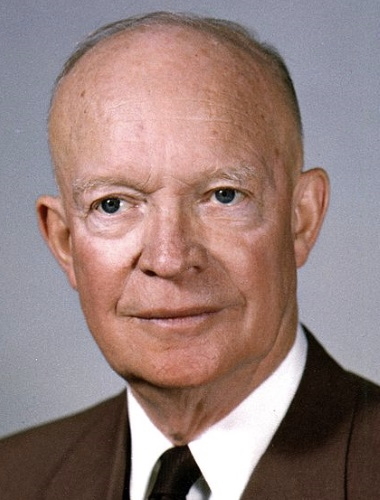 Eisenhower's last year as president.
As America headed into the 1960s, it was still the "Happy Days"
of Middle America. Social attentions were mostly local rather
than national ... and family, church and school life seemed safe and
secure. The broadest issues of the day might have seemed to most
people: who was going to win the up-coming football game or what Lucy
would be up to on her TV program I Love Lucy. And for the
young generation of "Silents" (much younger than the Vets but older
than the Boomers coming up behind them) their major concern (besides
the football game and sock hop afterwards) was learning the latest
dance steps shown on the TV program American Bandstand.
Eisenhower's last year as president.
As America headed into the 1960s, it was still the "Happy Days"
of Middle America. Social attentions were mostly local rather
than national ... and family, church and school life seemed safe and
secure. The broadest issues of the day might have seemed to most
people: who was going to win the up-coming football game or what Lucy
would be up to on her TV program I Love Lucy. And for the
young generation of "Silents" (much younger than the Vets but older
than the Boomers coming up behind them) their major concern (besides
the football game and sock hop afterwards) was learning the latest
dance steps shown on the TV program American Bandstand.
Eisenhower was hoping to finish out his presidency, leaving a huge
legacy of peace behind him. But things did not go well that last
year (1960), with a U-2 spy plane shot down over Russia just two weeks
prior to a big-power conference scheduled for mid-May, an obvious
effort of Soviet Russian President Khrushchev to shoot down not only
the plane but also the peace conference as well (U-2 flights had
actually been going on for some time – not a novelty – though shooting
one down at that point was ... thus clearly a political decision).
Then there was this matter of the recent
revolution in Cuba, in which Fidel Castro had taken control of the
island nation and was cleaning out the corruption – but also the huge
place that American business played in the Cuban economy as well,
replacing American influence with Soviet influence. This was
shocking to the Americans, for this move of Castro's positioned Soviet
Russian influence just offshore from Florida. That was not
acceptable. Eisenhower thus put together a plan for Cuban
"patriots" to overthrow the Castro government, although the actual
event would not be ready to get underway until a couple of months after
Eisenhower left office in 1961.
Then there was also the turmoil in the Congo, as
the Belgians, along with the British and French, were abandoning their
imperial positions on that continent towards the end of the 1950s.
Needless to say, a rising Africa would stir the interests of the
chief Cold Warriors Russia and America and bring that continent into
the heart of the Cold War. In fact the same was holding true of
Latin America (as in Cuba) and Asia, with Mao trying to lead the rising
world of Asia, Africa and Latin America or the "Third World" in
revolutionary thought and behavior. The Third World was made up
of a huge group of neutral or "non-aligned" nations of those
continents, who claimed that they would never become protectorates of
either the Americans or the Soviet Russians (though always glad to get
help from either). But Russia and America were too suspicious of
the other power so as to not find some way or other to get deeply
involved in this rising Third World. Thus Cuba. Thus the
Congo.
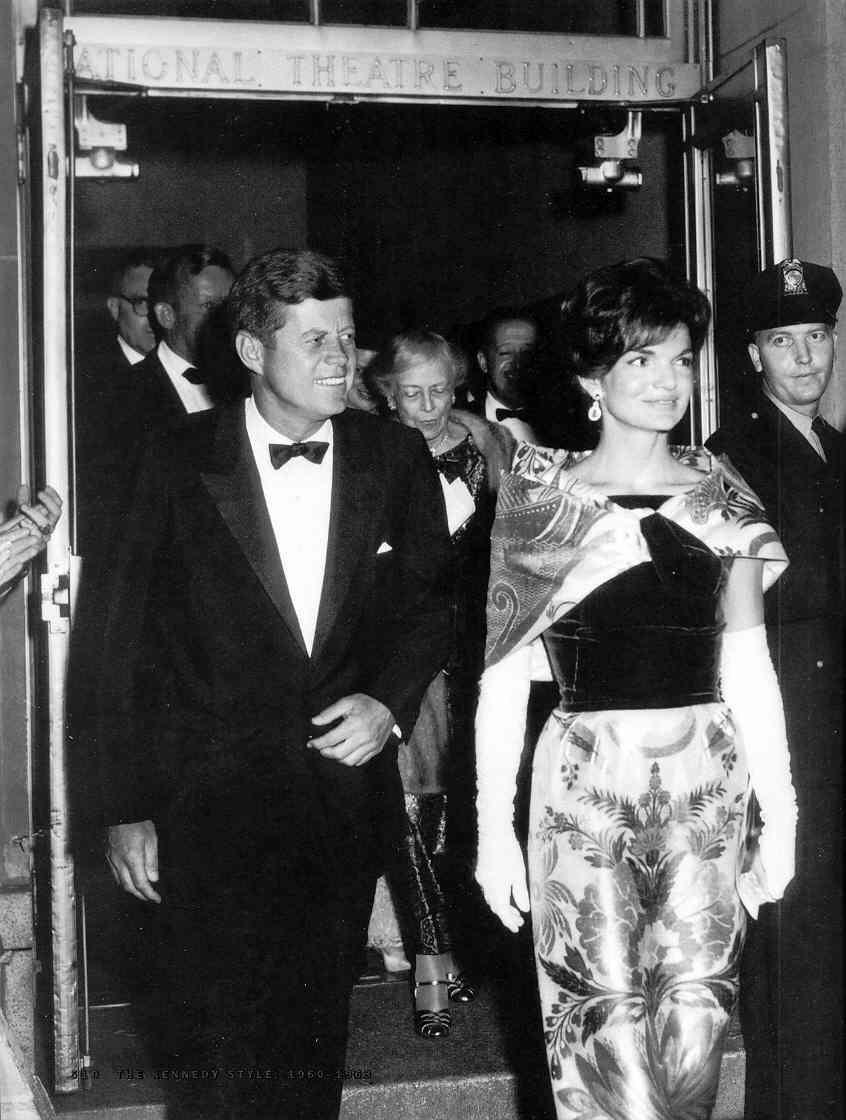 Kennedy.
Then in November of 1960, America elected the youthful and
handsome John Kennedy (and his beautiful and sophisticated wife,
Jackie) to the White House. For the first time ever, America
seemed to present as socially-culturally sophisticated a picture to the
Europeans as the Europeans once had presented to the Americans.
Kennedy.
Then in November of 1960, America elected the youthful and
handsome John Kennedy (and his beautiful and sophisticated wife,
Jackie) to the White House. For the first time ever, America
seemed to present as socially-culturally sophisticated a picture to the
Europeans as the Europeans once had presented to the Americans.
And Kennedy had a highly idealized challenge to
offer America, especially its very patriotic Silent generation of
American youth – for whom all the anti-authoritarian indoctrination of
America's youth in the course of the 1950s had not sunk in as deeply as
it certainly did for the younger Boomers. Immediately upon
assuming office Kennedy put together the Peace Corps Program, calling
on America's recent college graduates to take up the challenge of
going, like "warriors of peace," out into the villages of the Third
World for a couple of years, offering their services teaching English,
raising chickens, or just doing "community development" – as a means of
fighting the Cold War peacefully. The goal was to win the hearts
and souls of the rising Third World nations as a new approach to the
Cold War – which anyway had by that time shifted its primary focus from
Europe to the rising nations of the Third World.
But Kennedy was also barely in office when he had
to make a decision about this pending invasion of anti-Castro Cubans
that was immediately set to go. He couldn't just call off this
effort to get rid of the Castro nuisance ... but to support the effort
would also make a lie of his "new look" in American diplomacy.
Thus he wavered in his support once the event got underway (April
1961), leaving the Cuban "patriots" defenseless against Castro's
forces. And America's hand in the plot was quite apparent to all.
So Kennedy came away from the event looking rather incompetent as
a presidential leader.
Soon thereafter, in order to probe Kennedy further
as a Cold Warrior, Khrushchev made a move to isolate pro-American West
Berlin – by building a wall around that portion of the city (August
1961) ... and waiting to see what Kennedy would do in response.
Ultimately Kennedy did nothing.
This then led Khrushchev to up the pressure on
America, by building launch sites in Cuba where nuclear-tipped rockets
could be stationed and aimed at America's cities, putting the American
nation under huge Soviet pressure in this ongoing ideological war.
But Kennedy knew he had to block the move, even if it meant war –
horrible, nuclear war. He chose simply to place the U.S. navy
around Cuba and then dare Khrushchev to try to bring those missiles
past the blockade (October 1962). This time it was Khrushchev who
blinked first ... and not only backed down, but agreed to dismantle the
launch sites (infuriating Castro, who as frequently the case with
dictators, would have been willing to see Cuba destroyed in a nuclear
holocaust if it also brought down America!). So Kennedy came away
from that episode finally looking very presidential.
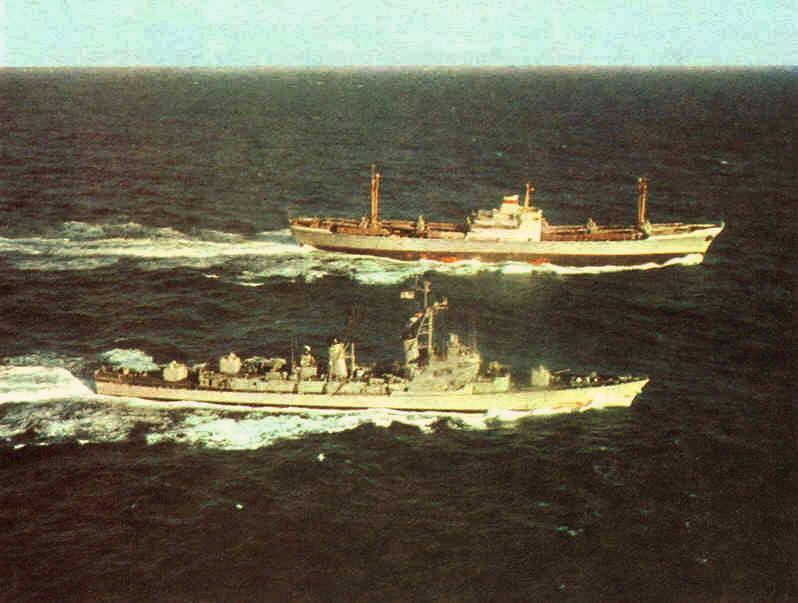
Then there was the matter of Vietnam, with Buddhist priests protesting
against the pro-West (strongly Catholic) ally Ngo Dinh Diem, one even
burning himself in the streets of the capital city, Saigon (June 1963).
Kennedy (just two weeks before he himself was assassinated
(November 1963) arranged with the South Vietnamese military to
overthrow the Diem government – making the persistent (and always
wrong) assumption that with the dictator taken down, democracy would
automatically spring forth in that country. Indeed, with Diem
gone, social order crumbled extensively in South Vietnam ... advancing
greatly the ability of the Communist partisans to pull huge sections of
that country under their control.
The Supreme Court. Another huge
political development in the early 1960s was the way the Supreme Court
stepped into the middle of America's cultural debate in order to take
sides – and thus help immensely to deepen a split between the very
traditional Christian Vets and the rising "progressive" voice of the
ideological "Left" on the American political spectrum. These justices
clearly aligned themselves with the same political "Left" ... made up
of Democratic Party politicians, Washington bureaucrats, and the
intellectuals in the fields of academics and journalism. Indeed,
these justices began to reshape the very fundamentals of American
constitutional law on that Left-leaning ideological basis.
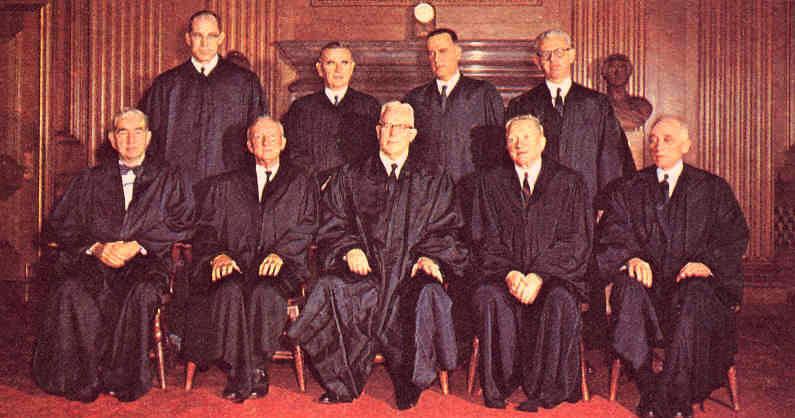
As with all social revolutionaries, the Supreme Court justices aimed
their "reforms" at the culture's youth (much as Mao was doing in China
at the same time), dictating what could and could not be presented to
the next generation as their fundamental worldview. That was understood
to be the best way to dismantle the Christian worldview (something that
American intellectuals had been wanting to do for a very long time),
the worldview that had been the spiritual grounding of the country
since its founding in the early 1600s.
Leading the assault on the Christian worldview
was the ever-Leftist American Civil Liberties Union (ACLU), whose idea
of "civil liberties" was to force its atheistic worldview on society –
not through the democratic process of getting America's representatives
in Congress to move in its ideological direction (that simply was not
going to happen and the ACLU thus did not waste its time going down
that road) – but instead taking its case to the Federal courts where it
could get a handful of judges to decree a deep change in the laws of
the land. Very authoritarian ... and ironically always done in the name
of "civil rights!"
Thus it was that the ACLU drove its Engle v. Vitale
case all the way to the Supreme Court (from its start in 1959 until the
Court's decision in 1962) to get the Court to shut down a rather
inclusive prayer that the New York Regents wanted New York teachers to
start their days with:
Almighty God, we acknowledge our dependence upon Thee, and we beg Thy blessings upon us, our parents, our teachers and our country. Amen.
The
Court ruled that the prayer violated the Constitutional principle of
the "separation of church and state." This was an innovative way
of reinterpreting the rights guaranteed by the First Amendment – which
simply states:
Congress shall make no law respecting an establishment of religion, or prohibiting the free exercise thereof; ...
Clearly the First Amendment intended to keep "Congress" (which
represented the voice of the "state" at the time of the Constitution's
creation, the Framers of 1787 having no idea that the Supreme Court
would soon come to announce itself – and not Congress – as the supreme
legal authority of the land) out of the business of deciding what part
of the people's religion was permissible and which part was not.
This 1962 Court decision was in total violation of the clear
intent of the First Amendment ... especially the part about
"prohibiting the free exercise thereof."
The following year the ACLU had another Supreme Court decision go in its favor in the Abington Township School District v. Schempp
(1963) case, in which the Court ruled that the reading of the Bible in
school was also prohibited by the Constitutional principle of the
"separation of church and state." In short, the First Amendment was
from now on clearly to be read (as the ACLU distinctly wanted it to be
read) not as the freedom of religion, but instead as the freedom from religion ... especially in the shaping of the worldview of America's children and youth!
There was an immediate reaction in Congress in the form of a proposed
constitutional amendment (the "Becker Amendment") designed to make it
very clear to the Supreme Court justices that they could not block
prayers in the schools. But the bill was not released from the
House Judiciary Committee by Emanuel Celler, its Jewish chairman – who
intended to kill the momentum of the movement. And when he did
finally hold hearings (at a time when other congressmen were distracted
by the coming 1964 national elections) he brought in only
denominational church leaders who had previously made it clear that
their understanding was that the Supreme Court decisions served to
protect religion – not prevent it – and thus the amendment was
frivolous ... and even dangerous. Thus Celler killed the
amendment.
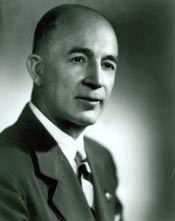
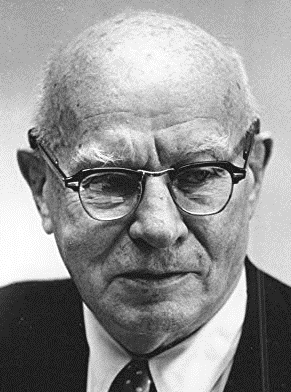
Tragically, these voices of the mainline churches taking a position
opposing such a new amendment were most unprophetic (Catholics and
Evangelicals, however, were strongly in support of the new amendment
proposal). These leaders simply chose not to understand where the
social dynamics pushed by the ACLU and the Court were headed.
This would mark the time of the very peak of
Christian church attendance ... and the gradual, but unbroken, decline
of those very same once-great denominations with the rising generations
– who purposely had been "freed from religious indoctrination" by the
ACLU. Secularism (with its purely mechanical or atheistic
worldview) would begin its steady rise in contest with Christianity as
the foundational worldview of American society. Tragically, the
leading voices of the mainline churches had simply refused to see this
coming their way – and thus offered the Christian (and thus truly
"democratic") world no real leadership in the cultural war that was
beginning to emerge in the 1960s.
Dr. Martin Luther King, Jr. advances greatly the Black civil rights cause.
Since the mid-1950s, American Blacks had become (cautiously) more
affirmative of their rights long-denied them as American citizens.
And with such incidents as Eisenhower's 1957 ordering of troops
to Little Rock to oppose Arkansas Governor Orval Faubus's attempts to
block efforts by a small group of Blacks to enter the all-White Central
High School ... political America was beginning to awaken to the
problems that Blacks faced in Middle America – especially in the
American South (at the same time blinded by the problems right there in
their own Northern inner-cities).
But it was the call of the Rev. Dr. King to bring the issue before the Federal Government with a huge march on the nation's capital (March 1963) that finally caused a huge shift in favor of the American Black community. His appeal was simple – and powerful. How could America present itself to the world as a model nation to the newly rising nations of Africa, Asia and Latin America ... if it still had such racial blemishes at home? Indeed, Dr. King had a dream ... a dream that someday soon everyone in America, Black or White, could truly share as equals the wonderful blessings of America. By the time he had finished his speech, most all of America recognized the truth, the power, of his challenge. Things would finally start shifting in the direction of support for Blacks in their quest for full equality. A social revolution was now underway.
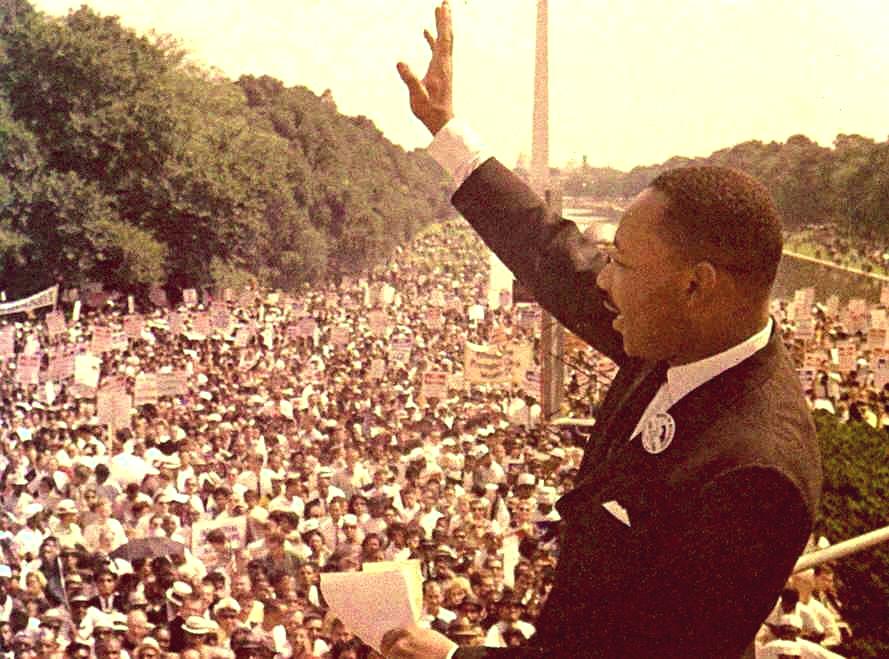
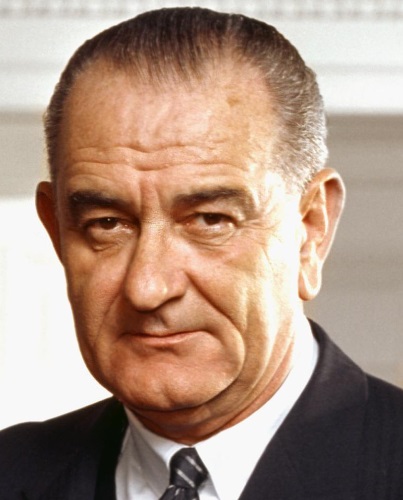 Johnson. With Kennedy's assassination in November of 1963, his vice president, Lyndon Johnson, took over the White House.
Johnson. With Kennedy's assassination in November of 1963, his vice president, Lyndon Johnson, took over the White House.
The Americans were shocked not only to see their glamorous president
taken from them, it seemed that fate had put a Southern "good-old-boy"
in the White House. Admittedly, Johnson had none of the public
polish of Kennedy. But he was an experienced Washington politician (had
headed up the Democratic Party majority in the Senate before becoming
vice president) and in so many ways could get things done in Washington
that Kennedy could never even dream of. Johnson was a man of
enormous political will and power ... and determined to leave an even
bigger impression on America than had Kennedy.
One of Johnson's political goals was to "perfect"
America as the only proper showpiece to the world of real "democracy."
America and Russia were engaged in an intense battle to impress
the rising Third World nations – and to win that battle, America was
going to have to clean up its blemishes, especially the matters of race
relations, poverty and illiteracy. It was going to have to become
the "Great Society (first outlined by Johnson in May of 1964)."
And Johnson would dedicate himself fully to the
development of this Great Society in America ... by reshaping American
society "from above" – to the benefit, he assured America, to those
occupying the social positions furthest "below" in American society
(the poor-Whites and the majority of the Black community). Under
his direction, Washington would undertake a war on poverty, on racism, on
all sorts of social injustices, passing law after law to advance the
cause of those who had been left behind in life's competitive game.
Combating these social evils through Federal programs put into
place by Congressional law would be the way he would construct the
Great Society.
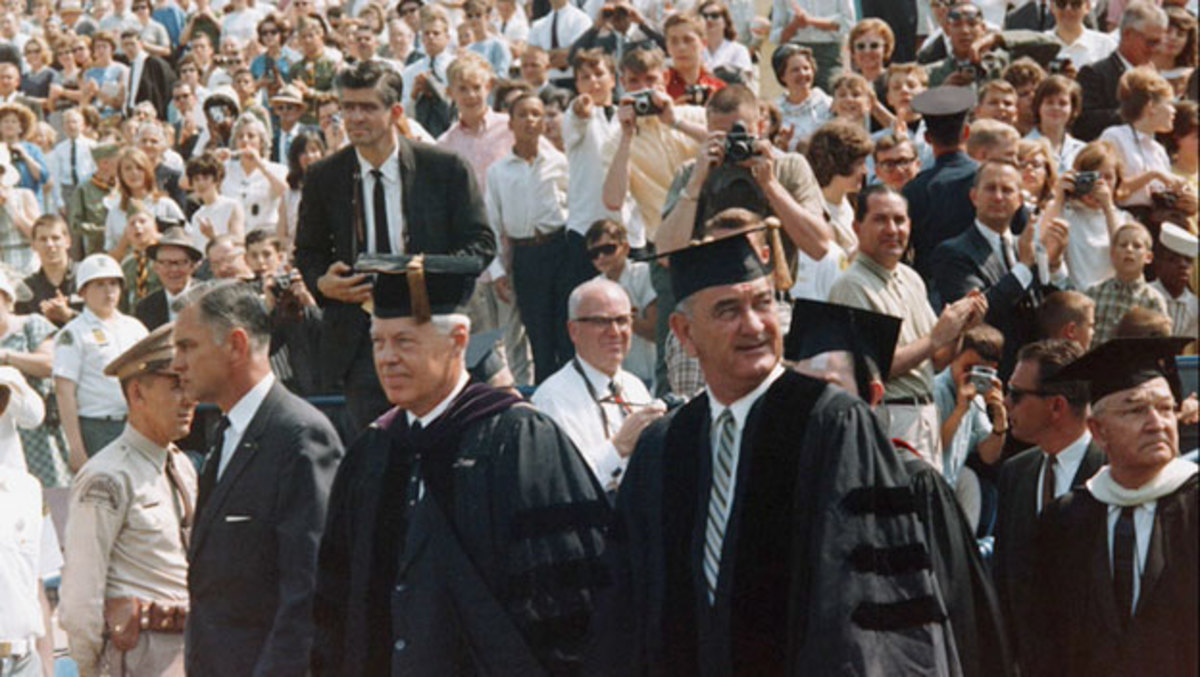
Johnson announcing his "Great Society" concept - 1964
Johnson was not a "charismatic" individual finding it easy to
simply direct an appeal to the American people ... to join him in this
"perfecting" of America (like Kennedy and the Rev. Dr. Martin Luther
King had done). He was a powerful behind-the-scenes Washington
political operator, a highly skilled wielder of Washington power who
knew how to get things done the Washington way. He would thus not
need to mobilize the American people to get his program moving ahead.
He was also a person greatly impressed with the
abilities of technical experts (that is, intellectuals!) to devise,
develop and direct efficient social plans, ones able "scientifically"
to put into operation his Great Society. Thus Johnson would
develop a huge (and hugely expensive!) Washington bureaucracy of
technocratic professionals to preside over his Great Society program.
Again ... he would not need to call on the American people
themselves for their support in putting his Great Society program in
place.
A deepening Democrat-Republican Party divide.
To swing the legislative support from Congress that Johnson would
need to put this massive bureaucratic program into place, he
disciplined his Democratic Party into a powerful tool willing to
support this shifting of the powers of government to a massive
Washington D.C. "Establishment." This was not exactly a new thing
for the Democrats – nor for Johnson, who got his start in politics as a
New Deal official back in the 1930s – because the Democrats had been
the major support group for Roosevelt's New Deal" ... which Johnson
himself was modeling his political agenda on.
Some saw this as "democracy by the enlightened
ones" or what I also like to term as "democracy from above." Some
were so bold as to identify it in fact as "socialism" – such as the
Humanists of the 1930s who in their Humanist Manifesto
were proud to proclaim themselves to be in full support of socialism –
a political philosophy supposedly (back in the 1930s) better able than
failed capitalism to get the nation back to work. Roosevelt had
recruited heavily from America's Secular-Humanist intellectuals as
designers and managers of his various New Deal programs. And thus
pretty much since then, American intellectuals had come to view the
Democratic Party as their natural political base. And almost all
urban bosses who had offered a similar "caretaker" program of jobs and
favors to immigrants coming to their cities (in exchange for their
support for these bosses when elections rolled around) were Democrats.
The mentality was much the same for both groups.
But America's Middle Class held strongly to the
view that the nation's citizens should find their own personal, private
path to success – and not depend on some political agency from "above"
to deliver them life's benefits. It was part of America's great
Christian tradition – that Americans were to take on the challenges of
life (often very fierce challenges) on their own and depend only on God
(and each other) for any extra support. They were not to depend
on the support of some special group of political benefactors, who
eventually – through the kind of sin that power invites – would use
their positions of authority to put the rest of the citizens in a state
of political and social dependency. This was simply how
"authoritarianism" was understood to work ... and the Vets wanted no
part of such a development to ever find its way into their America.
But at first, in the early days of Johnson's Great
Society, even (for a short while, anyway) the Vets seemed to support
Johnson's vision (not yet understanding its political implications).
Improving American society so as to present the very best
possible face to the world during the Cold War seemed like a perfectly
logical idea. But they would soon (the later 1960s) come to see
the dangers in all this "progressivism from above."
Vietnam. On yet another front,
that of South Vietnam, Johnson had a mess to deal with, resulting from
the downfall of the Diem regime. Here too, Johnson's intentions
were to deal with this issue directly, much as he was handling the
Great Society program: he planned simply to service democracy
"professionally" in Vietnam by sending well-trained U.S. troops to
South Vietnam ... to clean up the mess that the Vietnamese themselves
were incapable of clearing up on their own.
But 1964 was an election year, and he had to tread
softly on the matter – and not get ahead of the American people in what
they were willing to do. In fact he had been attacking his
Republican presidential opponent Barry Goldwater as a war-crazed
bomb-wielding individual ready to drag the country into an atomic war –
because he once had answered "yes" when the press asked the politically
leading question of Goldwater – if he would actually ever use atomic
weapons. Was Goldwater supposed to say "no"?
In fact Johnson himself was planning to drag
America into war at that same time. He cleverly exploited the
opportunity of an incident that occurred when an American ship was
fired on by the Communist North Vietnamese at the Bay of Tonkin.
Johnson played the event in such a way (not honestly either) to
get Congress to give him (August 1964) whatever powers he might deem
necessary to respond to future threats from the Communists in Vietnam.
Thus Johnson had the authority to secure the victory in this
contest with Communism in the region, a victory that (along with his
Great Society) would give him the greatness that wartime presidents
typically are accorded.
The plan was to unload soldiers at various points
along the South Vietnamese coast and then slowly fan out from these
bases into the South Vietnamese interior, securing such control little
by little until they had completely pushed the Communists out of the
country. This then would finally allow the Americans to turn the
country over to the Vietnamese. In this way democracy (secured
"from above" by way of American action) – not Communism – would finally
come to South Vietnam.
Unfortunately not a bit of this worked. The
Vietnamese enemy wore no uniforms and thus could not be distinguished
from the population the Americans were trying to save. Thus there
never was an identifiable line of battle ... because as the American
troops passed through the smiling villages in the search for the enemy,
they had no idea that many of those waving them on were the enemy.
Furthermore the Buddhist protests that had been so dramatic (for
instance, the priest burning himself in downtown Saigon) had never been
about securing Western-style democracy for Vietnam ... but instead
about getting the foreigners, both Communists and Westerners, to go
away and leave them alone.
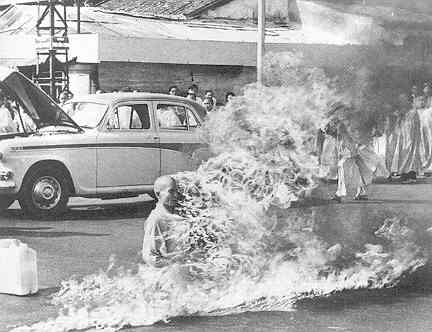
Thus it was that the Americans were never quite able to secure any particular areas of Vietnam, except where the troops themselves were based (and surrounded!). Johnson poured in more troops – and more and more troops – not realizing that this was not going to change the dynamics of the situation. And his generals, who were not used to this kind of warfare, had no answers either. Finally it just became a matter of killing more of the Vietnamese than the Vietnamese killed of the Americans. But this strategy was destined to go nowhere. Indeed, it merely deepened the frustration of the America troops serving in Vietnam – as well as the Americans back home. They became increasingly upset watching their sons and brothers being killed ... to no great purpose. Things were not looking good for Johnson.
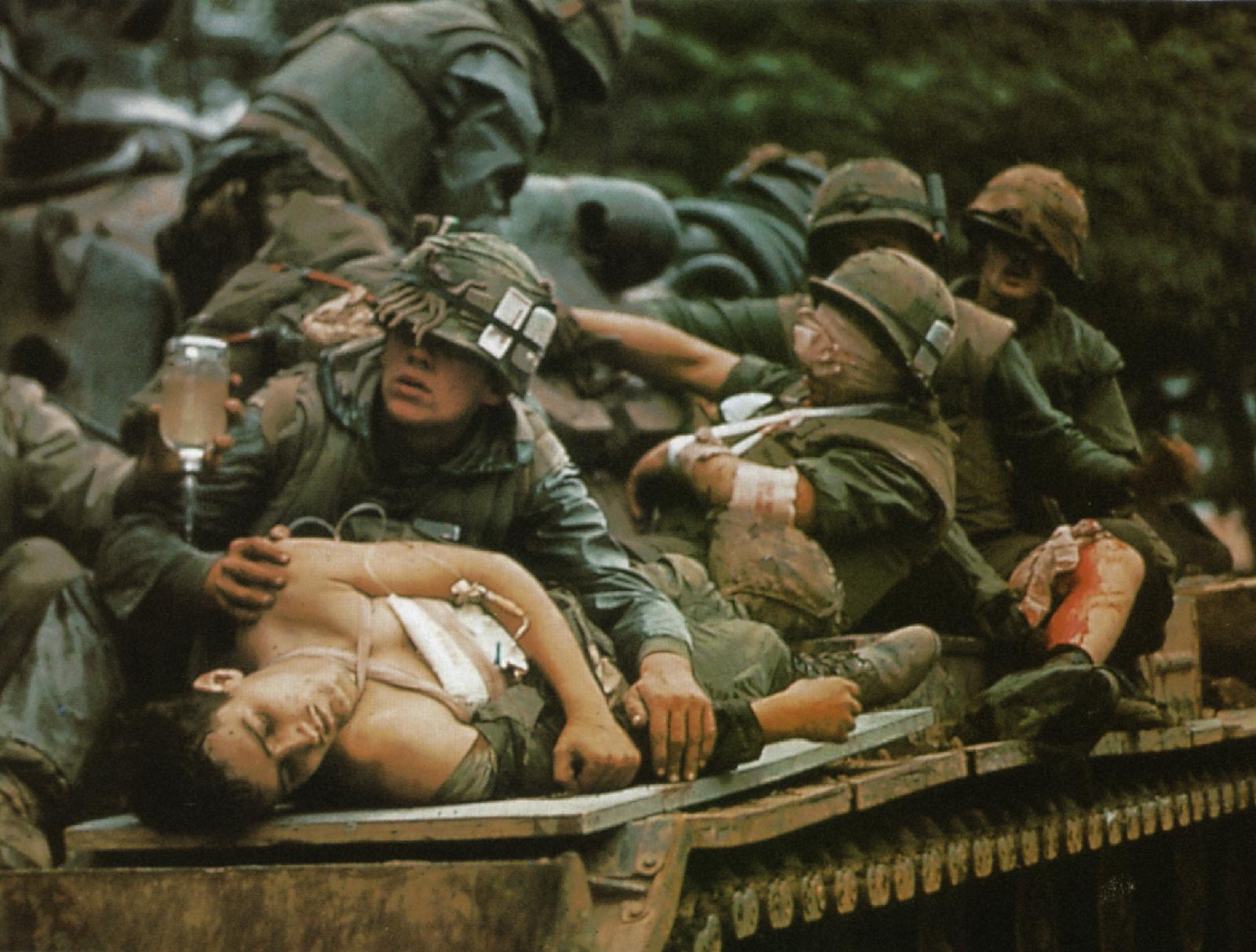
The world goes on without Johnson's involvement.
So deeply was Johnson caught up in the Vietnam mess that on a
number of other key fronts, in which America as leader of the Free
World, should have played a role in pacifying or resolving, Johnson did
nothing. For instance, Charles De Gaulle, who hated the
Anglo-Saxon world (mostly Britain and America) because he was not given
the respect during World War Two he thought he was due, did everything
possible to undercut America – step by step withdrawing French support
for and involvement in NATO, hoping to draw other Europeans with him in
his retreat from the organization (no one joined him, however).
Perhaps there was little that Johnson could have done with De
Gaulle's program. But the world will never know, because Johnson
really never responded seriously to De Gaulle's challenge.
Then in 1968 the Czechs rose up in revolt against
the Soviet Russian tyranny over their land. The Czechs were
certainly hoping for support from the West when they made it clear that
they intended to back out of the Soviet military camp. But here
too, there was little by way of a response that ever came from Johnson
over the matter. And, with a huge Soviet and Soviet-allied
military intervention in October, the Czechs were forced back into
subjugation – remaining in that miserable condition until the collapse
of the Soviet Empire two decades later.
The American press, however, goes crusading abroad.
Another event which drew no serious response from Johnson – but
did get a huge reaction from the American press – was the blowup
between the Arabs and the Israelis in the 1967 June (or Six Days) War.
Although the Egyptian Arabs basically started the conflict, it
would be the Palestinian Arabs who would once again come out of the
conflict as huge losers. Up until this event, America had been
fairly neutral in the struggle between the Jewish refugees pouring into
Palestine after World War Two, and the struggle of the Arab inhabitants
of the area to hold off the Jewish takeover of their homes, farms, and
towns. However, in the 1967 June War, the American media
presented a strongly one-sided pro-Israeli perspective on the struggle
between those groups. But what was surprising, so did American
Christians – especially the Evangelicals – never really aware that a
large portion of the Arab Palestinians were Christians ... descendants
of Christian ancestors reaching back to the origins of the Christian
religion itself. The Christian component of the Palestinian
struggle to hold off the Jewish invasion of their lands was never
mentioned in the media ... for obvious reasons. Thus Christian
Americans cheered on the Israeli Jews (who, understandably, had no
interest whatsoever in seeing the Christian gospel maintained, much
less spread, in that part of the world) – as the Jews took over the
rest of the Palestinian homeland. Again, Johnson himself had
little to say or do in the matter.
Growing problems on the home front.
Meanwhile, back in America, Johnson's Great Society had unleashed
a "revolution of rising expectations" ... particularly among the
Blacks, who were expecting to see immediate social rewards come their
way because of the Johnson initiatives. But their new political
freedoms were not producing the immediate economic and social blessings
they believed would be coming their way. Quickly-mounting Black
frustration was easily exploited by the young and politically ambitious
"Black Power" advocates, directing fellow Blacks to take to the city
streets of the North, ultimately not to conduct "peaceful" political
protest, but to sack and pillage their neighborhoods as they cursed the
evil White world.
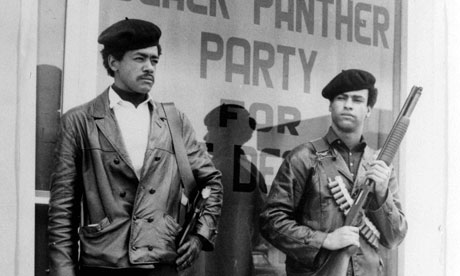
At the same time, resistance to the war among the rising Boomer
generation also was starting to have an impact. Egged on by the
usually younger, more "progressive" campus professors, colleges became
the stages for a growing anti-war protest movement. And thus in
late 1967, masses of Boomers from all around the country gathered at
the Pentagon to protest the war.
1968 – the "horrible year." But all of this Black power and anti-war protesting would be mild in comparison to what erupted in 1968.
The year began horribly with the Viet Cong enemy invading the cities of
South Vietnam, even the capital Saigon, even the American embassy ...
and had to be driven step by step out of their new positions. To
nearly all American observers, it made a complete mockery of the idea
that all this effort (over a half-million American troops in South
Vietnam) had achieved anything at all. It was time for America to
go home.
Then in March, at the end of a TV broadcast,
Johnson surprised everyone by announcing that he would not be running
for reelection that fall. He was quitting.
Then in April some deranged White guy shot and
killed Dr. King – and all hell broke loose as Blacks, to the refrain of
"Burn, baby, burn" pillaged and torched one American city after another
(again, basically in the North). The military finally had to be
called in to get things back in order.
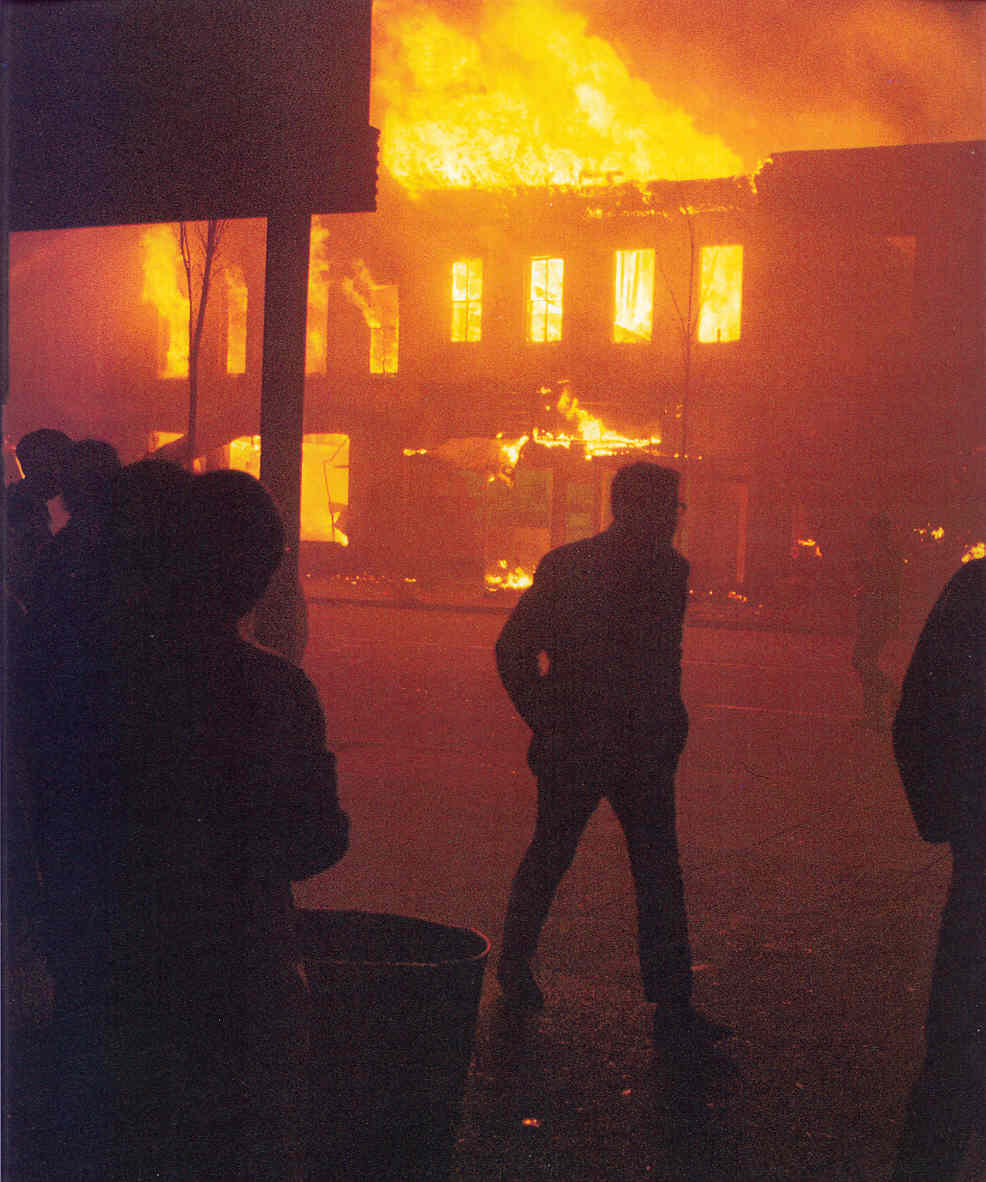
Then in May Boomer youth shut down Columbia University in protest
against the university's insensitivity to Blacks by clearing gardens
the Blacks had been allowed to use in order to erect a new facility on
what was always university land. It seemed mostly just to be a
protest for the sake of protesting. But remember, this was
supposed to be the very path that Boomers were expected to follow as
social heroes.
Then in June, Bobby Kennedy (John's brother – and
at that point the most likely Democratic Party presidential candidate
for the 1968 elections) was gunned down by a young
Palestinian-American, furious at Kennedy for his support of the Israeli
military. Upset Whites did not follow the Black example of
burning America down. But it certainly left the country dazed.
Then in August, Boomer youth, led by the Yippie
leaders of the Students for a Democratic Society (SDS), descended on
Chicago in order to bring total chaos to the Democratic National
Convention, called to nominate a presidential candidate.
And the Chicago police were willing to respond in kind. Thus indeed, pure chaos reigned.
By this point America seemed to have lost all sensibleness.
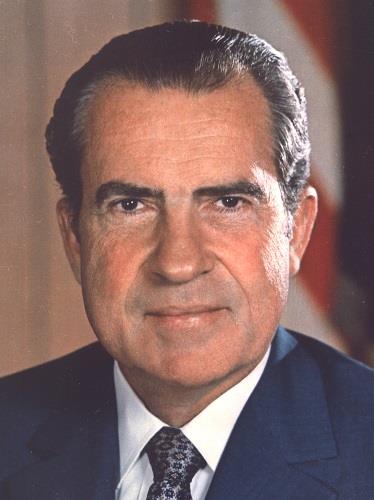 Nixon and Realpolitik.
The 1968 election brought Richard Nixon to the White House, the
champion of the "Silent Majority" (the Vets basically) as Nixon himself
termed his support group. And he had his hands full. The
biggie was the Vietnam mess. He announced that he intended in
stages to pull U.S. troops out of Vietnam ... but in a way that left
behind some kind of pro-Western political legacy that had been very
expensively put in place since the toppling of the Diem regime.
Nixon and Realpolitik.
The 1968 election brought Richard Nixon to the White House, the
champion of the "Silent Majority" (the Vets basically) as Nixon himself
termed his support group. And he had his hands full. The
biggie was the Vietnam mess. He announced that he intended in
stages to pull U.S. troops out of Vietnam ... but in a way that left
behind some kind of pro-Western political legacy that had been very
expensively put in place since the toppling of the Diem regime.
And how was he going to do that? Nixon was
full of surprises. He appointed Harvard professor Henry
Kissinger, an advocate of old-fashioned Realpolitik
(a tough political "Realism" ... detailed in the section below,
"Excerpts from Volume 3") which was very careful in applying the
precise amount of power needed to advance authentic "national
interest." It avoided emotional crusading (which nearly always
leads people down the road to disaster) and instead employed a
cool-headed approach which calls on a skillful use of diplomacy,
economic leverage and, if necessary, carefully-measured military
engagement to advance the national interest.
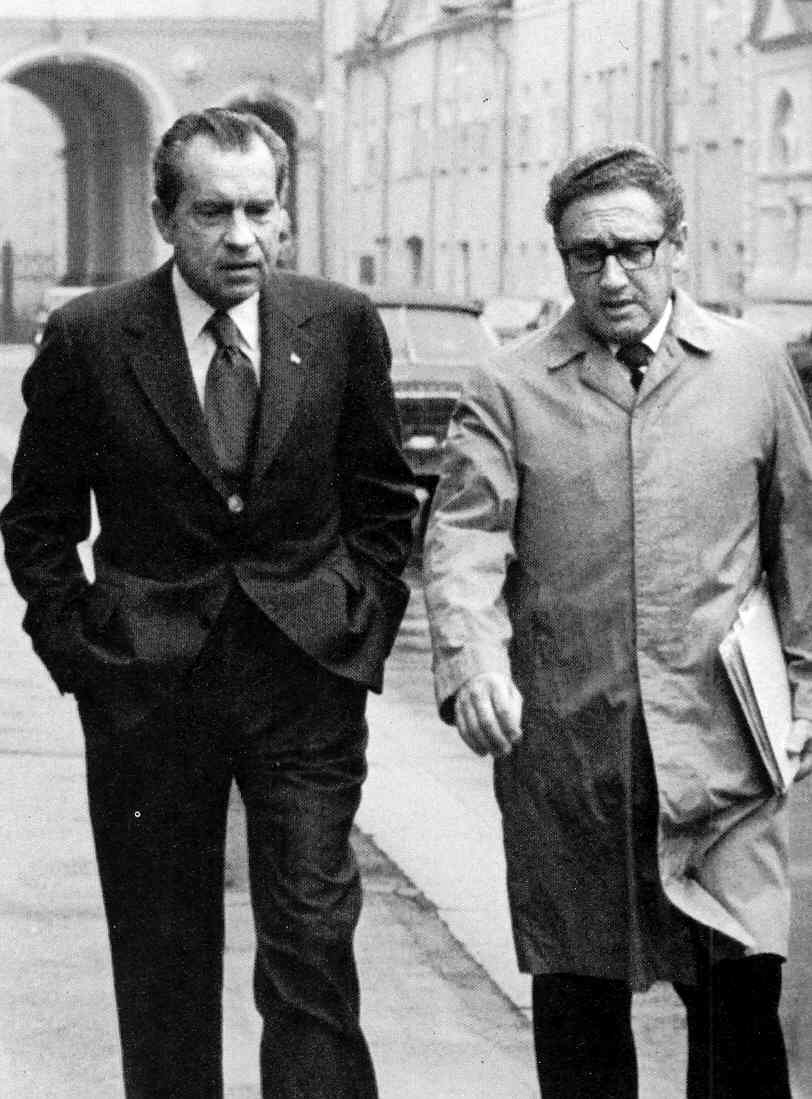
Thus he sent Kissinger off to China to investigate diplomatically
China's possible interest in improved relations with America (the
Communist label was not really a factor for Nixon as it had been for
Johnson) as "linkage" in getting the Chinese to be more cooperative
with America as Nixon's underwent a military pullback, obviously
something that was going to produce a shift the nature of the
international balance of power in Vietnam ... and the entire Southeast
Asia region. He didn't want China playing into that shift.
Thus improved relations with America was the bribery offered to
make China stay out of the coming shift. Nixon himself then
traveled to China to let the world know that new things were happening
in Washington. Then, just to keep things in balance, Nixon and
Kissinger flew off to Moscow, starting negotiations on a nuclear arms
limitation agreement (China and Russia at that time, though both
"Communist" were in fact experiencing a bitter difference in actual
national interests). Then with this game of "linkage" in place,
Nixon began to withdraw American troops by tens of thousands in various
stages of removal.
To get both South and North Vietnam to understand
that Nixon was putting the region under a new, more defensible
political status quo, he had to get both sides to come to a mutual
understanding of what this meant. They needed to finally sign a
peace accord, something that could be enforceable by American power,
though of a different character than just a half-million ground troops
running around shooting up the country and ultimately achieving nothing
(as had been the case under Johnson). Nixon was going to use the
power tool that gave America immense advantage: air power. Both
sides did not believe that he would actually use such drastic power.
Actually Johnson had been sending the U.S. air force to bomb
North Vietnam ... but it had been selective, and ultimately
ineffectual. And Johnson had done nothing to shut off the huge
trail (the Ho Chi Minh Trail) of supplies the North had been sending
through "neutral" Cambodia to the Viet Cong guerrillas. Johnson
was afraid of widening the war by taking "drastic" actions that might
upset the other world powers. But that's why Nixon had headed off
to both China and Russia ... to neutralize that factor. And thus
Nixon proceeded to throw full force into his Vietnam program, first
invading not-so-neutral Cambodia and shutting down the Ho Chi Minh
Trail. And then he proceeded to bomb both North Vietnam's capital
Hanoi and its chief port Haiphong ... to shut down North Vietnam's
ability to import more military supplies, and in fact to undercut
deeply the North Vietnamese economy – and thus its capacity to wage
war. And indeed, finally (January 1973) both North and South
Vietnam signed a peace agreement after years of haggling but no
willingness to get serious about peace. Now things were serious,
very serious. That was Realpolitik in action!
Of course, Americans, especially those on the Left – as well as
America's idealistic Boomer youth – understood none of this approach to
international power ... and proceeded to conduct a series of protests
(actually riots in some cases) in anger at "American imperialism."
But the Vets understood, and helped to reelect Nixon in November
of 1972 with the fourth largest majority in any of America's
presidential elections. The Democrats were humiliated.
Watergate. But the Democrats
were by no means down and out. In fact they had strong majorities
in both houses of Congress. And they were thus able to make their
counter-move against Nixon when zealous Nixon campaign workers were
caught trying to bug the Democratic Party headquarters at the Watergate
Apartment complex ... and equally zealous young Washington Post
reporters decided to see if the trail of conspiracy didn't lead all the
way back to the White House (actually Nixon had played no role in the
event itself initially, but would be drawn into the affair with his
attempt to throw a protective cover over his office and staff
afterwards). This coverup would give the Democrats (and the very
active media) hopefully grounds to chase Nixon from the White House.
"Democracy" needed to be saved from the
imperialist White House (with "Chappaquiddick Ted" Kennedy leading the
moral cleansing process from behind the scenes). But even before
they could succeed in the new impeachment process (not attempted in
over a century), they also cut back Nixon's presidential powers that he
had used to restrain wild government spending (he was cutting out "pork
barrel" spending that Congressmen used to get votes back home ...
irritating the Congressmen deeply). Then even worse, to undo his
obvious diplomatic success abroad (where Johnson had failed miserably)
Congress took away the war powers they had granted Johnson – now making
it illegal to bomb the North, the very thing that had brought North
Vietnam to finally agree to a peace proposal. Also, to further
humiliate Nixon, they even cut out financial support of the South
Vietnamese government ... all in the name of "anti-imperialism."
They obviously had no idea of what that would do
to Vietnam – or just didn't care, because they wanted to undo Nixon and
his political legacy so badly.
In the end, they did "get Nixon."
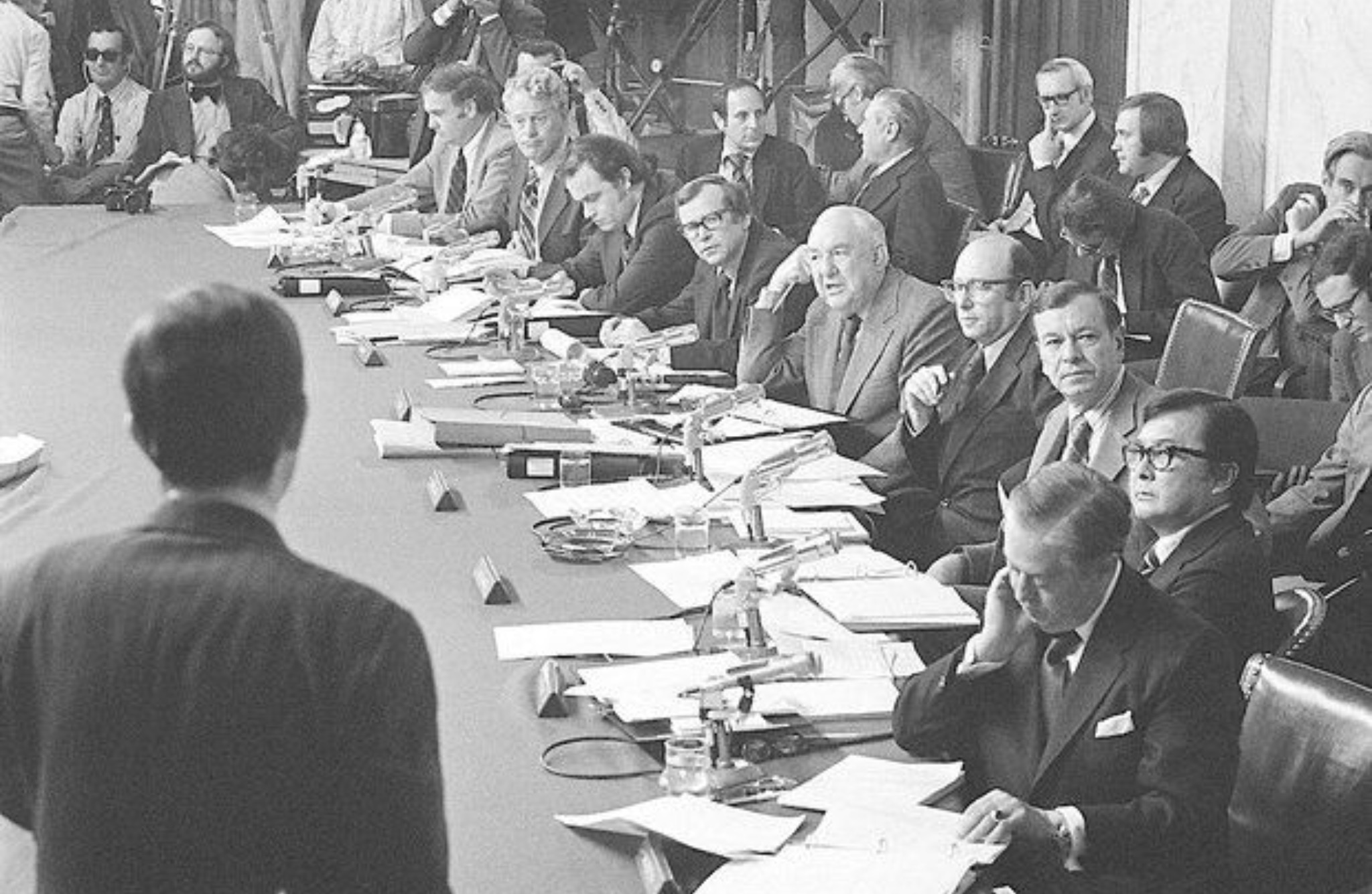
But they also brought down the political status quo in Indochina.
With American power crippled in the region, North Vietnam was now
able to invade the South, take over, imprison and execute thousands of
former American allies among the Vietnamese – and bring the South
Vietnamese economy to collapse (in typical Communist style) in taking
over the property rights of the South Vietnamese.
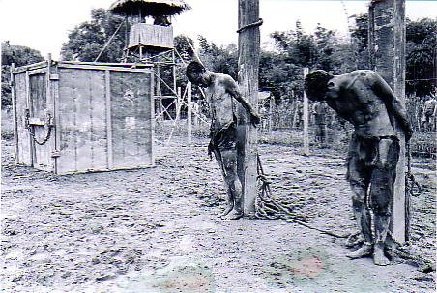
But even worse, this also led to a Communist takeover next door in
Cambodia ... in which hundreds of thousands of individuals were
executed – in order to complete the installation of the Communist
dictatorship of Pol Pot and his Khmer Rouge group.
Soon, Vietnamese began fleeing the country by any
means possible – creating a horrible scene of "boat people" lost at sea
trying to get away ... and refugee camps in neighboring Thailand,
Malaysia and the Philippines filled with thousands of Vietnamese.
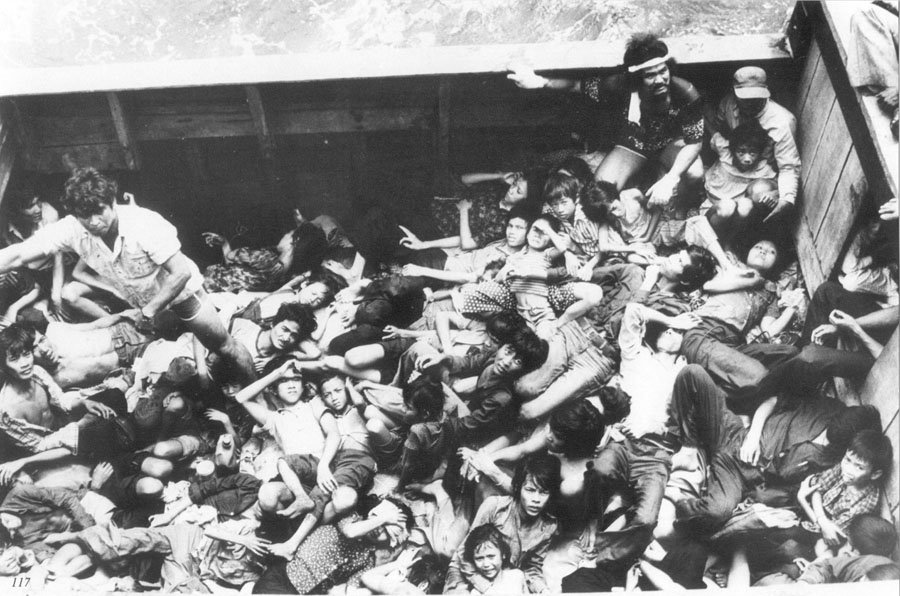
And all of that simply because certain Americans were quite positive
that by taking the actions they had (to undercut Nixon), they were
saving the world from "American Imperialism." Tragically, those
most responsible for this horror never acknowledged their hand in the
disaster ... and probably never even recognized what it was that they
themselves had done to put all those people in that horrible condition.
The Supreme Court's full assault on Christianity. In 1971, in the Lemon v. Kurtzman
case, the Supreme Court made it official. Only a Secular approach
to learning was now "constitutional." In other words, it was
legal to teach America's youth only from the point of view that the
universe is purely mechanical in operation ... that divine
interventions and "miracles" were to be considered just concepts borne
of unscientific or pre-modern minds – and had no place in the American
classroom as fundamental truths. Religions might be taught, but
only as cultural matters, and only in serving a distinctly Secular
purpose. Any advancing of something of a religious nature was now
forbidden by federal law ... the Supreme Court failing to recognize
that the Secularism it was installing as the only worldview allowed to
be taught to America's children and youth was itself a religion – like any
other.
Thus it was that finally, not getting Congress to
overturn Christianity's traditional role as America's foundational
worldview, the anti-Christian Humanists got the Supreme Court to do
that for them. But they needed to quickly amend their 1933 Humanist Manifesto,
which had made it clear that Secular-Humanism was in fact also a
religion – a "new" or "modern" religion – and re-declare Humanism (the
1973 Humanist Manifesto II) simply as scientific fact!
Tragically, the Supreme Court was messing with the most fundamental
item belonging to any people: its worldview or "religion" – the basic
assumptions that a society is founded on, which then inform its people
as to what should constitute right and wrong social decisions and
deeds. Every society has a foundational religion. And the
Constitution made it very clear that the Federal government was to stay
out of the business of deciding for the American people what those
religious foundations should be. It was neither to establish nor
prohibit the free exercise of the people's religion.
But on both counts the Supreme Court had violated its own
constitution – in "establishing Secularism" as the foundational
worldview or religion ... and "preventing the free exercise" of the
people's Christian religion (or any other religion/worldview other than
Secular-Humanism). It should have been none of the Supreme
Court's business to get involved in such matters. But power, and
the "enlightened" exercise of power, is a powerful drug for those with
no known check on that power.
Crisis in the Middle-East (1973).
In October of 1973, war again flared up in the Middle East, and
again it started as a battle between Egypt and Israel – except this
time, with the Egyptian air force fully intact, fighting in the open
desert of Sinai left the Israelis unable to overrun the Egyptians as
they had in 1967. Soon both sides in the conflict were running
out of planes, tanks and ammunition – and a battle for resupply broke
out as Soviet Russia moved to supply Egypt and America moved to supply
Israel. Then the Arab world swung into action ... not doing well
on the battlefield (Syria and Jordan – and finally an exhausted Egypt).
But moving to cut off Arab oil sales to the West brought a very
different outcome. America's European allies (which had remained
largely neutral in the conflict anyway) were brought to their knees
with the oil cutoff. And finally, with America itself
experiencing massive fuel shortages, pressure was such that Nixon and
Kissinger had to lean on Israel to back off – and respect UN
resolutions that Israel had been ignoring since the 1967 war.
Another result in this conflict was the
quadrupling of fuel prices – causing a massive flow of wealth to the
Arab producers, and an equally massive inflation in America and the
West as industries were forced to raise prices on their goods and make
other financial adjustments, just to stay in business. For the
West it was a very painful time.
But for the government of Iran's pro-American
Shah, the results would ultimately prove disastrous. Sudden
wealth (which oil-exporting Iran was experiencing right along with the
Arabs) can be as destabilizing to a society as a fall into poverty.
Tragically, in Iran all that oil wealth went to a small segment
of Iran's industrial elite – but left the Iranian farmers struggling
with inflated costs that did not cover the revenue from their farm
products. Now anger against the Shah, a ruler that they once
adored, became a growing sentiment in the country. Unlike the
Arabs who spread their new wealth more widely, the Shah's failure to do
the same would come to bite him badly in time.
Ford and Carter. The next two
presidents (1974-1981) represented something of a step-away from the
"imperialism" of the American presidency ... Gerald Ford, because he
came to the White House without a single vote by the American public,
and Jimmy Carter, because he believed (actually only at first) that the
president was there to lead the country morally – not politically.
Carter would soon change that position, although not until a lot
of damage had been done to the world, complements of the initial
American "step-back" globally.
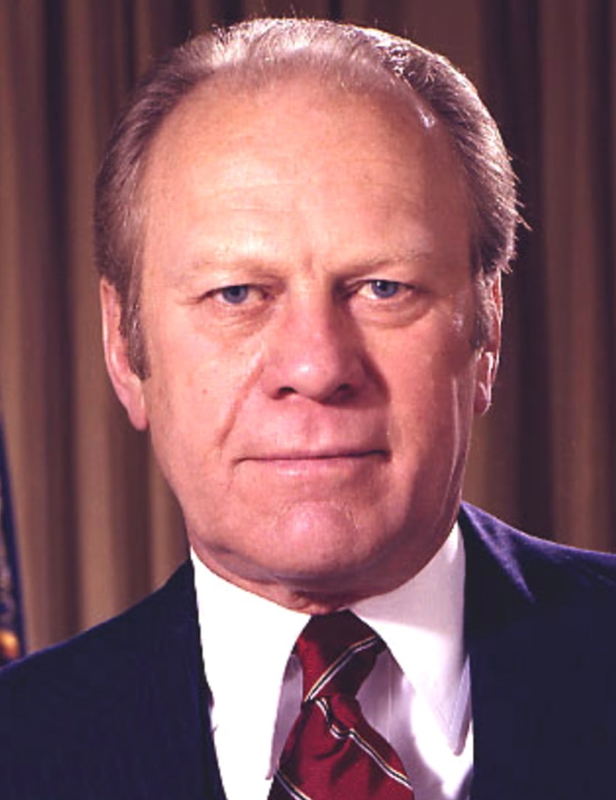 Tragically, it would be Ford who would have to watch things dissolve in
every way possible in Vietnam – and then Cambodia – and be able to do
absolutely nothing about it ... because the American position in that
part of the world had been so badly compromised by Congress's
"anti-imperialist" measures, initially designed merely to undercut
Nixon (and the American presidency).
Tragically, it would be Ford who would have to watch things dissolve in
every way possible in Vietnam – and then Cambodia – and be able to do
absolutely nothing about it ... because the American position in that
part of the world had been so badly compromised by Congress's
"anti-imperialist" measures, initially designed merely to undercut
Nixon (and the American presidency).
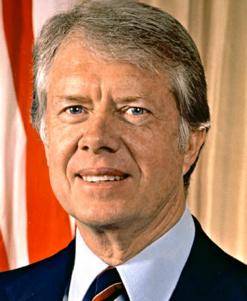 And
it would be Carter, whose back and forth pressure – then support – of
the Shah of Iran would throw Iran into such confusion that it collapsed
the American ally ... and brought to power in that country an intensely
Islamic regime dedicated to undoing all Westernization in Iran (and the
rest of the Middle East if possible) – and bring "death to the Great
Satan America." And the collapse of Iran's oil market also helped
throw the West into a deep economic depression, one not seen in
Europe since the immediate post-World-War-Two period (1947-1952) or in
America since the 1930s.
And
it would be Carter, whose back and forth pressure – then support – of
the Shah of Iran would throw Iran into such confusion that it collapsed
the American ally ... and brought to power in that country an intensely
Islamic regime dedicated to undoing all Westernization in Iran (and the
rest of the Middle East if possible) – and bring "death to the Great
Satan America." And the collapse of Iran's oil market also helped
throw the West into a deep economic depression, one not seen in
Europe since the immediate post-World-War-Two period (1947-1952) or in
America since the 1930s.
The term "helped" is important to note because
part of that economic collapse resulted not just from the Iranian
crisis, but because of a "monetarist" strategy put into effect by Paul
Volcker's Federal Reserve Board ... which raised interest rates so high
(22% at one point) that it made the financing of everything from car
loans, to home mortgages, to industrial startups, to corporate
operations, virtually impossible. The strategy was supposedly
designed to curb inflation. In fact it merely produced economic
stagnation ... while actually increasing
inflation. In order to stay in business, a company was forced to
increase product pricing to cover the huge hike in its production costs
... caused by the high interest rates Volcker put into effect. Thus
stagnation plus inflation became termed "stagflation"! And
stagflation would ultimately make Carter's presidency a single-term
phenomenon.
The nation's spiritual depression.
1976 was the year of the nation's bi-centennial and thus
supposedly a time of great celebration of the nation's development and
accomplishments over those two centuries. But actually America
was not in much of a mood to celebrate (the collapse in Southeast Asia
had hit the American spirit hard).
Then in 1979 came the Iranian collapse, followed by economic collapse in America, only worsening things deeply.
But there were also deep cultural-moral changes – and thus spiritual
changes – going on in America at the same time. The Boomers had
come to full adulthood. And with that development came the idea of
personal interests rather than social interests as being the primary
focus in life. This new cultural mood registered itself in the
way Boomers focused on profession rather than family as the primary
ambition in life; in the sudden rise of the divorce rate; in the rise
in the rate of (newly legal) abortion of unwanted babies; in the
unrestricted sexual interests of the Boomers, ones headed in all sorts
of directions. But most tellingly, this deep cultural-moral
change registered itself in the rapid decline of the long-standing
Christian churches or denominations, ones that had carried the country
forward since the country's founding in the early 1600s.
Huge social change was underway – change in which
the very idea of society itself was belittled in favor of the "rights
of the individual" – a prevailing attitude among Boomers which moved virtually in opposition to society
and its needs. This was definitely a "Fourth Generation"
development ... not a good sign for America.
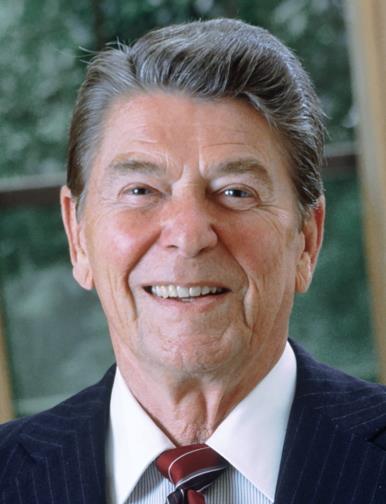 But the Vet generation would have one last hurrah before national life
was turned over to the Boomers. In 1981 former movie star, but
also former two-term California governor, Ronald Regan would put muscle
back in the White House, in taking on the challenges facing America
both at home and abroad. By taking a tough stance against the
Cold War rival Soviet Russia, he not only revitalized the Vet's
patriotic spirit ... he started the breakup of the Soviet Empire – and
Russia's step back from Communism.
But the Vet generation would have one last hurrah before national life
was turned over to the Boomers. In 1981 former movie star, but
also former two-term California governor, Ronald Regan would put muscle
back in the White House, in taking on the challenges facing America
both at home and abroad. By taking a tough stance against the
Cold War rival Soviet Russia, he not only revitalized the Vet's
patriotic spirit ... he started the breakup of the Soviet Empire – and
Russia's step back from Communism.
He could be bold ... in taking on a major American
professional union when it wanted to start up a new round of
inflationary wage increases – or in sending American soldiers to a
Caribbean island to restore its elected government (thus preventing it
from falling under Soviet influence). But he could be cautious
... in withdrawing American troops from Lebanon (placed there to
support United Nations' peacekeeping operations in that country) when
it became apparent that local political dynamics in no way supported
this American effort to be helpful to that country. Under Reagan,
there was going to be no repeat of a Vietnam dynamic of endless
military efforts to fix a largely social-cultural crisis.
And he could be subtle ... in supporting Afghan
mujahedin (Muslim warriors) by sending them sophisticated weapons to
fight off Soviet efforts to extend the Soviet Empire into their
country. And also, through this support, block Soviet
Russia's efforts to position itself strategically near the top of the
Arabian Sea – through which the vital flow of oil out of the Middle
East to the West occurred. Reagan was simply not going to let
this happen.
But also, this American support of the mujahedin
was instrumental in exhausting both the material and spiritual energies
of the Soviet Empire itself ... playing a key part in its decline and
collapse. And by doing this, this helped enormously, on the other
hand, to restore the material and spiritual energies of America!
Reagan thus found himself putting the country back in the
business of being a global superpower.
Congress was not happy about all this Reagan
success – and brought out the impeachment weapon again in an effort
(the Iran-Contra Affair) to do to Reagan what the "anti-imperialist"
Democratic Party had done to Nixon. But it became quickly
apparent that the voting public was not in the mood for another
presidential lynching. Thus Congress backed down – after a rather
lame investigation report on the affair was published. Everyone
then moved on to other matters.
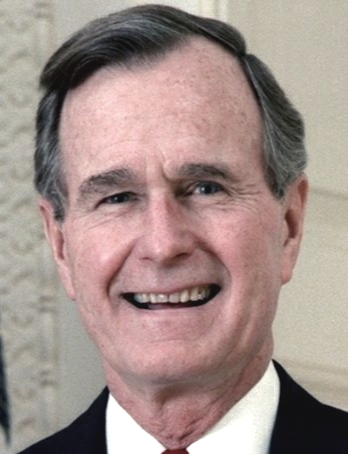 Reagan's Vice President George Bush, Sr. was easily voted into office
after Reagan finished his two terms. Americans expected – and
received – a continuation of the Reagan agenda under Bush. Big in
this matter was the final collapse of the Soviet empire in 1989 and
then the disintegration of the Soviet Union itself immediately
thereafter (1989-1991). Bush was not responsible for this
development (Reagan actually got the ball rolling on this development),
but Bush certainly gave cautious leadership to America during those
times of great change in the Russian world.
Reagan's Vice President George Bush, Sr. was easily voted into office
after Reagan finished his two terms. Americans expected – and
received – a continuation of the Reagan agenda under Bush. Big in
this matter was the final collapse of the Soviet empire in 1989 and
then the disintegration of the Soviet Union itself immediately
thereafter (1989-1991). Bush was not responsible for this
development (Reagan actually got the ball rolling on this development),
but Bush certainly gave cautious leadership to America during those
times of great change in the Russian world.
The same held true for Communist China, which had
actually been opening itself to Western (capitalist) ways, in a gradual
process starting all the way back in Nixon's days, which picked up in
Carter's days, and during the entire Reagan period had been advancing
greatly in that agenda under China's leader Deng Xiaoping. But
masses of Chinese students had supposed that the residue of Chinese
Communism was about to experience the same fate as what was happening
in Russia. But Deng was not willing to go that far – and crushed
brutally the huge protest movement staged at Tiananmen Square in
Beijing (1989). Bush voiced outrage over the event – but then
quickly moved on to continue working with Deng and his reforms (coming
under new Chinese leadership in the meantime, although the Chinese
agenda remained unchanged).
It was over the confusing ambitions of Iraqi
President Saddam Hussein, who thought he was merely laying ancient
Iraqi claims of control over British-created Kuwait, that Bush showed
himself to be an excellent diplomatic-military strategist. Such
control over Kuwaiti (and possibly the Saudi) oil would have made Iraq
a dictator of oil pricing and flow – something that Bush (and virtually
every other world leader) was not about to let happen. Bush moved
American military (in alliance with many other countries' militaries)
into Kuwait, to throw Saddam out of Kuwait. Beyond that, he had
no interest in going further against the Iraqi dictator, because to
invade Iraq in order to do what Americans like to call
"nation-building" would simply have produced another Vietnam, a
social-cultural "quagmire" – as Bush's Secretary of Defense Dick Cheney
would come to term the matter.
American cultural traditions continue to be toppled.
Meanwhile, on the home front, social-cultural changes taking
place in America – ones reaching back to the days of Johnson, but
accelerating during the 1970s – continued to develop further during the
Reagan-Bush 1980s. Feminism gathered momentum as it took the
position that men were to be viewed as adversaries rather than as
companions (not exactly an idea in strong support of the traditional
institution of marriage, which was also losing ground in America).
And homosexuals, suffering a rampant disease caused by indiscriminate sexual activity, became a new "victim group" needing special social-political and even moral support.
At the same time, traditional Christian denominations
continued their decline ... and an effort by Reagan to get an amendment
to the Constitution permitting prayer in public schools fared no better
than similar efforts back in the 1960s.
Evangelical and "independent/non-denominational"
Christianity however seemed to be growing – although again, not at the
same rate as the decline of the old denominations. As a big
factor in their success, evangelicals were utilizing the powers of
television to reach much of their growing "congregations." But a
great danger accompanied this new development: the personal lives of
newly celebrity preachers became quite public ... and then very
embarrassing when some of these preachers were discovered to have
fallen before the temptations of money and sex. This certainly
crippled some of the "televangelist" momentum, though not fully.
Evangelical Christianity would continue to grow, however – though
more cautiously, and more locally than nationally.
Meanwhile the moral-spiritual contest between the
traditional Christian world and the rising Secular or Humanist world
merely intensified. Supposedly science had completely validated
Darwinism: life proceeded forward from simplicity to complexity only
through the natural competition of all creatures for their own survival
and success. In short, all life – even creation itself – resulted
from a purely mechanical or "Secular" process. There was no
"Higher Hand" ("God" to the Christians) that directed any of this
process.
Christians, of course, went at life from a
different dynamic, seeing beyond and above life's "mechanics" a much
higher world, of which the physical world around them was merely a
by-product of that higher world. That is to say, the world as we
know it came from Creation's own "Intelligent Design."
Actually, the scientific world of physics and
chemistry itself witnesses not to Darwinian randomness but instead to
incredible precision in design, such that could not have just evolved
haphazardly into existence ... but was clearly laid out intelligently
at the very foundation of the universe. Even secular scientists
(the vast majority of the scientific community) had to admit that the
laws of physics and chemistry were fully in place – in all their
sophistication – at the very startup of existence itself. Those
basic laws of science did not just stumble into existence or develop
haphazardly over the eons in a Darwinian fashion. True, we are
just now getting around to understanding those laws. But they
have always been there, already in place – long before we "discovered"
them.
This certainly gave evidence in favor of
"Intelligent Design" (ID) to all of Creation itself. And where
did such ID come from? For Christians that was an easy question to
answer. For Secularists, despite efforts to come up with their
own atheistic explanations, they never could find a good response.
But that did not stop the Supreme Court in its
march down the Secularist road, striving to make the Darwinist religion
the only one allowed to be taught in America's public schools. In
a 7-2 decision in the Edwards v. Aguillard
(1987) case, the Supreme Court ruled as "unconstitutional" (and thus
highly illegal) a Louisiana law calling for the presentation of a
"creationist" explanation of life (the Christian understanding) right
alongside the Darwinist approach, which Secularists (including the
Supreme Court) had previously forced on America's public schools.
According to the Court it was constitutionally illegal to
"advance religion" (unless that religion happened to be
Secular-Humanism, of course!). Thus it was that Secularists were
able to tighten even further the restrictions against any teaching of
America's traditional Christian worldview (a long-held worldview that
had actually carried the nation to greatness). America's rising generations were to be
taught "Reality" only from an atheistic perspective – exactly as the
Supreme Court itself dictated.
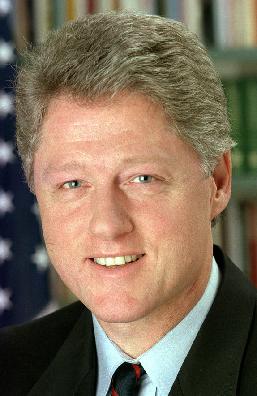 Clinton (1993-2001).
With Bill Clinton's arrival in the White House, the Boomers had
their first champion in place at the head of the nation. And at
first he would fit perfectly into that Boomer mindset .. until things
did not immediately work out for him and he backed away from that
mindset – and took on attitudes that made him look like a very strong
continuation of the Reagan-Bush legacy. Perhaps it was his
Georgetown education ... or perhaps because he went through a similar
process as Arkansas governor, of being the Boomer "progressive" forced
ultimately to listen to the more conservative voice of the Arkansas
voters if he were to remain in office. In any case, ultimately,
in Clinton, America had another "Realist" in office.
Clinton (1993-2001).
With Bill Clinton's arrival in the White House, the Boomers had
their first champion in place at the head of the nation. And at
first he would fit perfectly into that Boomer mindset .. until things
did not immediately work out for him and he backed away from that
mindset – and took on attitudes that made him look like a very strong
continuation of the Reagan-Bush legacy. Perhaps it was his
Georgetown education ... or perhaps because he went through a similar
process as Arkansas governor, of being the Boomer "progressive" forced
ultimately to listen to the more conservative voice of the Arkansas
voters if he were to remain in office. In any case, ultimately,
in Clinton, America had another "Realist" in office.
No doubt a big part of his "move to Realism" came
with the failure to put through a program of a federal national health
care ... and the failure to get a "progressive" opening of the ranks of
the military to visibly active homosexuals. The health care
program went nowhere when the medical and insurance community lined up
strongly against it ... and Clinton had to agree to a compromise on the
homosexual issue with "don't ask, don't tell" – pretty much the policy
it had always been in the military (keep such behavior hidden away).
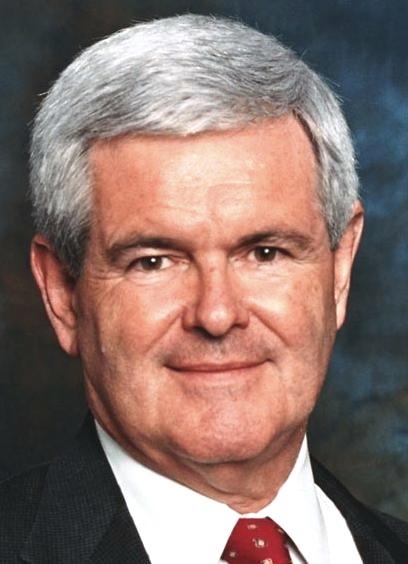 But a big part of Clinton's political shift came from the challenge
posed by Republican Congressional leader Newt Gingrich, who conducted a
complete Republican "revolution" in Congress in 1994 – in support of
his "Contract with America" program. Basically Gingrich called
for a number of typically Republican policies concerning the slow-up of
federal spending, the cutback in federal programming, the reduction of
federal taxes – in short, the reduction in the size and weight of the
federal government.
But a big part of Clinton's political shift came from the challenge
posed by Republican Congressional leader Newt Gingrich, who conducted a
complete Republican "revolution" in Congress in 1994 – in support of
his "Contract with America" program. Basically Gingrich called
for a number of typically Republican policies concerning the slow-up of
federal spending, the cutback in federal programming, the reduction of
federal taxes – in short, the reduction in the size and weight of the
federal government.
A battle between the two, Clinton and Gingrich, at
first developed over the matter of the federal budget, with neither
willing to back down – and a shutdown of the federal government
resulting, which the national press (now nearly completely in the hands
of Boomers and other "Liberals") casting the intractable Gingrich as
the villain and the equally intractable Clinton as the hero ... a
position that the press would never veer from during the remaining
Clinton-Gingrich years (1995-2001)! In any case, in the end,
Clinton agreed (even announced himself as the champion of this policy
itself) of moving to put federal operations on more conservative
foundations ... actually – in cooperation with Gingrich's Republican
Congress – reducing the size of the national debt!
But it was in the area of foreign affairs that
Clinton really stood out as an old-fashioned "Realist" ... much like
Reagan and Bush before him. As with Reagan in his early years,
Clinton experienced a sharp setback when he answered the United
Nations' call for assistance in Somalia – only to find that the Somali
political lords were not going to cooperate, and like Reagan, decided
that the better part of wisdom was to pull his troops out and go home –
something that Johnson was totally unable to do. That was very
wise on Clinton's part and well appreciated by Americans.
Likewise he withstood the attack of Liberals who waxed indignant
when he refused to send troops to Rwanda to intervene in the very, very
bloody civil war going on there.
However he was swift to act (like Reagan) to send
troops to a Caribbean country (Haiti) when the elected government was
overthrown ... forcing the new Haitian military lords to restore the
elected government. And he cautiously (as Bush, working only in
conjunction with a grand international coalition) used American air
(some ground as well) power to force the Serbian government from
continuing its program of ethnic cleansing in neighboring Bosnia.
And he would be called on to do the same when the Serbs then
turned their wrath on their Kosovar neighbors ... again forcing the
Serbs to back off and agree to respect the independence of their
neighbors. Clinton looked truly like the great leader of a
superpower nation.
And Clinton would end his years in the White House
fending off a Republican effort to use the now-common impeachment
weapon against a popular president, when Clinton was revealed to have,
over the years, had a long line of extramarital affairs, including a
young White House intern (unfortunately not an uncommon program in
Washington – and elsewhere in the high-status world). Ironically,
the effort blew up in the face of the Republicans – who succeeded in
gaining only a 50-50 conviction vote in the Senate, despite the
Republican majority there. And the matter backfired on Gingrich,
when it was revealed that he was engaged in similar activity at the
same time. In the end, the Republicans suffered a significant
electoral loss in 1998 from this misadventure, and Gingrich simply
vacated his position in Congress ... but then began down a long road of
personal spiritual development – still exercising strong national
influence outside the halls of Congress, but now on behalf of a clearly
Christian agenda. And Clinton would leave the White House
with one of the most favorable ratings of any president at that point
in his career. It's amazing how these things work out!
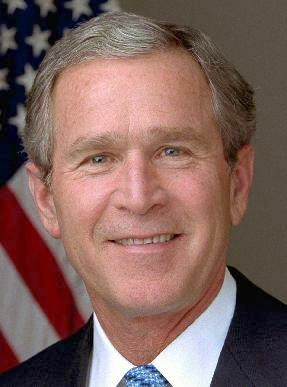 Bush, Jr. – the true Boomer president.
Whereas Clinton, early in his first years in office, backed away
from his Boomer agenda when he saw where it was taking him, the second
Bush president (son of the first Bush) did not. He seemed totally
unable to see past some kind of Boomer idealism. And he would,
like Johnson, get actively involved in the kinds of "nation-building"
that he had accused his Democratic Party opponent Al Gore in the 2000
presidential election of having practiced (which actually Clinton and
his Vice President Gore did very little of during their previous eight
years in power). Bush, Jr. would try to remake both Afghanistan
and Iraq – at an enormous cost in men, matériel and money. And he
did so without any serious understanding of both the complex uses – and
serious limitations – of power, especially in a social setting so very
different from America's. Consequently a grand disaster for
America was the only result he gained from the effort – just like
Johnson in Vietnam.
Bush, Jr. – the true Boomer president.
Whereas Clinton, early in his first years in office, backed away
from his Boomer agenda when he saw where it was taking him, the second
Bush president (son of the first Bush) did not. He seemed totally
unable to see past some kind of Boomer idealism. And he would,
like Johnson, get actively involved in the kinds of "nation-building"
that he had accused his Democratic Party opponent Al Gore in the 2000
presidential election of having practiced (which actually Clinton and
his Vice President Gore did very little of during their previous eight
years in power). Bush, Jr. would try to remake both Afghanistan
and Iraq – at an enormous cost in men, matériel and money. And he
did so without any serious understanding of both the complex uses – and
serious limitations – of power, especially in a social setting so very
different from America's. Consequently a grand disaster for
America was the only result he gained from the effort – just like
Johnson in Vietnam.
And he would double the national debt – one that
Clinton and Gingrich had worked so hard to reduce – raising it from $5
trillion to $10 trillion in his eight years in office. And he
would also leave the economy in a complete state of shambles – due to
his very unwise messing with the federal rules and regulations that had
helped guide the national economy since its crawl out of the 1930s
Great Depression. Ultimately a collapsed world of American
finance and business had to be bailed out at a huge expense by direct
federal financial intervention – a major no-no in the Republican
playbook. But whether Bush was much of a Republican or not never
seemed to matter. He was after all, as a Boomer, a practitioner
of "compassionate conservatism" – whatever that meant.
To a Boomer, social rules were entirely flexible –
and could come to stand for "whatever" a Boomer might wish them to
stand for ... as the need arose! In short there were no social
rules to go by, at least ones observed by the Boomers ... just strongly
held opinions instead.
And the Boomers would specialize in that approach
to things, making even the national news services merely sounding
boards for one or another Boomer opinion. And they would do it 24 hours
a day, seven days a week. It was entertaining after all.
But it was a far cry from the types of news service that the old
grey Lady, the New York Times or the Washington establishment's Washington Post,
or the CBS evening news by Walter Cronkite or NBC's Chet Huntley and
David Brinkley used to offer. Instead it was Boomer opinion,
opinion, opinion ... all day and all night long! Under Boomer
culture, truth and opinion had become one and the same!
Anyway Bush, Jr. started off his presidency with a
strong federal push into the field of national education (a very
non-Republican program!), putting the states under the federal mandate
system (money offered states to put them in compliance with federal
policy) to undertake a select federal testing program supposedly
crucial in improving the level of the nation's education (Bush seemed
to have no understanding that there are many other factors that go into
successful educational programming).
But he didn't get far with his "No Child Left
Behind" program ... when a group of Muslim crazies decided to destroy
key American symbols: the New York Twin Towers, the Pentagon, and
possibly either the White House or the Capitol Building. America
was shocked. So was the world (although many in the Muslim world
thought that this was a perfectly wonderful event!). But from
September 11th on (9/11) priorities would shift dramatically for
America. The hunt for the perpetrators (Osama bin Laden's
al-Qaeda group) would supposedly at this point become the major
preoccupation of the Bush Administration.
... Well almost. Actually Bush became
greatly distracted from this hunt when he decided not merely to go
after al-Qaeda camps in Afghanistan – but to remake Afghanistan in the
process (Bush's first plunge into "nation-building"). He did so
in the name of his new "Bush Doctrine," which stated that any country
that harbored al-Qaeda would find itself on the American enemy list ...
and that America would go after any al-Qaeda operations occurring in
any country, whether that country liked it or not.
Actually those were bold – but meaningless – words
because the one country which hosted the bulk of al-Qaeda's training
sites (and which bin Laden soon escaped to) was Pakistan. That
was one country Bush dared not touch, not only because it was a
quasi-ally but because it was also a nuclear-armed country. So
the Bush Doctrine did not actually apply in the one country where most
of al-Qaeda's activities actually took place! Ironic ... or just
ignorant on the part of Bush?
Iraq. Anyway, Bush got this
burning desire to prove himself further (things were not going all that
well in Afghanistan) by taking out Iraq's dictator. In short, he
planned to go further than his father in doing "the right thing" ...
what, to prove himself to be an even greater person that his father who
had "failed" to do that? First of all, Bush tried very hard to
connect Saddam to 9/11. But no one outside his cabinet circle of
the "willing" bought that idea (as well as some even inside his
circle). Then he tried to tie Saddam to the illegal manufacture
of "weapons of mass destruction" (WMDs). But here too he could
not find evidence convincing enough to bring the rest of the world
(except Britain – which would pay a huge political price for joining
Bush in this act of folly) in support of his "get-Saddam" program.
Ultimately he simply went ahead anyway, and in March of 2003
unleashed hell and fury on Iraq ... plunging America even more deeply
into the "quagmire" of Iraqi nation-building. It was Vietnam all
over again. And his chief counselor, Vice President Cheney, knew
better (having already admitted to do so would be to fall into a
quagmire!). But Cheney was serving a different president! Ah
politics!
And once inside of Iraq (with Saddam nowhere to be
found) America then proceeded to do the stupidest things, the new
American administrator Jerry Bremer forbidding anyone connected with
Saddam's old Ba'athist Party from continuing their work in the system
(virtually every professional in the country, doctors, professors,
engineers, etc.). They would now be unemployed. But who
then would keep Iraqi society moving ahead? At the same time
Bremer went on to fire all the Iraqi soldiers (who had been working
with the US military in keeping some semblance of order), at that point
creating massive unemployment among hundreds of thousands of young men
with guns – who knew how to use them.
At this point the American occupiers found
themselves under attack from all sides (and almost all of the American
military command in Iraq decided to "retire"!). Even the Shiites,
the huge Muslim community that had suffered under Saddam and the Muslim
Sunnis, attacked the Americans, hoping now to seize control of the
highly confused country.
Americans finally got an Iraqi constitution
written and elections held. But the American troops could not go
home ... because all of this "democracy" merely gave each of the
hostile Iraqi subgroups the opportunity to go at each other. Thus
under "democracy," the violence simply got worse.
Bush finally figured out the problem and sent more
troops to Iraq to go after the Iraqi warriors (Bush's military
"surge"), which did settle things down a bit ... just before Bush
finished his last months in the White House ... and just as the
American economy found itself collapsing everywhere.
The Christian worldview under further attack.
Meanwhile, the assault on America's traditional (Christian)
social-intellectual-moral standards did not slow up any during the Bush
years. The undercutting of the Christian worldview – making it
highly illegal to pass that on to America's rising generation of youth
through the normal educational process (public education) – was
strongly underscored in the 2005 Kitzmiller v. Dover Area School District
case. A short four-paragraph statement the Dover School Board
wanted to be read at the beginning of the school year – inviting the
students to look, on their own, beyond the Darwinist perspective – was
challenged in a federal district court, and decreed by the federal
judge to be in total violation of the nation's laws. The judge
imposed a $1 million dollar fine on the school board – to make it very
clear that the Darwinist alternative ("Intelligent Design") was so
illegal that it could not even be brought up for consideration in the
training of the rising generation. And once again, it was the
American Civil Liberties Union (ACLU) that served as one of the major
plaintiffs, making it clear that "civil liberties" did not include any
discussion or even consideration whatsoever of this all-important
worldview issue.
Economic catastrophe. Sadly, the
great economic expansion that had occurred during the Clinton years
ground to a halt in the Bush, Jr. years. And Bush got the bright
idea of removing some of the long-standing investment restraints,
hoping to kick-start the economy again – and getting the Federal
Reserve to lower interest rates down to even under 1% (a far cry from
Volcker's 22%!). All of this did re-energize the economy ... sort
of. But mostly this "freeing up" of the investment world created
a huge bubble of financial speculation, most notably in the housing
market – as bank loans were now fantastically cheaper, and no longer
under the old restrictions that required a borrower to be able to
demonstrate some degree of ability to repay the loans (that's why they
were classed as "subprime" mortgages).
What instead was now driving the financial world
was the mania of speculation ... people buying houses they could not
afford, afraid that if they waited any further they would never be able
to buy a house – but also going ahead on this matter with the
understanding that if they could not continue to meet bank payments,
they could always sell their houses in a rising housing market – and at
least come away with a profit in the process. But that's just
pure speculation.
But thus it was that America headed into the same
wildly speculative conditions that had prevailed in late 1920s America
... and ultimately suffered the same consequences when the speculative
bubble burst and the whole thing came crashing down.
It all started with the mania of contractors
jumping into the home-construction industry, with the expectations to
come away with huge profits ... only finding after a while that they had
built more houses than what even the bubble could bring remaining
purchasers into. This is called "market saturation." So then
finally to move housing inventory from a new standstill, they would
have to lower their prices ... again, and again. Suddenly the
value of the housing market fell away – now in a panic mode – to a
point where house values now found themselves way below the level that
the banks had invested in such property (home loans to customers).
And there was no way the banks were going to get their
investments back. Owners could no longer sell the houses anywhere
near the value of the mortgages ... and simply walked away from these
obligations, leaving the banks holding abandoned homes – ones that now
the banks had no way to sell off either. At this point banks
began to fail ... multitudes of banks, and big banks, even the biggest
of the big, most notably the biggest holders of home mortgages, Fannie
Mae and Freddie Mac (actually "private" mortgage companies set up by
the federal government to ensure that mortgages would always be
available to the American citizenry). Then the major Wall Street
companies began to tumble – such as Lehman Brothers, which collapsed
completely. And the automobile manufactures were likewise hit –
because, despite the low interest rates on car loans, American
customers were feeling the deep economic pinch personally, and just
held off buying that new model they had been looking at. Now the
"Big Three" auto companies, Ford, General Motors and Chrysler also
found themselves in deep trouble.
At this point Bush got a terrified Congress to
vote funds for a federal "buyout" of troubled companies, going against
everything his Republican Party stood for. But at this point
there seemed to be no alternative path to saving the American economy
from complete collapse.
And thus it was that Bush
Jr. finished out the last few months of his eight years in the White
House ... leaving behind him a huge mess for his successor to deal with
– both at home and abroad.
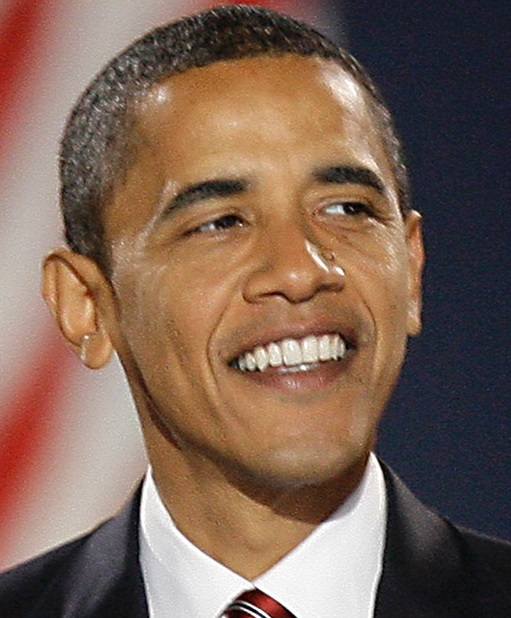 In the November 2008 national elections, the Republicans, being the
party in power – and identified as the president's party (which it
really was not) – took a major thrashing. The Democrats reaped a
huge Congressional victory ... as well as bring to the White House a
young "Gen Xer," Barak Obama, who would undertake to "change"
(dismantle) everything possible about Middle-American society and the
way it had long worked.
In the November 2008 national elections, the Republicans, being the
party in power – and identified as the president's party (which it
really was not) – took a major thrashing. The Democrats reaped a
huge Congressional victory ... as well as bring to the White House a
young "Gen Xer," Barak Obama, who would undertake to "change"
(dismantle) everything possible about Middle-American society and the
way it had long worked.
"Generation-X." In so many ways
Obama was very representative of his (Gen-X) generation: divorced
parents (married only a couple of years) and being raised in a "family"
largely devoid of male guidance (his grandfather helped somewhat).
On top of that he was bi-racial – raised by a White mother and
grandmother but ultimately (in his college years) coming to identify
himself as "Black" ... and idealizing an African father that he
actually never knew. And choosing to see himself as belonging in
America's "minority" category as he advanced professionally in the
world of social dynamics, he would form strong political-moral
alliances with the other major "minority" groups in America, groups who
actually shared very little in common ... except that they were
strongly determined to join forces in order to bring down "majority"
Middle America any way they could.
Thus it was that Obama would take the country back
to the condition it found itself in during the late 1960s – when
Johnson also tried to remake American society along newer, supposedly
more "progressive" lines ... and succeeded only in leaving behind him a
thoroughly confused and angry society.
"Change" at home. In dealing
with the huge economic mess left behind by the Bush Jr. world, Obama
immediately took the country in his new direction of "change" – not
just lending to troubled companies as Bush had done, but requiring
their reorganization (such as bankrupt Chrysler) and reassignment of
ownership (stocks and shares) not only to companies invited to come in
and take gradual ownership of the companies, but also in redistributing
a good portion of that ownership to his Labor supporters – leaving the
previous owners completely out of the deal. They lost everything
(that included a lot of "majority" Middle Class American families who
had invested in those companies through the American stock market).
Then he quickly tried to move to full government
health coverage (something Hillary had not been able to carry off
successfully when her husband was first president). Ultimately he had
to back down a bit and offer partial government programming of
America's health industry. In the end, health care would be
subsidized for the poor by taking on massive government debt (in his
eight years in office Obama would also double the federal debt, from
$10 trillion to over $20 trillion!). The health insurance marketplace was placed under a number of government restrictions ... and
almost immediately the health insurance premiums paid by working Middle
Class families jumped terribly, doubling once – and then once again.
Much of the cost of health care had been simply shifted to
"majority" America as Obama took care of America's minorities.
Many Americans were very unhappy, but there was little they could
do at the time with a strong Democratic Party control of Congress.
But in the next round of Congressional elections
(November 2010) the American voters overturned dramatically this
Democratic Party position in the House (and reduced significantly the
Party's position in the Senate).
But before this new Republican Party majority
could be seated in January, Obama moved quickly to throw favors to
another of his supporting "minorities" ... the gay community. He
simply used the "lame duck" Congress (full of Democrats just voted out
of power) to approve the removal of restrictions against active
homosexuality in the military – in other words, moved swiftly to
overturn the "Don't Ask, Don't Tell" legislation put in place back in
1994. With this move, the open practice of homosexuality would no
longer face any restrictions. Indeed, soon this pro-homosexuality
trend would even go so far as to make any opposition to homosexuality
now itself a hate crime, one deeply punishable under Obama's 2009 law.
And when Obama appointed two unmarried/childless
women to the Supreme Court, this clearly pointed to a future weakening
of the political-cultural position of the traditional American family –
not only the mainstay of Middle America, but of all America since its
very founding four centuries earlier. Thus the Defense of
Marriage Act (DOMA) – passed by a huge majority in both houses of
Congress in 1996 and signed into law by President Clinton – was now
clearly destined for a typical Supreme Court rewriting of the nation's
most important social-legal standard since the passing of the laws
ending slavery in the country in the 1860s. Indeed, by two narrow
votes of five against four Supreme Court justices – the two new female
appointees forming part of the tiny majority – DOMA was undercut in the
2013 United States v. Windsor case ... and then completely set aside in the 2015 Obergefell v. Hodges case.
The very idea of a compelling social standard – one passed by Congress
in order to affirm that the traditional family, headed by a married man
and woman, was to remain the social mainstay of American society – had
fallen victim to the Boomer (and Gen-X) logic which affirms that real
"freedom" comes from having no social standards whatsoever (except the
one absolute standard, which is to not have any standards!). And
the Boomers (joined by the Gen-Xers) had the Supreme Court, as always,
to legislate that perspective into law by fiat and decree – something
that otherwise would have never had a chance of coming into being
through the more democratic process of a vote in Congress by the
representatives of the American people themselves.
But the attack on traditional marriage did not
stop there. In 2015 an Oregon administrative court imposed a
$135,000 fine on a couple owning a small bakery ... when that couple
answered the request of a (regular) customer by confessing that they,
by all Christian conscience, could not bake her and her female partner
a wedding cake. She would have to go elsewhere for that.
The woman then sued, won the decision, and destroyed the bakery
... citing her own hurt feelings over being "discriminated" against.
The ultimate point of the Oregon public authorities was that it
was a grand offense to fail to adjust to the new sexual standards that
the Supreme Court itself was directing the country toward. There
now could be no discussion, no debate, no opposition on this matter.
And backing up this new sense of "justice" was ruinous punishment
for anyone not in step with the new morality.
Then the American police force (supposedly
representative only of "majority" America) came under attack, even at
times from the Obama White House itself ... as in the Ferguson Missouri
incident. This event needlessly turned very ugly ... in some part
due to Obama's own intervention. The president himself came out
publicly against the policeman involved – before any actual evidence
was looked into ... playing on the racial sensitivities of those
involved – as well as the nation itself.
American police, of course, have long been busy simply
trying to hold together local communities, ones that seemingly find
themselves dangerously close to being swallowed up by criminal gangs
and drug addiction ... communities that seem to have no ability to
support themselves (too much dependence on support and management by
political officialdom). Tragically, these communities seem to
lack skilled political and cultural leadership of their own, leaders
able to direct these communities to authentic social self-deliverance.
Instead, it simply has been a whole lot easier for local (and
national) leaders to turn the people's frustration on the police ... in
anger over the violence that plagues life in these communities.
"Progressive" Moral idealism abroad.
In the field of foreign policy, Obama would also run his foreign
policy along political-social-cultural lines calling for "change" ...
change directed abroad against various dictatorships. In this he
was merely following the program of "nation-building" that had so
engrossed the Bush Jr. Administration before him ... in fact also the
Johnson presidency (1963-1969) and the Woodrow Wilson presidency
(1913-1921) even before that. And the results would consistently
turn out to be the same. "Progress" abroad was viewed as a matter
of taking down dictators – with the full expectation that this would
automatically open the doors for a newly "liberated" people then to
come to full democracy. But of course, horribly disappointing
results were guaranteed to happen. But "progress" never pays much
attention to the historical record.
Thus Obama would join Europe in taking down the
Libyan dictator Gaddafi. This would (unsurprisingly) throw Libya
into a state of very bloody civil war – not blissful democracy.
And the situation for Obama would look even more scandalous when,
a year later, the American Ambassador to Libya was himself (and other
Americans) killed – by militants claiming to represent the side of the
Libyan civil war that America and the Europeans had been supporting.
Ironic ... and tragic.
And Obama would attempt to do the same
"democratizing" with respect to the autocratic Syrian president Assad.
Syria, like Libya and many other Middle Eastern societies was
experiencing the violence of the "Arab Spring" (2011), that is, had
fallen into in a state of civil war as newly "freed" Syrian sectarian
groups set out to destroy each other. In watching Assad attempt
to bring Syria back under order, Obama threatened Assad that if he
should use any illegal weapons in his efforts, Assad would have to deal
with harsh American consequences. But when Assad employed those
weapons anyway, it became obvious that Obama's threats were entirely
empty. Obama then shifted assistance to one of the Syrian groups
trying to take advantage politically of the social chaos.
Ultimately Obama's Syrian policy not only failed to bring Assad
under some kind of American moral direction, it helped greatly to push
Syria ever-deeper into its horrible condition of very, very bloody
civil war.
Then Obama's humiliation was heightened when his
new "friend," Russian President Putin, offered to come in and
straighten up Obama's diplomatic mess. As it turned out, Putin's
intervention was actually designed to put Russia in a position of
strong influence in Syria – and the Eastern Mediterranean region ... at
the same time that Obama's intervention had d reduced greatly American
influence in Syria – and undermined it deeply in the rest of the
region.
In watching Obama waxing indignant over Assad's
measures to force Syria back into order, I wondered what Obama might
have thought about the horrible things that Lincoln was required to do
to similarly force American society back into a unified social order
(minus slavery). Clearly Obama (like so many Americans) really
did not understand social power – its messiness, but also its absolute
necessity.
That same lack of understanding of international
power politics showed up in Obama's non-response, when Chinese dictator
Xi Jinping moved to claim as "Chinese territory" the international
waters of the South China Sea (bordering on numerous East Asian
countries – nations totally dependent on the free access of their
commercial fleets through that strategic body of water. Obama did
nothing. [How about building an American naval air station on a dredged
island – one close to the dredged island that China had just created in
order to enforce its claim?]. Nothing – absolutely nothing of any
real significance – came from Obama in his response to Xi's bold and
highly strategic advance in East Asia.
And the same thing occurred when Putin's "little
green men" (Russian military with no identifying items on them) grabbed
the strategic Sevastopol naval air station that was supposed to be
shared with Russia's neighbor Ukraine. Obama threatened and
blustered a lot. But again did nothing of any real consequences
in forcing Putin to undo this aggressive act. Perhaps there was
nothing he could realistically have done to help Ukraine in this
matter. But then better not to have threatened and blustered in
the first place. Appearances matter deeply in the world of
international politics. And looking foolish and weak does not
advance anyone's position in the game.
America was not looking much like a superpower any
more. Was this the beginning of America's decline into
insignificance – in following Britain, France, the Dutch, Russia, Spain
and other once-great Western powers into insignificance? China's
dictator Xi certainly believes so. And Putin is more than willing to help in
this American decline. And needless to say, so is much of the
Islamic Middle East.
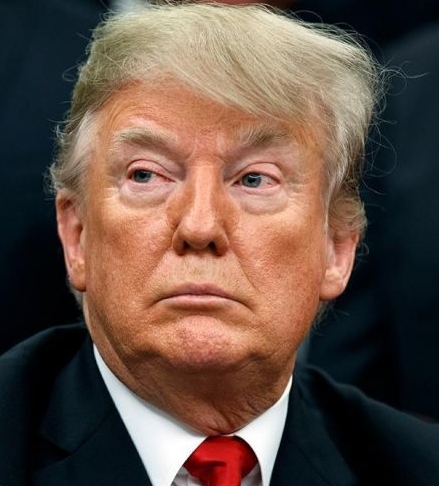 Trump tries to "Make America Great Again."
With Donald Trump's election to the presidency, America was once
again under the leadership of an individual who was very much a Boomer.
[He and the other two Boomer presidents – Bush Jr and Clinton –
were, in fact, all born at about the same time: June, July or August of
1946!] This is to say that, as Boomers, they did not pay much
attention to "group think," but instead shaped their decisions in life
in their own unique or very personal ways. Thus it was hard to
say exactly where they fell on the American political spectrum.
Almost anything was possible coming from them.
Trump tries to "Make America Great Again."
With Donald Trump's election to the presidency, America was once
again under the leadership of an individual who was very much a Boomer.
[He and the other two Boomer presidents – Bush Jr and Clinton –
were, in fact, all born at about the same time: June, July or August of
1946!] This is to say that, as Boomers, they did not pay much
attention to "group think," but instead shaped their decisions in life
in their own unique or very personal ways. Thus it was hard to
say exactly where they fell on the American political spectrum.
Almost anything was possible coming from them.
Much anti-Trump scorn has been heaped on him
because he got a $1 million startup from his father as he set out on
his own to develop his own construction business. But that was a
very small matter in terms of what he was able, over many years of hard
work – and some grand disappointments along the way – to build up into
the $ multi-billion category. In this he was a very strong,
self-made man.
His highly ambitious personality then took him
into the world of entertainment where he hosted (for fourteen seasons
... and while he was still hard at the world of high-level building
construction) a television program involving contestants competing for
the honor of apprenticing with Trump in his various business
enterprises – later changed to charity awards when celebrities became
the contestants. Unfortunately the logo for the show would be the
phrase "you're fired" ... because there was a bit of zealousness in the
way contestants were removed one by one until a winner was finally
selected. This logo would seem to follow Trump right into the
White House.
Having a "White, male, Anglo, straight, Christian"
gain the White House was not what "minority" America was expecting –
and certainly not wanting. Action to have the election nullified
began immediately upon Trump's election. Street protests ("He's
Not My President") broke out not only across America but across the
world. And Democrats in Congress began to talk of impeachment,
even before Trump had a chance to enter the White House.
There was an eerily familiar feel to what was
developing ... for that is how elections are conducted (when conducted
at all) in Third World countries: if you do not like the results of an
election you immediately move to have the results overturned.
This was an entirely new political-cultural development in
America ... demonstrating how far indeed Obama had succeeded in moving
America from its long-standing social-moral order. The "change"
Obama had brought to America was indeed deep – very deep.
But Trump himself was no help in getting America
settled down and moving forward. He seemed to delight in the
ideological battle that now consumed not just Washington but also the
world of 24-7 entertainment posing as "news." And using lavishly
his Twitter account and also his public appearances as president, he
seemed to delight in insulting everyone that did not swing in full
support of him ... even cutting down those people who were trying to
bring him that support.
Being a supposed "Republican," he just assumed
Republican support, but did little to actually earn that support.
In fact he foolishly made quite a few enemies – powerful
individuals – within "his" party. And the turnover of personnel
in his presidential cabinet was unprecedented and scandalous.
Trump seemed to have (not untypical of Boomers) no
real ability to see beyond his immediate, personal interests.
True, all of his years in the tough world of American and
international business, Trump was a very powerful negotiator and could
get things done. That's how he built up his personal empire.
But the White House was not the head office of a personal empire.
To be a truly effective president, he needed to find the way to
bring the American people alongside him on his ventures. Thus his
personal success was not automatically translating itself into social
success. No matter how good the "deals" for America that he was
able to pull off here and there, he just could not bring his national
approval ratings out of the negative category.
A big part of the problem (besides being a
Boomer) was that he had no experience serving in a public office before
assuming the presidency. He thus had no aptitude in dealing with
people where carefully cultivated political alliances – and not just a
lot of money to throw around – were required to advance government
programs and policies. Would he learn? And if so, how long
would it take him to figure out that industrial-financial strategies
that worked so well in his business world were not at all like the
political-governmental strategies required in getting things done in
Washington (and abroad)?
Very early in his presidency, those powers of
leadership would be tested deeply with his various appointments to
federal judicial posts, especially over his two appointments to the
Supreme Court. It was clear that Trump intended to shut down the
process by which self-proclaimed "Progressives" could use the powers of
equally Progressive members of the Supreme Court to bypass Congress and
put their own legislation into effect through simple judicial decree.
Democrats fought bitterly Trump's appointment to the Supreme
Court of two "originalists," judges who (supposedly) believe that their
role is to adjudicate actual applications of the law, rather than
rewrite the law according to their own ideological perspectives – as
many federal judges have done since the early 1960s ... because
highly-educated judges are supposedly so much more enlightened than
Middle America and its representatives in Congress. This judicial
pathway had been the one Progressives (most notably the ACLU) had gone
down in order to put into law their various ideological interests.
And now Trump was daring to close down that pathway by appointing
judicial conservatives to those federal posts. Progressive
Democrats (and media celebrities) were furious. But there was
little they could do to stop Trump's appointments ... with the
Republicans – who traditionally support the idea of a very restrained
government operating at the heart of the nation – holding a strong
majority in the Senate, the only part of Congress that confirms
presidential appointments.
Then there was the matter of the process by which
his Washington (and press) enemies tried to have Trump himself thrown
from office: impeachment. The process was not only lame ... it
was very, very bad national politics. Based largely on a document
that Hillary Clinton's presidential campaign had generated during the
2016 presidential campaign, attempting to tie Trump to Russian
intervention in that campaign, an expensive and lengthy confidential
investigation was put into action – with the expectations of the
Democrats (and the press) that this process would dig up information
sufficient to have Trump impeached. Ultimately after two years of
effort, the investigation could come up with nothing impeachable.
Then, after the 2018 Congressional elections – with the Democrats
now possessing a majority in the House of Representatives ... though
suffering a big setback in the Senate where the Republican majority was
actually increased – the Democrats tried again, finding something
impeachable in a request Trump made to investigate the activities in a
very corrupt Ukrainian business world ... involving also the son of the
Democratic Party leader Joe Biden. But in the end, there was not
enough to incriminate Trump on this Ukrainian-connection. Besides, a
thorough investigation on this matter would likely also have drawn the
Bidens, father and son, into the controversy, so it was dropped.
So instead, the House simply impeached Trump because he would not
answer to a House summons ... and thus was interfering in a House
investigation. Wow! All of this – much like Watergate, the
Iran-Contra Affair, and Monicagate – undertaken largely to make sure
that nothing much was accomplished by a greatly besieged president.
And thus it was that impeachment for "high crimes and misdemeanors" had reached a new low as a political tool ... a Congressional majority going after the President (of an opposing party) merely because he would not submit to Congressional political badgering. This was a very bad political pathway to develop as a new "normal" in Washington politics. These were also early signs of a nation in deep internal distress.
But, in any case, the Republican-dominated Senate, where
a presidential trial actually takes place, quickly threw out the
Democrat-backed bill of impeachment when it was presented to that body.
Still ... the hunger for impeachment did not die in the House,
even with the Senate rebuke ... with the House still searching for
grounds to bring down the President.
But just as bad, Trump actually seemed to find
such attacks personally very stimulating. Through all this, he remained
constantly busy on Twitter answering every gross insult hurled at him
... with equally gross insults hurled back at his attackers. All
this succeeded in doing ultimately was to leave the nation itself
confused and frustrated, with not much to hang its sense of social
loyalties onto.
Such crude Washington politics (on the part of everyone)
brought nothing but tragedy to the American nation ... at a time when
there were other matters of even greater importance challenging the
nation: a national debt totally out of control; the corona-virus
tearing through the country; the continuing challenge of a rising
China; ... and American kids rampaging through the streets of the
American North (the South amazingly quiet) in protest of this or that
matter (or just protesting for the sake of protesting).
In the field of foreign relations, Trump was a bit
more effective (though not in developing international loyalties),
employing his business strategy of going in tough ... and then
negotiating a "compromise"(like buying a fancy clay pot in a Mexican
open market or a hand-woven rug in an Afghan rug market!). He
shocked America's European allies with his rough language – designed to
get America's NATO partners to come up with serious financial support
on their part for NATO. He renegotiated the trade deals with
Canada and Mexico, claiming that circumstances had changes (which,
indeed they had) and that the older trade agreement needed to be
revised. He leaned heavily on the Mexican government to help put
a stop to the flood of Central Americans (and others) streaming through
Mexico in an effort to sneak across the US border and disappear into
American society. Trump's actions of course infuriated Democrats
– who see in this multitude a huge increase in their "minority" ranks,
potential votes needed to unseat "majority" Middle America from its
place of cultural-linguistic dominance in America.
Trump also liked to work privately, behind the
scenes (out of sight of the media) with the heads of other states,
especially intriguing in his relations with North Korean dictator Kim,
Chinese dictator Xi and Russian President-for-Life Putin. What
those leader-to-leaders private talks amounted to was never clear to
the American public – because here too, Trump liked to keep American
policy very personal. Consequently, America itself was never
quite sure of where things stood in the nation's relations with other
key countries.
Meanwhile, the Covid-19 virus attacks America medically ... and politically. A major challenge facing Trump both at home and abroad was the massive social disruption caused by the global spread of the killer Covid-19 virus ... which threw the world into a major panic as it tried to combat the spread of this dread disease. Unfortunately it quickly got politicized as the nation divided into two warring camps over the issue of whether the federal government should take over the social dynamic because of the complex nature of the disease ... or whether that should be left up to the Americans themselves to take on this disease as they freely chose to do so. Quickly the Democrats identified themselves as the defenders of the policy of full state control in the matter ... and the Republicans, at least those of the more radical element the party, taking the personal freedom stand. It became easily symbolized by the debate as to whether the wearing of masks should be required by law or not.
Black Lives Matter, Antifa and "Defund the Police." This issue undoubtedly contributed greatly to the violence that broke out when a Minneapolis cop restrained a Black man in such a way that it contributed to his death ... such a sensitive issue at this point that Black communities went on another Black Lives Matter rampage over the White racism they saw expressed in this event. Then not to be left out of all the fun in pillaging and burning American cities, White youth posed as "anti-Fascists" or "Antifa" went on a rampage of their own, in general combating the old culture of Middle America on every front possible ... and getting a huge amount of support from Leftist governing officials, even when it meant allowing Antifa groups to set themselves up in city centers ... protected by local authorities from interference by the widely detested police forces ... who were supposedly undergoing deep defunding because of an anti-police mood sweeping the political Left.
The 2020 national elections. Then into this chaos stepped both President Trump and his Democratic Party presidential opponent Joe Biden ... to contest each other as the November 2020 national elections approached. It was not pretty. Both candidates sunk to moral lows in their first televised debate ... although Trump seemed to outpace Biden in the art of issuing dirty attacks. The nation was not amused
Then the elections were held ... not merely at polling booths on the November 3rd election date, but by ballots posted by mail weeks in advance of that date ... and even days after that date. This very "Liberal" expansion of the voting process was supposedly justified by the Covid-19 concerns of contamination at the voting booths ... but then simply got expanded as an ideological issue as to just exactly how tightly monitored such elections should be conducted. Many Republicans (including Trump) appeared to be outrageous over the lack of supervision - and the voting corruption such lack of supervision invited - and the Democrats outraged that Republican demands for tight supervision of the process were merely underhanded ways of suppressing the voting rights of minorities, individuals well-known for being less that rigorous in their voting efforts. Mail-in ballots supposedly compensated for that condition.
Then when the election results (gradually) indicated a large popular win by Biden over Trump, Trump went on a rampage, protesting that the election results were entirely falsified by the corruption caused by the new voting process (although he himself voted by mail!). And he wouldn't let up on this matter. And on January 6th, as Congress gathered to make the election official, Trump met publicly with a mass gathering of his supporters ... and directed them to march on the Capitol Building to protest their outrage over the corrupted voting process. And this the crowd did ... not merely to gather in front of the building to conduct their protest but to invade the building itself. Understandably, outrage at both the rioters and Trump himself resulted ... with the Democrats undertaking a third impeachment effort against Trump over this matter. This of course went nowhere with the Senate. And thus it was that the Trump era came to an end.
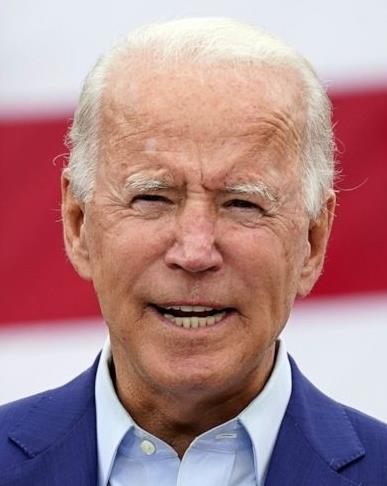 At Biden's inauguration (which Trump did not attend), in his speech
Biden promised to be the president of all the Americans ... not just
those who voted for him. He promised that his administration would be
one of unity. He then proceeded to the White House and
immediately signed 17 new executive orders which made a complete lie of
his promise ... those executive orders putting into operation policies
demanded by the Democratic Left and strongly opposed by the Republican
Right. So much for unity.
At Biden's inauguration (which Trump did not attend), in his speech
Biden promised to be the president of all the Americans ... not just
those who voted for him. He promised that his administration would be
one of unity. He then proceeded to the White House and
immediately signed 17 new executive orders which made a complete lie of
his promise ... those executive orders putting into operation policies
demanded by the Democratic Left and strongly opposed by the Republican
Right. So much for unity.
A huge effort to run up massively government spending (producing an equally massive rise in the national debt) and a cutback on America's traditional energy profile (not progressive enough to suit Biden) ... plus a loss of America's work ethic as workers stayed at home (receiving lavish unemployment payments) soon had the very predictable effect of pushing the American economy into an equally massive inflationary spiral. Products became hard to acquire ... and prices shot up accordingly.
And all this promotion of Critical Race Theory that is supposed to correct rampant White racism (as the Democrats see things) by having school teachers indoctrinate their students with the notion that they should shy away from their parents' obvious racism ... understandably has American parents up in arms over a program that you would expect only of very authoritarian political regimes. But Biden seems to stand strongly with this "Progressive" program.
Also, Americans are very divided over the idea of flooding the country with masses of refugees from Central America, Haiti, and elsewhere ... pouring into the country through the porous borders with Mexico. Democrats claim that allowing this flood is a very humanitarian thing (also likely to increase their Democratic Party vote if these illegals are granted amnesty and citizen rights). Republicans understand the political implications of all this. And Biden himself has made America even more welcoming to these intruders by making it clear how he intends to be most welcoming of their arrival ... even offering economic support for those who make the journey. Clearly, all this is intended to "change" even more deeply the legacy of Middle America. All of this is something designed to make America's new President Biden not very popular with many people. But Biden himself seems to have no answers as to what should be done to correct this huge economic and social disruption and cultural dismantling. Anyway it is clear that he is determined to hold to his ideological course at all costs.
Thus America's social divisions seem to simply deepen with time. Where this will leave the country in the near future is not clear. But things are not looking good. Tragically, there's too much "Fourth Generation" social dynamic shaping America at this point.
A two-fold path that runs through all human life, a path that requires
every person on this planet to choose which direction they are going to
go at life itself, has presented man with a deep challenge ... ever
since the dawn of human history itself. Man is not like the other
creatures on this planet operating largely out of deep biological
instinct. We do have our instincts, of course, But we also have
the awesome power of human Reason.
Reason has been given us by our Creator to allow
us to choose freely which path to take – and to adjust our lives to
that choice accordingly. This requires a rather constant
adjustment because the way life actually presents itself to us, our
particular "Reality" that we face always being contextual.
Successful reasoning depends on our ability to take into account
the time and ever-changing circumstances that we are living in.
There is no fixed universe with fixed solutions for us to follow.
We have to take life step by step as it comes to us.
But it is easy to simply tire of having to
constantly encounter life's ongoing challenges, ones that require a
continuing, sometimes exhausting (but also sometimes exhilarating)
attention. It is understandable that we might want to simply take
ourselves to our desks and design a more "progressive" universe, one
that supposedly will bring all of life's dynamics under full human
mastery. The latter path, of course, is a huge temptation.
But, tragically, it ends up forcing us to live a great lie.
Deciding on this matter as to which direction to
take in life is the most fundamental of the many choices we will ever
have to make in life. Little wonder that the Hebrew narrative
(the Christian Old Testament) begins with the story of how Adam and Eve
so easily chose to leave the path of living in some kind of natural
harmony with life – as God himself designed it – and instead chose to
take up the deceptive path of living with a grand half-truth (the most
dangerous of all lies). As the Deceiver or Šatan
(man's natural "Adversary") put forward matters to Adam and Eve, eating
from the fruit of this tree would seemingly give us full knowledge of
good and evil, thereby making us like God. But actually it would
only make us "like God" in our own eyes ... and thus make us the most
dangerous of all creatures inhabiting this planet.
The "mechanical" approach to life.
Human history is full of examples of "more enlightened"
individuals who believe that they do not need the counsel of some "god"
greater than themselves – because they believe (religiously) that they
have come to understand all the perfect "mechanics" of life. They
supposedly, like Adam and Eve, possess the full powers that come from
having eaten the fruit of the Tree of the Knowledge of Good and Evil.
They have come into the "scientific" knowledge of the absolute
rules or "mechanics" that guide all existence – and thus supposedly
know how to use such mechanics to redesign life ... in order to bring
it to perfection. They have labored greatly to bring all
existence into conformity with a perfect program for life – a "utopia"
(actually a grand "nowhere" ... not a "good place" as in eutopia!).
Based on the half-truth that life works entirely according to
these mechanics, utopian social planners have attempted to bring life
under full human mastery – their own personal mastery of course.
But they are developing a grand lie – because life
does not readily submit itself to such design. And when their
utopian plans begin to show early signs of failure – as they will,
sooner or later – they simply harden up in their determination to make
them work ... at all costs. And thus utopia easily turns itself
into a cruel prison or dangerous war zone.
Time and again we have seen the tragic results of
such social engineering: the French Revolutionaries' efforts to create
the perfect Republic; Wilson's military endeavor to make the world safe
for democracy; Mussolini's, Stalin's and Hitler's efforts to create the
greatest socialist societies in Europe; Johnson's Great Society in
America; Mao's, Pol Pot's, Kim's and now seemingly Xi Jinping's efforts
to create their own socialist utopias in Asia; Carter's more "moral"
universe; Bush Jr's efforts to democratize Afghanistan and Iraq, and
Obama's similar efforts to help bring democracy to the Muslim world of
Egypt, Libya and Syria ... not to mention his efforts to have America's
minorities redesign or "change" American middle-class society according
to their respective minority interests – rather than adapt themselves
to that middle-class society as previous minorities have done (and,
like the Irish and Italians, quite successfully so).
And if such utopian social engineering does
succeed (always temporarily, however), it puts human life under
complete authoritarian control. Such rationally-designed utopias
inevitably convert themselves into societal prisons, ones that the
little people no longer have any say in life and its decisions ...
because they have the "masters" of the utopian bubble making those
decisions for them. Such utopias (Fascism, Communism, Socialism)
dreamed up by social authorities ultimately become oppressive and
dangerous living hells ... especially when "criminal" individuals, out
of sheer frustration, simply start attacking the immediate world around
them. Perfect social orders easily become horrible war zones.
We saw how quickly Johnson's Great Society turned American cities
into communities with rapidly rising crime rates – and then scenes of
massive looting and burning ... and killing.
The mystical approach to life.
Despite the efforts of Secular science – supported by the Federal
courts – to officially outlaw the idea that there is a Higher Power
that presides over all existence, the fact remains that all life is
merely the grand expression of the very will of God himself. The
sheer precision of what science has discovered in its inquiry into the
realms of physics, chemistry, and biology – a precision that has been
in place since the very creation of the universe itself – should dispel
any notion that all of this just happened into existence through
historical accident. Such precise scientific rules undergirding
all existence should necessitate on the part of any honest observer an
appreciation of the reality or "existence" of a Power much greater than
man. Man indeed does exercise great power within creation – a
power to observe and react to existence. But he does not have the
power to bring it into its very existence. Nor does he – as we
have seen repeatedly in this study – have the power to bring it to
perfection. That power belongs to God and God alone. And
when man tries to assume that power for himself, bloody tragedy always
results.
The "mystic" – as opposed to the proverbial
"social engineer" – understands that life is to be accommodated, not
controlled. The mystic understands that like a mighty river, life
is simply a flow of events ... and while we do not have mastery over
those events, we do have mastery over how we respond to those events.
Some manipulation of that flow of reality is possible. But
overall, the most successful approach to life is learning to enter that
flow and simply "experience" life as it comes to us. We can build
our houses, tend our fields or shops, teach our children, and conduct
our celebrations together. But these do not "control" life.
They are creative ways of adapting to its wonderful
possibilities.
In taking up such "adaptation" we are actually
moving along the path that God himself designed for us. We are
actually working in mystical harmony with him ... enjoying even the
special powers that come from such a union with God himself. We
are becoming one with him in "spirit" ... so that his spirit becomes an
integral part of our human empowerment. Christianity understands that
... and always has since this was first taught and exemplified by Jesus
Christ himself.
I have summed these two paths as 1) the path of
"mysticism" or compassion, or just loving interface with the world (and
the very present author and director of that world, God himself) – and
2) the other path of "materialism" or domination, in which we attempt
to gain control over a mechanically-operating world, one that
supposedly works impersonally according to an array of precise rules,
ones that we can then manipulate in order to bring the world under our
domination.
The chart below is a quick summary of the key differences between those two paths:
|
|
|
| Other labels | Christianity - in particular the variety that strives to be more than a mere nominal version of Christianity and instead truly to follow Christ | Secularism ...
or its subcategories,
Humanism ("man is naturally good") Darwinism ("man is naturally a dominator") |
| Vision of life | ... life as a network of vital inter- personal relationships encouraged and supported by a loving God | .. life as a perfect mechanical order of material things (including humans) functioning precisely according to natural design |
| The reach of life | ... as far or high as human thought / dreams / imagination can go | ... the visible world of material things |
| Life’s goal | ... harmonization with life ... through love and the quest for partnership with both God and fellow man | ... dominance over life ... through the mechanical control of both man and his material environment |
| Path to the goal | ... mystic union with the Supreme Source (God) of all life, which offers man the power to embrace life fully, even in the face of hardship and opposition | ... scientific and technological know- ledge, which ideally offers man (as his own God!) the power to control life and even eliminate hardship and opposition |
| Society | ... a cooperative community (demo- cracy of equals) founded on well understood or "traditional" values shared widely by all | a chain-of-command system (status hierarchy) operating according to the utopian or "progressive" plans and programs of a ruling elite |
| Leader | a prophet or teacher; a person who teaches and inspires right behavior in others | a governor or manager; a person who commands and enforces right behavior in others |
| U.S. examples | Rev. Dr. Martin Luther King, Jr., who appealed to Americans to do what they well knew was "the right thing" – to get past our prejudices and open up our middle class democracy to all alike, regardless of skin color | President Lyndon Johnson, who created a new "Great Society" program directed by Washington experts, not trusting Americans – especially fellow Southerners – to do "the right thing" on their own |
| "Extreme" examples | Jesus Christ, whose teachings and example led the way to a sense of compassionate unity with God and fellow man | Josef Stalin, whose brutal dictatorship imposed socialist industrialism on Russia ... executing and starving millions of Russians in the process |
| Personal goal | to find ways to fit in; to find ways to contribute to the life of the community ("keeping up with the Joneses") | to find ways to achieve elite status; to find ways to climb to the top of the social order ("getting ahead of the Joneses") |
| Preparing for success | Studying,
learning in order to gain the
knowledge vital to being the best possible contributor to the well-being
of the world |
Studying, learning in order to qualify for entrance into the elite institutions (such as colleges and professions) that lead to power, fame and wealth |
| Social reward | the joy of belonging | the joy of owning, directing, control- ling, dominating |
| Greatest fear | isolation | losing possession or control |
Society is simply an idea.
Societies don't actually exist outside of the world of human
perception. Since the rise of the age of nationalism in the
1800s, we have been able to place on world maps a huge variety of
nations. But ultimately it is not their physical borders or even
their placement on the map that define them – although certainly those
two factors do contribute to the forces that define a society.
But ultimately what defines a society is the very idea of that
society itself, an idea held in the hearts and minds of its people –
about who they are and what they stand for.
Most fundamental of all ideas held in the
understanding of a group of people is the worldview shared by that
people, their most essential beliefs about the world and how it works –
and their society's place in that dynamic. In short, the most
powerful of all social ideas is its basic religion – that is, what a
people believe to be true about life and their role in that life.
This is the one factor that has the greatest power to define a
people.
And being so powerful, it is the one social item
that is fought over most. People's ideas about life can vary
widely, even find those ideas in conflict with the ideas held by their
neighbors, fellow members of their own society. And those
conflicts can become quite bitter. It is this single factor that
gives us the world of political variety, of economic rivalry, of
religious debate. It can also give us war – both civil and
international.
In any case, America has long prided itself in the
fact that it is the people themselves – and not just some self-chosen
"enlightened ones" – who get to determine exactly what that worldview,
that religion, the very thing that defines them (and their offspring),
happens to be. But of late, judicial "experts" have taken much of
that responsibility away from the American people, their families, the
local communities that these families support directly, and placed that
all-powerful responsibility in their own hands – hands of a small group
of lawyers in black robes that assume that they know better than the
people themselves what is good for that people. This is a very
dangerous development for a free people – and in total violation of the
First Amendment.
Social dynamics. Societies come
in all shapes and sizes. The family is the most fundamental or
foundational of all societies. It is the most intimate, the most
determinative of how (even whether or not) people will find effective
and successful placement in the larger social world. It is also
most powerful in shaping the social effectiveness of the rising
generation, of its children.
And there are also other very strong local
loyalties that define this social world: schools, religious
communities, social clubs, sports teams, local businesses, the town or
local community itself, etc. And at one point in American history
the identity as Virginian, Georgian, Vermonter, Pennsylvanian, New
Yorker, etc. – that is, the "state" around which the American federal
union was first built – was a powerful social definer.
Today these states are viewed simply as
administrative subsets to a very complex social organization ultimately
centering on the national capital at Washington, D.C. This seat
of the American "nation" holds enormous power in defining who and what
the Americans will be, what they will believe to be true about life,
and what they ultimately intend to do in life. That's a lot of
dominating social power – and a fairly new arrival in America's
four-century history.
Here's where social leadership becomes so very
important to a society. A great leader has the ability to
integrate all those varieties, to build a broader social order around
loftier ideas that produce a true spirit of social unity, of mutual
compassion among a people – even as varied at they may be socially at
more local levels.
But not all people who find their way to
leadership take that path. Many will build up their power by
identifying and villainizing some group "out there" that wants to harm
or destroy the inner circle that this rising leader claims to best
represent. And certainly having a common enemy is well-known to
bring a people together in strong unity.
But that is a weak foundation on which to build a
social union – for it depends entirely on the existence of that outside
threat to offer sufficient cause to produce social unity. If a
people cannot find among themselves some greater cause for unity
somewhere along the way, then when the enemy disappears (defeated in
war or just finally revealed to be a fraud as a threat) the society
that the leader has assembled will simply collapse into confusion – and
possibly even into civil war.
Franklin Roosevelt truly believed that the
wonderful cooperation he had experienced with Stalin would continue
right on into the age of the United Nations, even after Hitler had been
destroyed. But indeed, with the destruction of Hitler's Reich,
the dynamic upholding the American alliance with Stalin's Russia merely
collapsed. In fact, the two powers quickly became bitter rivals.
There was no larger, more global, interest on the part of Stalin
to see things the way Americans did, and to act accordingly.
And Wilson before him never figured that out
either. He had believed that by allying America militarily with
"democratic" Britain and France in the "Great War," this would most
certainly result in destroying the autocracies of the world – Germany,
Austria and Turkey (the Russian autocracy having just collapsed of its
own accord) – and bring the world itself to full democracy ... and thus
also some kind of perpetual global peace. But instead, all that
resulted from this alliance was the assistance America gave Britain and
France in their dedication to crush their European enemies – and build
up their empires in the Middle East. This not only disappointed
Wilson deeply, but angered the American people, who felt that they had
been betrayed by both their president and their "democratic" European
allies.
Compassion – not dominance – as the key to power.
Compassion such as what Christ taught and exemplified – and what
Puritan America attempted to build a middle-class Christian society on
– has proven to be a much more durable way to lay out the foundations
for a strong society. And those early Puritan leaders, Winthrop
as a notable example, led their social world to stability and
prosperity on the basis of such sincere compassion. True, they
had their detractors, individuals with very ambitious egos. But
even there they handled the dynamics quite graciously, especially given
the level of danger such egotistical attacks posed to the community.
Truman exemplified that same spirit of compassion
when instead of beating up defeated Germany and Japan, he moved to
rebuild them – around the loftier (Christian) social ideals that
America itself at the time sought to represent to the larger world.
And this brought lasting success to both Germany and Japan – as
well as much of the rest of war-torn Europe, at least in the West where
Stalin had no power to block such American charity.
Other American presidents chose to go down the
road of compassion rather than dominance – not always perfectly, but in
general taking up that path. We see that notably in the cases of
Reagan, Bush Sr. and Clinton, who in the 1980s and 1990s helped bring
America out of the state of perpetual conflict it seemed to find itself
in since the mid-1960s.
Bush Jr. did not divide America internally as much
as he helped deepen the social divisions in the larger world with his
democratic crusading in Iraq and Afghanistan. In this, his
program was definitely one of dominance rather than compassionate
understanding of the dynamics and cultural instincts by which the
people of that part of the world understood life to operate.
And Obama largely continued down that same path of
dominance in his attempt to bring down Middle America – rather than
help direct Blacks and others into that world. And thus he left
the presidency with the country deeply divided internally – both sides
blaming the other for the horrible social division that at that point
tore at the country. Compassion, not political dominance, would
have left the country in much better shape.
And Trump simply chose to take up the cause of the
other side of this deep division, posing as the champion of Middle
America. But Trump's world also sought no path of compassion in
dealing with the other half of society – only a path of biting
adversity. So America's tragic social division has simply
remained in place, even deepened in the process.
Moving ahead under God's Covenant.
And there is where America finds itself today, deeply divided
into very antagonistic social subdivisions – at a time that a
distracted America seems to have little to say or do about what is
happening abroad with domineering China, ambitious Russia, the very
hostile world of militant Islam, chaotic Central America, and a
distancing Europe.
America needs God's help. There seems to be
no human program, no leading personality, able to put American unity
back in place. Only God in Jesus Christ can heal the wounds of a
deeply divided society.
True, there is a long-standing Covenant somewhere
out there, a Covenant with God that America has enjoyed over many
generations. But even Winthrop warned what might happen to the
society he was putting in place if it wandered too far from that
Covenant – and tried to do things on its own, trying to be its own god.
Grand social failure, such as we are seeing today, would come
upon the nation.
Hopefully it is not too late to bring that
Covenant back into full play in the life of this beautiful country.
Hopefully God will once again intervene and bring to America a
new spiritual Awakening. So many of us are praying for just that
to come to our beloved country. So we not only call on God to
come to our aid. We call on our fellow Americans to wake up ...
and get about the Father's business. Let us all pray that God
comes quickly to our rescue, before the social chaos simply gets worse.
May our Lord come! Maranatha!!!
Excerpts from Volume 2
Truman’s Own Christian Faith (excerpt from pages 90-92).
For Christian Americans, it was truly miraculous that God put in their
midst a man who was one of them, a battle-tested soldier, someone who
had tried and failed and then tried again to move himself forward in
life the "American way," who was a man of great moral integrity in the
way he handled power–and yet who frequently used profanity and enjoyed
playing poker and drinking whiskey (major no-noes to certain
Christians), just like one of the boys!
Truman was not looking for social approval–or at
least not expecting it. He found that in his wife and family–and
he found it in God. He was a man of deep personal faith.
A loyal Baptist, Truman as president however was
not regular in his Sunday worship, explaining the matter as a result of
finding himself in a job that kept him at work seven days a week,
morning, noon, and night. Also, Truman was not at all like his
presidential successor Eisenhower, who understood the importance of
frequently just getting away from those same pressures, golfing or just
relaxing at a retreat (Eisenhower suffered a heart attack anyway).
Truman was something of a workaholic!
But he had a hugely uncharted course to lead the
nation on. And the European crises that exploded in the early
post-war years moved so fast that it seemed at times that only Truman
had the ability to respond to them quickly and effectively. His
wisdom in shaping an America ready to take on a new form of Cold War
was enormous. And he rested that wisdom on a very prayerful,
deeply scripturally-based Christian faith.
But he also understood the importance of
connecting the Christian faith with the American self-understanding of
the nation’s place in history. Several times he called for a
National Day of Prayer, specifically urging the nation to call on God
to help the people know what to do in the face of various challenges,
even crises, facing the nation. He also spoke openly before the
American public about how the Christian faith had formed the democratic
foundations of America and how America enjoyed its obvious blessings
because of a special trust God had put in place with the nation.
And Truman looked to the church (not Washington) to take the lead
in the battle against greed, racism, and injustice, both at home and
abroad.
And perhaps most importantly for a national leader
whose most important task was to put a clear social vision in front of
the people he was destined to lead, Truman had a very strong personal
belief that America was called to show the world how to live God’s way,
according to the very teachings of Scripture, and the example of
Christ: in charity and concern for others, even for one’s former
enemy (in this case Germany and Japan). He truly believed that if
the world would simply live by Jesus’s Sermon on the Mount (Matthew
chapters 7, 8 and 9) peace would prevail across the world.
This did not mean that the strongly opinionated
Truman did not find himself in opposition to aspects of the way the
Christian life was lived in America. More sophisticated
Christians, for instance, attacked him for his biblical simplicity,
seeing only foolish ignorance in Truman's hope that living according to
Biblical principles would bring the world a better peace. He also
had a terrible split with his long-time Baptist pastor Edward Pruden,
when Truman appointed General Mark Clark as his personal representative
to the Vatican. While this pleased America’s twenty-five million
Catholics immensely, it upset greatly many Protestant conservatives who were deeply suspicious of any Catholic pro-Vatican popery.
The Peace Corps (excerpt from page 149)
Kennedy had been in office only a little over a month when on March
1st, in pursuit of the ideals declared in his inaugural address, he
issued an Executive Order calling for the creation of a new program
(actually thought up by Senator Hubert Humphrey) challenging America,
in particular its youth, to help spread the understanding of “The
American Way” around the world, by volunteering as members of a new
Peace Corps. University-educated Peace Corps volunteers were to
take their places in the ranks as patriotic Cold Warriors, not as
soldiers, but as cultural missionaries sent out to show villagers the
world around what America was like up close, to go and live among the
people of the Third World, showing them personally how American ideals
worked to make for a better life.
This would not become a massive, expensive
government program. No huge Washington bureaucracy would provide
the muscle for this program. Instead it would rest on the support
of the thousands of young volunteers who answered the call (they did
receive the equivalent of army basic pay, which indeed was truly
“basic.”)
It was typical of the way that Americans felt at
that time that the nation should go about its business, challenging the
average American to do the right thing, to volunteer to take up the
national cause, just as the nation should inspire (not dictate to) the
world to do the right thing. The Washington government’s job was
simply to organize the opportunities for Americans to do the right
thing, nothing more.
Washington itself wasn’t expected (not yet, anyway) to do the right thing for the people.
The Basic Principles of Political Realism or Realpolitik (excerpt from pages 214-217).
Political Realism would have had no difficulty in finding acceptance
from either the Founding Puritan Fathers or the Founding Fathers of the
American Republic, for it is a political philosophy that arises from
the basic premise that man instinctively engages the world around him
most powerfully on the basis of what he understands "logically" as his
own self-interest ... the source of what Christians identify as
"original sin."
Political Realism is aware that man is a moral
animal, in the sense that he feels compelled to justify his actions on
the basis of some moral logic or moralizing of his own. But even
this moralizing is simply another aspect of his pursuit of
self-interest. Morality is simply the way a person logically
justifies his pursuit of self-interest, to others – even to himself.
For instance, a Realist realizes that moralizing
is simply a verbal cover the individual offers up in the hope of
presenting a compelling reason for others to yield to that individual's
set of interests (such as a lawyer before a jury, or a six-year old
before a scolding parent). It may actually include a lot of lying
or slick deception in the hope that such deceptive moralizing will
shape more advantageously the behavior of others.
A Realist, in attempting to deal with others,
however, must first be clear in his own mind about what, in any given
situation, his self-interests truly are. He must be very careful
not to confuse his own moralizing with his true self-interest, which is
fairly easy to do, and which in fact is often done in history, usually
with disastrous results (say for instance when Hitler himself truly
began to believe the lie he put over on the rest of the German nation
that he was a diplomatic and military genius).
It is also very important that the Realist try to
understand the actual self-interest behind the moralizing of the others
around him. He should study life’s challenges from their
perspective, to try to understand how it is that others see things, and
thus how they are likely to act in any particular situation on the
basis of what they think they see. A Realist should also pay
close attention to the moral arguments he hears from others, not to sit
in judgment as to whether they are objectively right or wrong but
because they give him a better insight into how others perceive their
own self-interest. This is an important contributor to the
Realist’s ability to understand and anticipate the behavior of others,
and to his ability to respond to the logic that others will use to give
moral cover to their behavior.
The Realist also understands that self-interest is
shaped tremendously by power. Power is the amount of ability a
person has to actually pursue his sense of self-interest. The
more power a person has, the more a person’s sense of self-interest
will expand. Little power enables only the most-humble pursuit of
self-interest. Great power enables a wide ranging, domineering
pursuit of self-interest.
But of course, power is a rather limited factor.
No one, no nation, has total power. Everyone, every nation,
has some power, and needs to know exactly how much that actually is.
Power in a social context is not a particular
material quality, but is simply how strengths in oneself and in others
are perceived. Power is highly symbolic in nature.
Certainly there are material attributes that shape that
perception: guns, bombs, size of armies, size of the industrial
infrastructure, size and training of the population itself. But
of equal and usually even of greater importance are such intangibles as
a reputation for power, wisdom (or lack thereof), a sense of optimism
(or conversely, pessimism), and simply bravery or an inner strength
willing to take on risks. This latter element of power, bravery,
is where a deep faith in or sense of higher connection with the One who
controls all life becomes absolutely essential (although this idea does
not play as central a role in classic Realism as it should, though most
Realists do recognize the connection).
Modern Political Realism is ultimately about
nations, their interests (the "national interest") and their power.
A nation must have a very keen sense of its own national
interest, as well as the national interest of the other nations playing
at the “game board” of world diplomacy. A nation must also be
very aware of the size and nature its own power, material and symbolic,
as well as the power of others. In short, it (or at least its
leaders) must know how to size up both itself and others.
Before a nation ventures into a new move on the
game board it should do a very thorough cost-benefit analysis of the
situation. How important is this particular move? What are
the gains or benefits that will probably come from this move? How
much is it going to cost the nation to make this move? How much
of its limited resource of power is it going to take to put national
muscle behind this move?
Failure to get this analysis right (or worse,
failure to undertake this cost-benefit analysis altogether, which sadly
is often what happens, especially to Idealistic America) can bring
disaster, even total ruin to a nation. For instance, nations that
exhaust themselves in a war that brings no offsetting gain have simply
squandered needlessly, even foolishly, even tragically, their power.
In doing this they have left themselves vulnerable to the
aggressions of a nation of growing power that is willing to test the
weakened nation to see how badly that nation got depleted by its
political folly. Political nature will simply take out that
nation that has self-inflicted wounds wrought through folly.
A wise nation moves cautiously in the
international diplomatic/ military game. It attempts to join
forces with other nations who are pursuing similar national interests
in order to combine forces and not drastically expend its own power.
Sometimes it has to ally with others simply because it does not
have enough power to take on a challenge by itself. This is how
Roosevelt’s America and Churchill’s Britain found themselves in
alliance with Stalin’s Communist Russia during World War Two
(1939-1945). Germany was so powerful that it necessitated this
alliance to bring Germany to defeat. They allied not because they
shared similar moral codes and political cultures (although of course
Britain and America certainly did). It was simply that as long as
Germany was running loose across Europe, they all shared a common
national interest of defeating Germany. Period. But once
Germany was defeated, that alliance broke down (the Cold War took its
place), because principally America (with Britain in support) no longer
shared a common interest with Russia. In fact at that point their
national interests were in something of a natural conflict over Europe,
and then soon over the entire world, as they were bound to be (as both
Truman and Churchill were quick to understand after the war’s end in
1945).
As odd as this may sound, self-interest can lead to
some of the most charitable acts in the world of diplomacy and
international relations. For instance, after World War Two,
Truman and his America expected Europe to simply put itself back
together after the shooting stopped. But within two years the
Europeans had exhausted what was left of their social assets in the
effort to rebuild. Politically as well as economically they were
bankrupt. Stalin saw great advantage to his Soviet Union in this
situation and called on his Communist allies in the West to thoroughly
disrupt what was left of the social order in the West – to give him,
through his Stalinist agents, full control of Western society.
Truman (and his Secretary of State George Marshall) immediately
understood the danger this put not only Europe but also America in and
moved to offer Europeans full economic assistance in rebuilding their
societies. The offer was extended even to the Russians if they
had wanted it – which of course would have been totally contrary to
Stalin's Soviet self-interest, and therefore was refused in the East.
But the "Marshall Plan" did the trick, settling things down both
economically and politically in Western Europe. But it also gave
America the task of using its factories and farms (and thus jobs for
Americans as well) to supply much of Europe's needs for rebuilding.
And both societies prospered enormously in the process!
That was true charity – formulated out of a strong sense of
political self-interest on the part of everyone (except Stalin)!
That's also political Realism in action – in the very best of ways!
Edwards v. Aguillard (1987) (excerpt from pages 306-307).
Indeed, the anti-Christian crusade of Secular America would only
intensify in the years ahead, with the American Federal Courts
continuing to serve as the key battlefields in which Liberal or
"Progressive" attitudes could be more easily advanced against America’s
traditional Christian cultural foundations.
In 1987 the Supreme Court ruled 7 to 2 in the Edwards v. Aguillard
case that a Louisiana law, which required that the theory of
creationism be taught in the public schools alongside the theory of
Darwinism, was unconstitutional because it was in total violation of
the Lemon test requiring a purely Secular purpose to such acts of the
State governments. The Court declared that creationism intended
to advance a certain religious belief, that God exists as founder and
presider over all existence, and thus failed to meet the standards of
the Lemon Test which decreed that the government could prescribe an
educational program only if it had a legitimate Secular purpose, that
is, the belief that life operates solely on the basis of purely
mechanical laws that brought forward all existence through a process of
slow, competitive evolution. Any other approach in public
education was in violation of the Constitution! (Just whose
Constitution were they referring to?)
A large group of Secular scientists had been
invited to file briefs with the court in which they pointed out that
creationism was not a co-equal science, in fact was not science at all
but simply a religious doctrine derived from the opening chapters of
the Book of Genesis in the Judeo-Christian Bible. On the other
hand, during the hearings there had been no serious opportunity given
for scholars of an opposing viewpoint to present their views.
Thus the outcome was fairly well predetermined by the way the
hearings were shaped by the justices themselves.
Thus the Court decision pretty much settled the
argument that had been raging since the early part of the century
between the traditional Christian worldview and the Darwinist
worldview. The clear policy now was that any idea that creation
was the work of a Creator, because it originated not from the American
scientific community but from the American religious community, could
not be taught in America’s public schools. To do so would be to
promote religion, not just a particular religion, but religion in
general, which according to the Lemon Test was totally
unconstitutional.
The Edwards v. Aguillard case made that very clear: the First Amendment was to be read not as the freedom of religion but as the freedom from religion.
Anything that served to advance the cause of religion was
forbidden in America’s public schools, and by potential inference for
the possible future, also anywhere else in America’s public life as
well.
The fears arising in the 1960s, ones that prompted
the Becker and Dirksen amendments' failed attempts to offer protection
from religious censure by the Federal courts, had just proved
themselves to have been well justified. The opposition to those
amendments put forward at that time by prominent mainline church
leaders, who claimed that such religious prohibition was an event not
likely ever to happen in America, just proved itself to have been
totally unprophetic. By the 1987 decree of the Supreme Court,
public America had officially become non-theistic (atheistic).
And there was nothing that could be done about it, as there was
(and still is) no political recourse the American
public could take against a decision of the Supreme Court. Their
rulings were the ultimate Law of the Land.
9/11 – And the Search for Osama Bin Laden (excerpt from pages 348-354)
Going after al-Qaeda. Since 1993, the CIA had been watching al-Qaeda training camps in Afghanistan and had developed a plan to go after the leadership of this enemy organization. Ironically, this plan was more or less finalized just prior to 9/11, but not in time to put the Cabinet on alert to the dangers posed directly to the country by the activities of al-Qaeda. Certainly however, the CIA recognized immediately the al-Qaeda character of the attacks when they occurred on that fateful day of 9/11.
The world stood in sympathy with the United States. And quickly a large international coalition (from 42 different countries, most of them from NATO, and within NATO, mostly the British) indicated a readiness to join with the Americans in conducting an anti-terrorist drive into Afghanistan to destroy the terrorists and their camps.
On September 20th, Bush went before a joint session of Congress to announce to the Taliban authorities governing Afghanistan that they must surrender up the al-Qaeda operatives or America (and much of the world) would do the job on its own. But the Taliban refused to cooperate.
The “Bush Doctrine.” With this (expected) refusal of the Taliban, the narrowly-defined surgical operation of taking out bin Laden and the al-Qaeda organization took on a broader goal: to knock out the Afghan Taliban as well, or any other regime giving sanctuary or aiding in any way to such terrorists. According to what would eventually be termed the “Bush Doctrine,” going after the perpetrators of the 9/11 hit was now expanded to liberating all of Afghanistan from the tyranny of all Muslim fanatics, including the Taliban, who had tried to pull the country back into the Middle Ages.
This of course would make the venture something more than just an exercise in enacting justice on the criminal perpetrators of the 9/11 tragedy. The Bush Doctrine would draw America into the much, much larger challenge of nation-building (at first just Afghanistan), the very thing of which Bush had been so critical of the Clinton Administration. And Afghanistan, as wildly diverse and as hostile as the various groups making up the country happened to be, would make nation-building a virtually impossible task – as every government working out of Kabul had long known the matter to be. Afghanistan was not a nation, had never been a nation, and would never become a nation any time soon.
The move to reconstruct Afghanistan. However, almost without giving it a second thought, Bush began immediately to set the larger American goal in Afghanistan as bringing national democracy to the country. Presumably this loftier, more Idealistic goal would ennoble the American efforts in Afghanistan. What he seemed not to realize was that this would also open up much larger questions concerning not only American relations with Afghanistan and the surrounding nations, but also the entire Muslim world. It would hit the country with huge diplomatic questions that would trouble the rest of Bush’s presidency.
CIA chief Tenet was ready to go immediately (presuming the operation to be merely taking out bin Laden and his associates). The CIA began to pay off local Afghan supporters to help them locate bin Laden so that CIA operatives could do their job. But as the operation began to expand its reach from taking out the criminal perpetrators of 9/11, to taking out all of the many al-Qaeda training camps around the country, to taking out the entire Taliban government, Tenet realized that the CIA needed the U.S. military’s help in carrying out its responsibilities.
Rumsfeld's Defense Department takes over the task. When asked to support the CIA, Secretary of Defense Rumsfeld balked, refusing such support unless Tenet and the CIA operations were put under Rumsfeld’s Department of Defense (DOD). Furthermore, the taking down of bin Laden and al-Qaeda would have to wait until the Taliban had been defeated through the DOD’s military operations. Tenet was forced to yield, part of the frequent tension that would characterize relationships within the Bush cabinet.
But the DOD had no immediate plans for an Afghan operation. That would take time to develop. And the military would not move until they were fully ready. Also any such plans required a lot of diplomatic preparation, especially in getting things organized so that America’s military operations were coordinated with the local Afghan troops of the Northern Alliance. This larger operation took time to get itself ready for action.
Eventually (October 7th, almost a month later) America was finally ready to go. There was a huge American and British attack from the air on al-Qaeda training sites and Taliban strongholds, while at the same time the Northern Alliance provided ground troops (also assisted by U.S. special forces, mostly as liaison personnel coordinating ground and air action), which invaded south into Taliban territory.
But the Northern Alliance would not be led by the highly respected Massoud, for he had been assassinated in a well-planned operation just two days before 9/11. This had caught the attention of CIA analysts who had been watching Afghanistan and who sensed that something big was about to happen when Massoud was assassinated. But they were not able to get their concerns passed on quickly enough to put the nation’s leaders on alert. Even then there was probably no way anyone could have expected that these events in distant Afghanistan pointed to what happened two days later on 9/11 – just as Americans in 1941 were on to the fact that the Japanese were planning something big, though it never occurred to them that it would be an attack all the way across the Pacific to Pearl Harbor. [Americans should never underestimate the abilities of their enemies to reach deeply into their national existence to try to break them.]
Nonetheless, the Northern Alliance managed to hold together despite the loss of its leader. And with the help of American and NATO air power, they were able to begin driving back the Taliban. On November the 9th, they captured Mazar-i-Sharif, with its key airport in the north of the country, enabling them to fly in not only military supplies but also food for a desperately hungry Afghanistan. Three days later they took the capital Kabul after the Taliban fled ahead of advancing Northern Alliance forces.
With the fall of Kabul, celebrations broke out in Washington and across America. Laura Bush, the Presidents’ wife, delivered an address to the nation describing how the Taliban was in fast retreat and how the Afghans were rejoicing, especially the Afghan women. “The fight against terrorism is also a fight for the rights and dignity of women.” So it was clear. What America was involved in was in fact the much larger goal of ridding the world of terrorism and bringing new rights and dignity to the people of the world.
Many of the Taliban and al-Qaeda fighters retreated into the mountains and caves of Tora Bora, which Americans bombed heavily on the 16th of November. Finally, CIA operatives and Army Special Forces moved into the area. But they had hardly enough troops to cover this huge area sufficiently. Many Taliban and al-Qaeda fighters (including presumably bin Laden and his colleague al-Zawahiri) escaped across the border into Pakistan. Other Taliban retreated south to dig in around their political center, Kandahar, where they were joined by more Taliban pouring in from Pakistan to join the Taliban defense of the Pashtun south.
The clash of East-West cultures. Once
again American Idealism and the hard realities of a complex world would
clash violently. Just the case of “freeing” the women in
fundamentalist Afghanistan provides a vivid example of the
complexities. Certainly equal education and equal professional
opportunities for women are well-acknowledged rights of every woman in
Western culture. But in traditional Muslim culture such personal
rights do not exist. In fact the whole Western idea of personal
rights itself is not the point of Islamic culture, which instead
teaches submission as the primary directive in life. Everything,
from children up through families, through local clans and tribes,
through anointed rulers, to Allah himself, is a construction of correct
submission. To talk of personal rights throws the whole sense of
Islamic order into confusion. In fact it is one of the major
points in the hostility of traditional Muslims against the invasion of
their culture by Western values. When Muslims hear of Westerners
crusading in their lands to bring individual rights, this touches the
nerves of devout Muslims, not just in Afghanistan but also in other
parts of the Muslim world. And in many cases, it merely makes
them all the more deliberate in their sense of opposition to the
Westernizing of their culture.
To be sure, there are many, very many, in the
Muslim world who find these Western values attractive. These are
the people that Westerners are most likely to deal with in their
contacts with the world of Islam. It is thus easy to get the
impression on the basis of this personal sampling that pro-Western
attitudes are much more prevalent in the Middle East than they actually
are.
It is thus also hard, very hard, for Americans to
understand how Muslims who have lived among us in America (as most of
the 9/11 perpetrators had) could hate us as they do. Do they not
see the good in what we stand for? The answer is obviously “no.”
Contact with our culture has made them all the more committed to
the idea that the evil ways of our culture must be destroyed – just as
we Americans believe that the evil ways of their culture must be
destroyed.
Thus it was that in Afghanistan, America became
drawn into a much larger challenge, one that had been brewing for a
while and was about to become monumental in size. The war on
terrorism in Afghanistan was quickly to become a war of global
cultures.
The attempt to "democratize" Afghanistan.
In December a select group of Afghans met in Bonn, Germany, under
U.N. sponsorship to put together an Agreement providing for a
provisional authority and a constitution drafting committee.
Hamid Karzai, of a well-respected Pashtun political and
diplomatic family background, and backed personally by America, was
selected to serve a 6-month term as chairman of a Transitional
Administration. The Bonn Agreement also called for the convening
of a loya jirga (grand council) which by Afghan tradition was
required to select any Afghan leader. A loya jirga of June 2002
in Kabul reappointed Karzai as head (this time as its president) of the
Transitional Administration for a term of two years. The title
was mostly honorific since there was little direct government outside
of the capital itself but only loose arrangements or alliances with the
many Afghan warlords who were in fact the real leaders here and there
around Afghanistan. But Karzai did an excellent job of keeping
this rather traditional Afghan political system functioning fairly
effectively (that had been the pattern by which the Afghan Shah had
once “governed” the country).
There seemed little more that could be done
against bin Laden, who had obviously slipped into Pakistan – where the
Pakistani government refused to allow American or NATO troops into
their country in pursuit of al-Qaeda. Pakistan allowed supplies
for American and NATO troops to pass through its territory on its way
to Afghanistan. But the Pakistanis were unbending in their
refusal to allow U.S. troops on Pakistani soil. In fact, it
seemed that at times elements of the Pakistani government, military,
and intelligence agency (ISI) were still actively supporting the
Taliban. There seemed to be no way to get either bin Laden or the
remainder of al-Qaeda as long as Americans could not enter Pakistan –
and as long as Pakistan played a confusing game of conflicting
political and diplomatic loyalties.
In 2004 there were actually national elections
held in Afghanistan, at least in the parts of the country not still
under Taliban control. And Karzai was decisively elected over his
22 opponents, with victories in 21 of the 34 provinces. What
America and the West understood as “democracy” had finally come to
Afghanistan ... or so it appeared anyway.
But by this point, Bush had shifted his priority
from Afghanistan to a matter of greater interest to the president:
Iraq. For reasons known only to Bush, he had by this time taken
on the goal of ridding the world of Iraq’s dictator, Saddam Hussein –
and bringing Iraq to “democracy” as his primary foreign policy goal.
He would pour the bulk of America’s military assets into this new
anti-Saddam campaign. This left the situation in Afghanistan now
very problematic.
Thus with the shifting of the diplomatic focus
west toward Iraq, the Taliban were clearly able to make a political
comeback in Afghanistan – by 2006 able to once again take over villages
that they had been chased from, terrorizing the local population back
into submission.
At this point there just were not enough American and NATO soldiers in Afghanistan to protect the local population from a Taliban return. America and its allies would send out military missions to retake villages from the Taliban. Then after a short while these Western troops would have to withdraw because they were needed elsewhere. And then the Taliban would return – and execute any who had helped the Westerners. After a while the Afghans simply asked the Americans not to “help” them. This was Vietnam all over again – although even less likely to find any success as things now stood.
Recent wars have been whole peoples against other peoples, cultures against cultures, popular worldviews violently contending with other worldviews. Such struggles have been characterized not by the matching of uniformed armies against uniformed armies, but by the participation in one form or another of whole populations, men women and children, in the violence of war. Vietnam was a clear example of this problem – where American troops became easily visible targets at the same time that Americans were never sure who were the proper targets among the Vietnamese. Friendly smiles could turn into murderous design once the backs of American soldiers were turned. To be sure there were Vietnamese supporters of the American presence. But how could Americans tell the difference between sincere and faked friendliness? Mistakes were made – huge mistakes at times – especially when the frustration level of American troops turned explosive.
The American Department of Defense or Pentagon never really worked out a solution to this problem. Consequently, the problems in Afghanistan were presenting themselves in the same format as the Vietnam war. If the Taliban presented themselves in some kind of battle array, they were as good as dead in American gun sights. But when they instead moved in and out of the local population (terrorizing the locals to make sure that no locals identified these Taliban to the Western troops) it was very difficult to hit them militarily.
